

8 Great Online Sources to Research a Fantasy Novel
I have a Bachelor of Arts in History and Creative Writing. That BA in History taught me a lot about doing research and how to pick good sources. I’ve always had a love of research, from the time I was the kid who couldn’t get her hands on enough books about horses, dinosaurs, and whales, through high school, when my term papers ran a lot longer than they were required to, and all the way to the present.
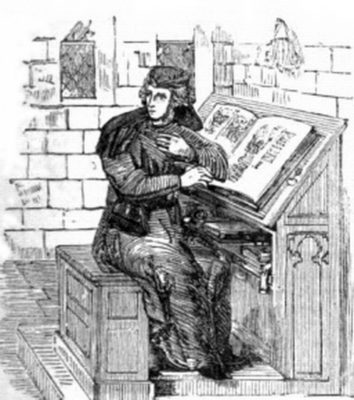
By John Cassell (Internet Archive) [Public domain], via Wikimedia Commons
I’ll give Wikipedia a cursory mention, because as much as people whomp on it as a reliable source, the fact is, it’s a great place to get a general overview and orient yourself to a subject. Don’t take Wikipedia at face value, but don’t shun it, either. A lot of articles have links to great sources off Wikipedia, as well, so it’s a good jumping-off point for research on a specific topic.
1. Medievalists.net
Your first stop should be Medievalists.net . There simply isn’t a better online source that’s friendly to hobby medievalists and writers. Peter and Sandra, who run the website, met in a university medieval studies program. They send out The Weekly Medievalverse, an email newsletter, and also publish The Medieval Magazine , a weekly digital magazine.
2. De Re Militari
De Re Militari bills itself as “your portal to scholarly information on warfare in the Middle Ages” and it does a great job in that role. If you’re writing a fantasy novel that includes a war (and how many of them don’t, honestly?), you should definitely check out this website. They curate articles, dissertations, book reviews, primary sources, and publish The Journal of Medieval Military History, an annual publication. De Re Militari is almost certainly the most comprehensive website dealing with medieval warfare.
3. The Internet Medieval Sourcebook
The Internet Medieval Sourcebook is maintained by the Center for Medieval Studies at Fordham University. Primary sources hosted there span a wide variety of topics, including Church councils, late antiquity, Byzantium, Islam, literary texts in various languages, medieval thought, medieval spiritual writing, and governmental, administrative, and legal documents. There’s a large section dealing with sex and gender in the medieval world, as well.
Incidentally, Fordham University’s Internet History Sourcebooks Project has a huge number of topics that it covers besides medieval history. Their menu options include Ancient History Sourcebook, Medieval Sourcebook, Modern History Sourcebook, Byzantine Studies Page, African History Sourcebook, East Asian History Sourcebook, Global History Sourcebook, Indian History Sourcebook, Islamic History Sourcebook, Jewish History Sourcebook, Lesbian and Gay History Sourcebook, Science History Sourcebook, and Women’s History Sourcebook. I could lose days exploring their website and the sources linked.
4. Magical World Builder
While Magical World Builder isn’t technically a research site, I’m listing it here because it’s an amazingly comprehensive guide to world-building. There’s another great list of world-building questions written by Patricia C. Wrede . Whichever list you use, you’ll have a document to guide your research in terms of what you should be researching and how to think about what you’re researching.
5. Mostly Medieval
Mostly Medieval is a great website if you want to find details that will give your fantasy authenticity. Even if you’re not writing a fantasy novel set in a pseudo-medieval world, you can find all kinds of great ideas there, and then spin them differently for your own setting and culture. The website has several main sections: Ballads, Beasties, Book of Days, God and War, Heraldry, and Medicine.
6. People of Color in European Art History
This blog is better known as Medieval PoC , and I think it’s an important blog to follow for people who want to write pseudo-medieval fantasy. Okay, yes, I’m a white woman, but that doesn’t mean I want to read books where all the characters are white women. (One of the most amazing books I read last year was Sorcerer of the Wildeeps by Kai Ashante Wilson.) We need more diversity in fiction, and there’s an historical precedent for people of color doing all sorts of amazing things in medieval society, so why not in fantasy society as well?
7. Women in World History
Just like we need more ethnic diversity in fantasy, I also believe we need to keep writing more fantasy about women. Why not take a look at biographies of dozens of women rulers and leaders, or read about the work women did in the past, or women’s property rights and how women’s rights in general have changed over the years? There are some amazing resources here, and I’ve barely begun to delve into them myself. While Women in World History is geared towards teachers, I promise non-teachers won’t be bored!
8. Medieval Middle East History
The Medieval Middle East History page hosted by Colorado State University Libraries is a great listing of reference books, websites, journals, and indexes. A lot of the full-text resources aren’t easily accessible if you aren’t a CSU student, but a lot of times your public library will have access to some of those same databases.
So there you have it–eight great websites to get you started on your journey towards writing a well-researched fantasy novel! Do you have a favorite source that I left out? If you do, please share in the comments! I’m always looking for more great sources.
Leave a Reply Cancel reply
Your email address will not be published. Required fields are marked *
Save my name, email, and site URL in my browser for next time I post a comment.
This site uses Akismet to reduce spam. Learn how your comment data is processed .
My Book Progress
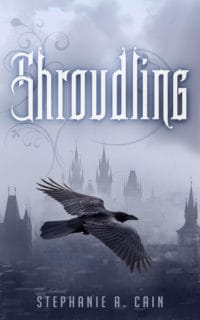
Get my email newsletter
My patreon page.

Follow me on Bookbub
Follow me on Bookbub to get new release notifications!
- Share on Facebook
- Share on Twitter
- Share on Pinterest
- Share on Email
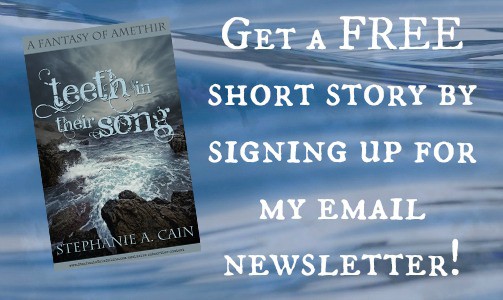
I'll never share your information with anyone else. You'll get fortnightly emails from me about what I'm working on, and every once in a while I send out exclusive freebies to my email list.
VIDEO COURSE
Finish your draft in our 3-month master class. Sign up now to watch a free lesson!
Learn How to Write a Novel
Finish your draft in our 3-month master class. Enroll now for daily lessons, weekly critique, and live events. Your first lesson is free!

Blog • Perfecting your Craft
Last updated on Mar 20, 2024
How to Write a Fantasy Novel (+ Worldbuilding Template)
For writers who long to create epic stories, unforgettable characters, and sprawling imaginary lands, there’s no better genre choice than fantasy. Particularly for those who have always loved reading fantasy , writing your own novel could be the culmination of all those magical adventures!
And who better to guide you through the process than some of the best fantasy writers and editors in the industry? For this post, we’ve consulted masters of the realm (so to speak) who have worked with George R. R. Martin, Brandon Sanderson, James Dashner, and more.
How to write a fantasy novel from start to finish:
1. Read all the fantasy you can
2. build your book’s fantasy world, 3. create series-worthy characters, 4. plot a story that comments on the real world, 5. write a draft full of compelling detail, 6. get feedback from fantasy experts, 7. publish your fantasy masterpiece.
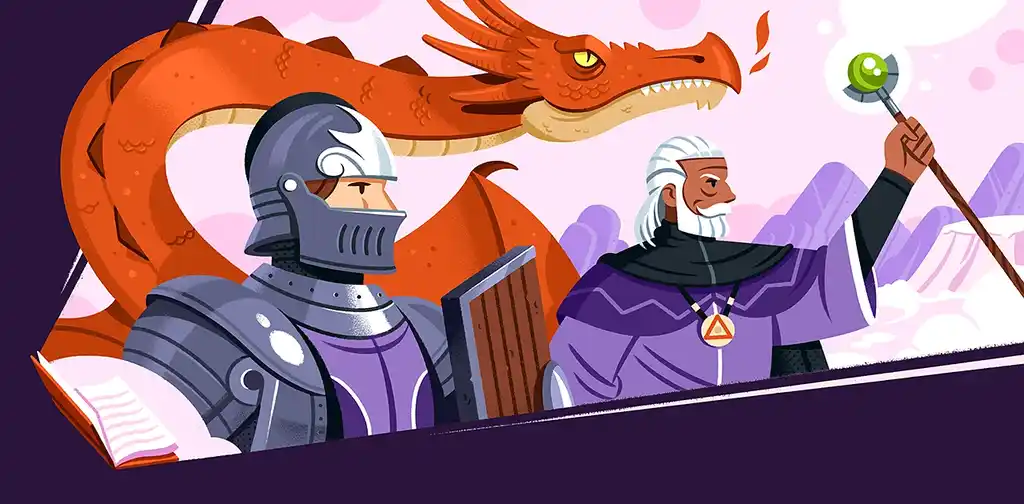
FREE COURSE
How to Write Fantasy Fiction
Learn to combine worldbuilding, plot, and character to create literary magic.
If you’re looking to write in this genre, you’ve likely read quite a bit of it already. But in order to succeed in your quest, you’ll have to read (or reread) even more!
Chersti Nieveen , an editor who has worked with bestselling authors like Brandon Sanderson, suggests picking 5 to 10 of your favorite fantasy books and tackling them with an eye for their strongest elements. This will help you absorb ideas not only for plot and character, but also for structure, descriptive techniques, dialogue, and more.
“Read the books that are classics. They are classics for a reason,” Chersti advises. “But also read the books that are bestsellers and the books that are award winners. Read and read and read, and you'll start to see your own writing improve.”

Start by reading your favorite tales of wizards, dragons, and more. Art by Veronica O’Neill .
Focus on your niche
Need help narrowing down your reading list? Try reading only within your own subgenre of fantasy for a spell (no pun intended)!
For example, if you’re writing a “sword and sorcery” fantasy, you might study Michael Moorcock’s Elric sequence, Karl Edward Wagner’s Kane series, and Charles R. Saunders’ Imaro . Or if you want to write a “portal” fantasy in which characters are transported to another world, you might revisit classics such as Alice's Adventures in Wonderland or The Chronicles of Narnia to mull over how that magic works.
For even more subgenre-specific recommendations, check out these posts:
- 26 Grimdark Books to Make You Shiver (blog post)
- 20 Highly Addictive Urban Fantasy Books (blog post)
- 25 Steampunk Titles That Define the Genre (blog post)
- 30 Best YA Fantasy Books for Teens (blog post)
A strong setting is crucial to any good work of fiction, and perhaps in fantasy most of all. It must be distinctive enough to draw readers into the story, but not so elaborate as to confuse them.
The first thing to consider is whether your novel will take place in our world (often referred to as “low fantasy”) or in a different world (“high fantasy”). The Harry Potter series, for example, takes place in a version of our world: witches, wizards, and magical creatures exist alongside Muggles like ourselves. The Lord of the Rings , meanwhile, is set in an entirely separate world with its own made-up lands, languages, and more.

Next up, build out the landscape of your fantasy world. Art by Paolo P .
Figure out what sets your world apart
After all that reading, you should have plenty of worldbuilding inspiration — but you also don’t want your book to read like a copy of someone else’s.
“You want to be original, so ask yourself: what sets my world apart?” says Alex Foster , a Reedsy ghostwriter who’s penned eight bestsellers.
To get you started, think about the following aspects of your world:
- How did this world come to be, both historically and in its current form?
- What are the limitations of its magic — physical, moral, or otherwise?
- Purely in terms of aesthetics, what do its various settings look like?
For even more thought-provoking prompts to help flesh out your fantasy world, download our ultimate worldbuilding template below!

FREE RESOURCE
The Ultimate Worldbuilding Template
130 questions to help create a world readers want to visit again and again.
Write down your rules
With the creation of a new world also comes the creation of all its internal logic and magic systems. True, fantasy should serve as an escape from dreary bureaucracy — but you still need to lay down the law about your world, otherwise people won’t take it seriously.
“I often see first-time fantasy writers breaking their own rules, and it really takes the reader out of the story,” says Jenny Bowman , a Reedsy editor who worked on Robert Beatty’s MG fantasy novel Serafina and the Black Cloak .
To combat this, she suggests writing down a reference list of rules so you don’t forget them: “When do the suns come up? Can only children under the age of 10 fly? When casting a spell, does it transform the object or create an object from nothing?”
“Know the rules of your world (what we call physics in the real world) when you're writing fantasy and don’t break them — unless you’ve thought a great deal and it’s intentional.”
Now that your world is established, it’s time to populate it with sparkling characters (perhaps literally, depending on your lore). No matter how great your world is, don’t just throw in some stock characters and call it a day!
Dynamic characters with clear goals
“The best characters are complex and original,” notes ghostwriter Alex Foster. “They possess realistic motives and weaknesses, and they change over time due to events and supporting characters in the story.”
In other words, great characters — and certainly great protagonists — should be dynamic, meaning they undergo internal change as the story progresses . This is typically an evolution in their beliefs and values, often to the extent that their whole perspective shifts.
What sets them on this journey? A clear set of character goals and motivations: whether related to their personal growth, resolving external conflicts, or saving the world. In fantasy, “big” character motivations tend to fall into that last category — but make sure to give your characters “small” motivations as well to keep them well-rounded and move the story along!

Your characters should be vivid, complex, and motivated in their actions. Art by Anna Arkhipova .
The character development process
As with worldbuilding, the more deeply you contemplate your character(s) at the outset, the stronger they will be in your novel.
Alex suggests “interviewing” your main character as a useful tactic. “What do they fear most? What are their goals? What are they willing to do to achieve these goals? Do this with all your characters when you're writing fantasy: craft a questionnaire and get your answers from them.”
Editor Jenny Bowman actually encourages writers to develop characters through short stories first . This process of working out the details, she says, “gives you the freedom to create a new universe with no boundaries.”
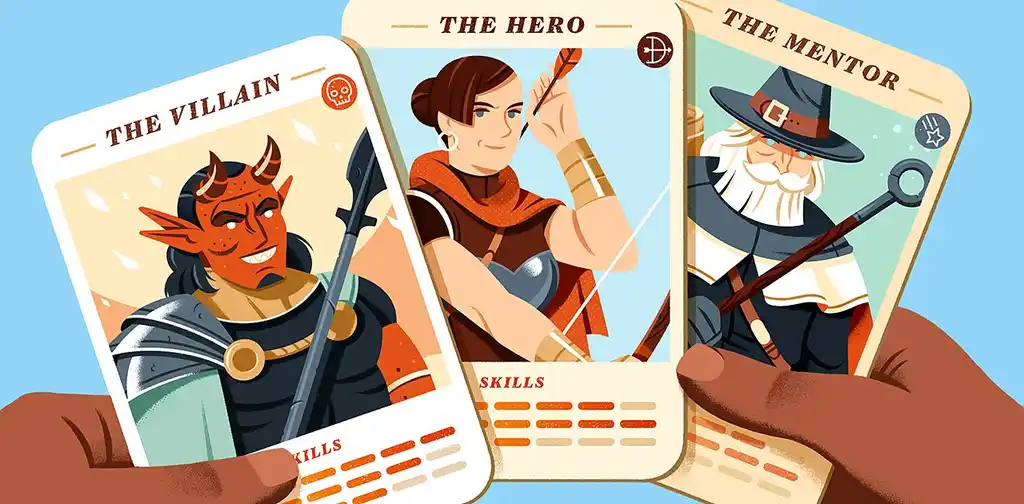
Reedsy’s Character Profile Template
A story is only as strong as its characters. Fill this out to develop yours.
Regardless of your methods, you should have a good amount of material for your world and characters before moving on to the next step: the plot.
As you outline the beats of your novel, remember that great fantasy plots don’t just deliver dramatic twists, but also draw compelling parallels to the real world. Take an epic political fantasy like A Song of Ice and Fire , or even a short story like “The Ones Who Walk Away from Omelas” by Ursula K. Le Guin — at the core of these plots is some kind of real-world issue.
Think about issues that are important to you
According to Rebecca Heyman , a Reedsy editor who has worked with popular fantasy authors such as Elise Kova, writing fantasy can be a great outlet. “Your concerns about politics, culture, the environment, technology, violence, racism, misogyny — these issues can be explored in inventive, eye-opening ways while writing fantasy.”
“ Carry On by Rainbow Rowell does this brilliantly. There are undercurrents of identity politics explored there, with deep characterization that merges meaningfully with the fantastical elements of the text.”
Indeed, the next step of the plotting process is to…
Intertwine key plot points with fantasy

Each major plot point of your story should have a healthy dose of magic. Art by JC Pouzols .
Next, you’ll determine exactly how magic will play into your book’s plot — then use it to build out those crucial parallels.
For example, in The Lord of the Rings , the One Ring symbolizes the hypnotic, destructive influence of power. While Tolkien denied that the story was an allegory for anything specific, the plot speaks for itself as a metaphor for power, showing how absolute power can corrupt absolutely.
To sample a few plot points from The Fellowship of the Ring :
- Frodo inherits the magical One Ring. Gandalf, who has been around long enough to understand its danger, tells him to remove it from the Shire.
- On their journey, Frodo and his friends are pursued by the wraithlike Black Riders. These riders are later revealed to be men who used the other Rings of Power to gain immortality but now find themselves helplessly enslaved.
- After Frodo falls under the Ring’s spell, he uses it to turn invisible and flee. Sam, who remains pure of heart and intention, follows him… in part to ensure that the Ring does not overtake Frodo entirely.
These key beats — and the One Ring’s role within them — demonstrate how you might connect fantasy and reality in your own story.
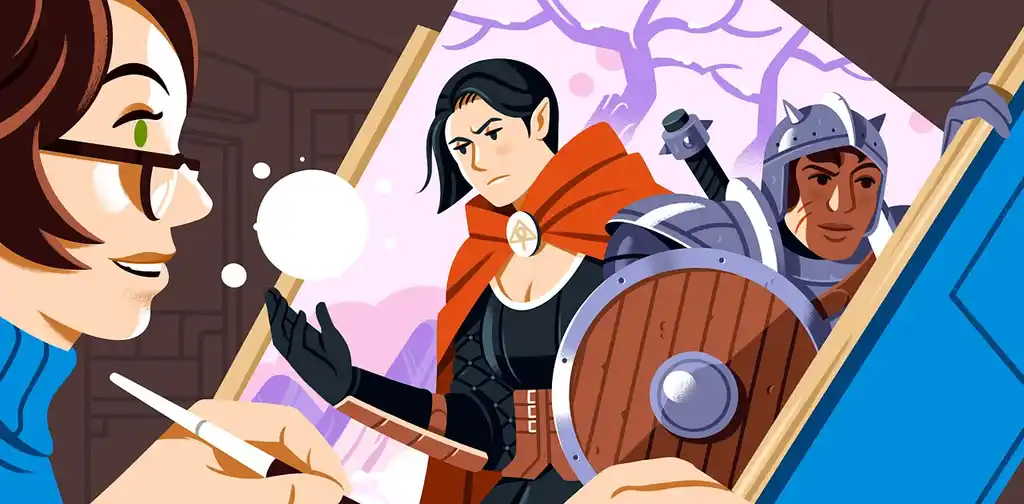
Fantasy Novel Outline Template
Craft an out-of-this-world novel with our step-by-step template.
Another classic Tolkien move is to spare no detail in your writing. But don’t forget that vibrant, in-the-moment details are just as important (if not more so) as backstory!
Ground readers with sensory details
Reedsy editor Erin Young , who worked on James Riley’s Story Thieves series and James Dashner’s Maze Runner series, reminds authors that they should show, not tell in a fantasy draft. “Don't just tell your reader the basics of your world. Instead, give them scenery when it relates to the story by getting your characters to interact with their surroundings.”
Michelle Hope , an editor who has worked with George R. R. Martin and Blake Crouch, couldn’t agree more — and notes that Martin is particularly skilled at this tactic.
“Crisp air, hooves clattering on ironwood planks, a warm tongue, women’s perfume, summerwine, soft fur. [Martin’s] writing is full of these concrete, real-life details… and when a reader can viscerally inhabit your world, they won’t question it when you introduce the fantastical into your story. They’ll just take your word for it.”

Sensory details like the gnarled bark of a tree, a dreamy pink sky at twilight, and newly cast spells shimmering in the air will help immerse readers in your story. Art by Josh Tufts .
Don’t info-dump
Some of the greatest fantasy writers of the 20th century were occasionally guilty of info-dumping. As editor Chersti Nieveen notes, with readers’ attention spans getting shorter and shorter, it’s best to avoid expositional overload if possible.
“Fantasy writers often try to introduce too many characters on one page, or there’s an info dump to reveal how the magic system works. Pages and pages before they even introduce the story… and you end up dropping readers that way.”
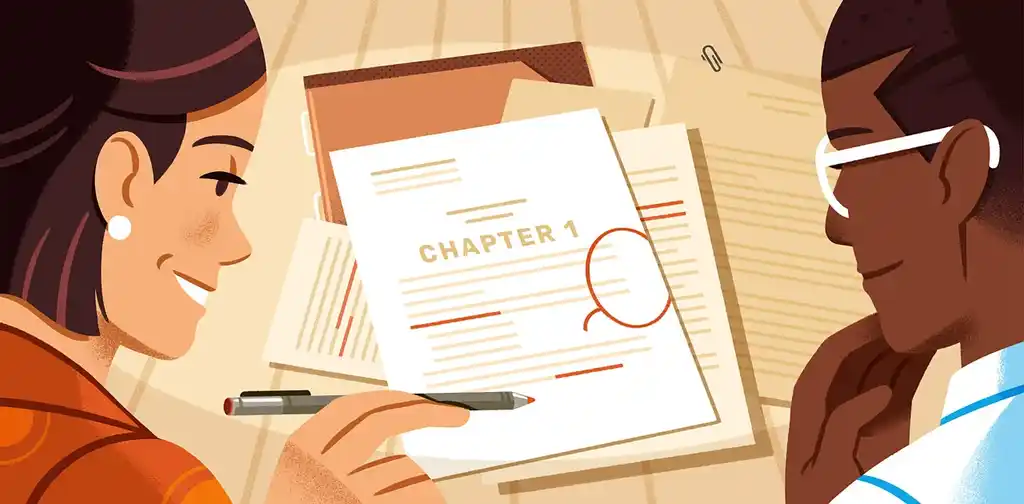
If you’ve completed a draft full of brilliant worldbuilding, dynamic characters, and insightful commentary, well done! However, seeking a second opinion at this point can also be very helpful.
Seek casual test readers first
Sometimes the best readers are the people you already know — family, friends, and acquaintances who enjoy fantasy and are willing to give your novel a beta read .
If you’re not sure whom to ask, you could always check out a fantasy-friendly community of writers or critique circle of authors , like the online SFF Chronicles forums or the Critters workshop run by the Science Fiction and Fantasy Writers Association.
Work with an experienced fantasy editor
That said, if you’re serious about improving your novel, you should really be working with a professional fantasy editor . An editor can offer incisive, experience-based feedback that will bolster not only your writing, but potentially your book sales as well.

MEET EDITORS
Polish your book with expert help
Sign up, meet 1500+ experienced editors, and find your perfect match.
Having edited your book into its best possible form, there’s only one thing left to do: get it traditionally published , or publish it yourself on a platform like Amazon KDP.
The wonderful thing about fantasy is that its readers have a nearly infinite appetite for the genre, so you can’t really go wrong either way. The previously linked posts are detailed, step-by-step guides on traditional publishing and self-publishing, but here are a few more resources to help:
- 100+ Literary Agents Seeking Fantasy Submissions (directory)
- The Ultimate Fantasy Book Title Generator (generator)
- Fantasy Name Generator for Elves, Dragons & More (generator)
- The Best Fantasy Book Publishing Companies (directory)
Best of luck on your hero’s journey — and remember to avoid cursed jewelry at all costs! 💍
16 responses
T.L. Branson says:
01/09/2017 – 05:36
I'm doing #2 right now. I totally get it. Writing short stories has helped me tremendously in understanding some fuzzy characters who have been more in the background in my main novel. Writing their story out helps me mold them a little better and write a real person instead of just a cardboard cutout.
↪️ jennyb_writes replied:
05/09/2017 – 23:29
Awesome!! I have worked with authors who have taken this step and those who haven't - I can always tell the difference. Way to go!
Lady Adellandra Dratianos says:
03/09/2017 – 23:48
I started my series "Chronicles of the Dragon Nations" by introducing a lot of people at once in the very first drafts years ago. Now, I introduce wherever they show up, but once. If it's been twenty or so pages since the introduction, I summarize who they were, either by dialogue between two characters or by reiterating who they were. Another rule from above that I use is the "Don't break your own rules." i.e. In my books, those in the Mortal Realm cannot shift or fly, due to gravity and the laws of nature. I had to remind myself this when I had three characters from another land, shapeshifters from the Dragon Nations are able to shift. Once reading it over for edits, I remembered my Mortal Realm rule and changed it. Lady Adellandra www.amazon.com/author/ladyadellandra
05/09/2017 – 23:32
Don't break your own rules is a tricky one...way to go catching your mistake in rewrites! Sometimes those laws of nature are so subtle and it always pays to pay attention in rewrites and edits. Happy writing!
Omnipleuvre says:
16/01/2018 – 20:53
One thing I've seen a lot, even in published books, is the description featuring waaaaay too many names at once. I should be able to grasp the premise of your story without needing to know that Adriana, heir to the Kingdom of Tallyrand is about to cross the Wall of Gishegrunurman to search for the amulet of Kinscaer. Too many names all at once is almost as bad as an infodump I feel.
Jenna Hunter says:
27/03/2018 – 20:53
It was interesting to read that the environment can be a plot point in a fantasy book. I think that making a lot of detail in a book is really important. I love reading books that create an entire universe, especially full of dragons, dwarves and all kinds of mythical creatures. http://crimsonthedragon.com/
Rishabh Chaturvedi says:
31/05/2018 – 18:49
How do I make my world different from the ones that influenced me to write a fantasy novel??
Janice Swanson says:
28/11/2018 – 12:59
What a wonderful article! Once I dream about how to create its fantasy the world, write a large number of books about this world, and I hope that once on my books based the film. All of the above items are really important to know the novice writer. Point # 13 is especially important for me, because the idea to write a book came to me after I was inspired by the works of Tolkien and George Orwell. These writers have their own inimitable style, and each of their stories makes me think about a lot. I would really like to write a novel, and to get it in a new genre, it will be something between fantasy and anti-utopia novel. Thank you for sharing such interesting and useful articles.
25/02/2019 – 11:17
A very interesting article, I learned a lot of new things for myself, which I hadn’t thought about before, but unfortunately not all the tips are applicable at the moment to modern works. The market is overcrowded with a variety of short-growing love stories, psychology and other tinsel. Now there is not enough quality fiction, but what appears is read immediately and very quickly. I strongly advise you to read a series of books about the Witcher, insanely interesting books, I just could not tear myself away for several months. If you want to know more about fiction, then examine this link.
Someguy says:
31/05/2019 – 13:35
"...and no-one would instinctively group Harry Potter and Stephen King's The Dark Tower in the same category." FYI. A relic from Harry Potter's world actually appears in the Dark Tower. While not in the same category, it easily can convince a reader of Harry Potter to read The Dark Tower or vice versa. It's a bit of a unique relationship.
↪️ Nick replied:
17/06/2019 – 12:00
Also, bogarts are based on It/The Spider/whatever species it is. And while she(Pennywise is just one form and a female spider is its true form) only kind of appears in TDT, there's a character in the series that's the same species I do believe
17/06/2019 – 12:02
I absolutely hate short stories. I can't write that little!
Elijah says:
25/06/2019 – 21:24
I’ve been working on a 5 book story for about 15 years now. I took several writing classes and have become so self critical of my writing that it has been hard to progress. I also lost a lot of my original papers due to mice (I found it easier to write by hand). These tips definitely make me feel like I’m on the right path lately.
Joseph Smith says:
07/11/2019 – 07:30
I'm currently on the third chapter of a book that I hopefully will actually complete, and so far I have stuck to most of these rules (high fantasy, sword and sorcery/heroic fantasy with a touch of dark fantasy), with the only two I haven't done as of yet is re reading lotr and creating a character interview (I have made a DnD character sheet of him if that counts). The kind of story I'm going with (not going to go too far into it) is a paladin raised from the dead only to have magic that he doesn't understand return some form of life to him finds a new purpose in hunting down undead and returning them to the afterlife. Any advice I can get?
William Anthony Pitzer says:
07/11/2019 – 22:01
The issue I have with number 2 is that I generally hate short stories, so obviously I'll find it difficult to write them. If a story is too short, then it's impossible to flesh out characters and a world tremendously, which is the whole reason that I read fantasy to begin with.
Matthew R Bishop says:
14/02/2020 – 18:39
Thank you! Rewriting like eight books because of this article, ugh. But thank you ;)
Comments are currently closed.
Continue reading
Recommended posts from the Reedsy Blog

450+ Powerful Adjectives to Describe a Person (With Examples)
Want a handy list to help you bring your characters to life? Discover words that describe physical attributes, dispositions, and emotions.
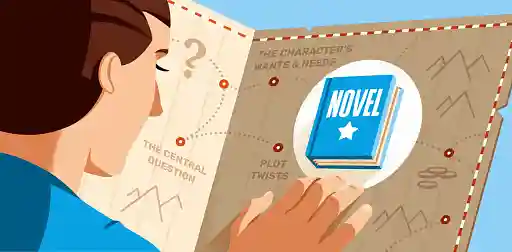
How to Plot a Novel Like a NYT Bestselling Author
Need to plot your novel? Follow these 7 steps from New York Times bestselling author Caroline Leavitt.

How to Write an Autobiography: The Story of Your Life
Want to write your autobiography but aren’t sure where to start? This step-by-step guide will take you from opening lines to publishing it for everyone to read.

What is the Climax of a Story? Examples & Tips
The climax is perhaps a story's most crucial moment, but many writers struggle to stick the landing. Let's see what makes for a great story climax.

What is Tone in Literature? Definition & Examples
We show you, with supporting examples, how tone in literature influences readers' emotions and perceptions of a text.

Writing Cozy Mysteries: 7 Essential Tips & Tropes
We show you how to write a compelling cozy mystery with advice from published authors and supporting examples from literature.
Join a community of over 1 million authors
Reedsy is more than just a blog. Become a member today to discover how we can help you publish a beautiful book.
Bring your stories to life
Our free writing app lets you set writing goals and track your progress, so you can finally write that book!

1 million authors trust the professionals on Reedsy. Come meet them.
Enter your email or get started with a social account:
How to Research a Novel: 9 Key Strategies
by Joslyn Chase | 2 comments
Have you ever started a story, gotten halfway through, and realized you don't know key facts about your story's world? Have you ever wondered how to find out the size of spoons in Medieval England for your fantasy adventure story? Is that even relevant to your plot, or could you skip that fact? Here's how to research your novel.
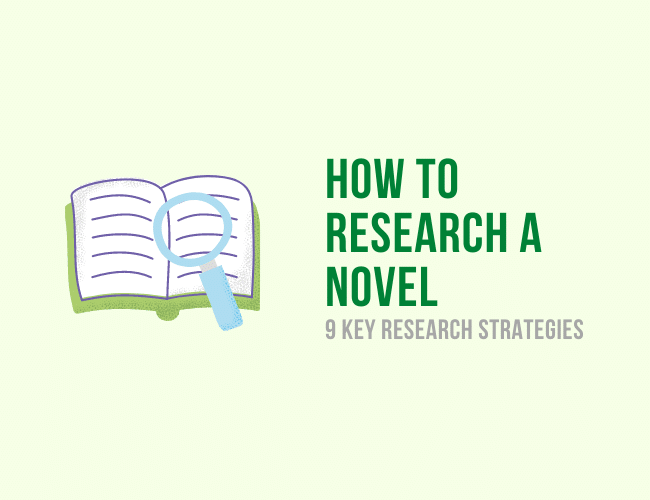
As fiction writers, our job is to sit at a keyboard and make stuff up for fun and profit. We conjure most of our material from our imagination, creativity, and mental supply of facts and trivia, but sometimes we need that little bit of extra verisimilitude that research can bring to a project.
When it comes to research, there are key strategies to keep in mind to help you make the most of your time and effort.
9 Strategies to Research a Novel
Readers who’ve posted reviews for my thriller, Nocturne In Ashes , often comment about how well-researched it is. While that can be a positive sentiment, that’s not really what you want readers to notice about your book. The best research shouldn’t call attention to itself or detract readers from the story so I’m always relieved to hear those same reviewers go on to rave about the thrills and suspense.
When you're writing, you want to get the facts right and create a believable world. Doing research for your novel is the way to do that. But you also don't want to get sucked into a research hole, so distracted by the local cuisine of a small town in 1930s France that you never actually write. And you want to hook your readers with a page-turning story , not a dissertation on some obscure topic.
Here are nine key research strategies I’ve learned to write an effective (and exciting!) story.
1. Write first, research later
Research can be a dangerous enterprise because it’s seductive and time spent in research is time taken away from actual writing of the creative process. Getting words on the page is job one, so it’s important to meet your daily writing goal before engaging in research.
So if the piece you’re working on requires research, your first order of the day should be to write something else that doesn’t need research, something you can draw purely from imagination and your own mental well. Fill your word quota, practice your skills, meet your production goals, and THEN move on to research, so you don't derail your writing process with it.
I always have multiple works in progress. I’m writing project A while researching project B and thinking about and planning projects C through M.
2. Research is secondary; telling a good story comes first
After all the precious time boosting your knowledge of historical events or the feel for a subject, this point might hurt: only use a tiny fraction of your research in the story.
Don’t give in to the temptation to dump everything you've learned into the story. Sure, it’s fascinating stuff but you risk burying the story in scientific or historical detail.
A little bit of researched material goes a long way. Only use info related to the issues your character would know about and be concerned with. Leave out the captivating but irrelevant details.
Your research should enhance the story, not dominate it.
3. Write for your fans
Your story should be targeted to the readers who love what you write—your fans. Stop worrying about the five people out there who might read your story and nitpick that your character used the wrong fork or wore the wrong kind of corset.
A lot of writers fake it or write only from the knowledge they do have. They don’t let their lack of esoteric knowledge get in the way of the story. They do research for their novels, grab a few details for the sake of authenticity, and wing the rest.
With the exception of 11/22/63, Stephen King does very little research, but there are few who can write a more riveting story.
4. Don’t obsess over accuracy
Frankly, there are instances and reasons where you don’t really want to be accurate. For example, if you write historical romance, research might show that people of that time period rarely bathed and lost most of their teeth and hair at a young age. That’s probably not how you want to portray your heroine and the man of her dreams.
Sometimes, including a historically or scientifically accurate detail would require pages of explanation to make it credible for today’s audience—almost a surefire way to lose your reader. When in doubt, leave it out.
And no matter how hard you work at it, you’re not likely to cover every detail with one hundred percent accuracy, so don’t obsess over it. Do your best, but remember—story is what matters, not accurate details.
5. Go with the most interesting version
When researching an event, you’ll usually find a number of different accounts, especially when using primary sources, none in perfect agreement with the others. When this happens, do what the History Channel does—go with the most entertaining version of events.
Remember, you’re a storyteller, not a historian. Your goal is to grab and hold your reader’s attention and keep them turning pages. If it makes you feel better, you can include endnotes with references so interested readers can dig deeper into the “facts.”
6. Keep a “bible”
This is especially important if you’re writing a series. You can’t be expected to remember every important detail about the characters and settings you put in book one when, years later, you’re working on book seven.
Record these details in an easy-to-reference format you can come back to later to provide continuity and reader confidence in your ability to tell a coherent story.
7. Don’t fall down the wormhole
I love doing research. It’s fun, fascinating, and absorbing—so absorbing, it can suck you in and keep you from moving on to the writing. You need to be able to draw the line at some point. As Tina Fey says in her book, Bossy Pants , “The show doesn't go on because it's ready; it goes on because it's 11:30.”
Know when it’s time to leave the research and get to the writing. Pro tip: set yourself a time limit or a deadline. Even if you don't “feel” finished with research, you'll have a clear marker for when you have to put the research down and get back to writing.
8. Save simple details for last
Sometimes when you’re writing along in your story, you’ll find yourself needing a simple detail. Make a notation, resolve to come back to it later, and move on. Don’t let this interrupt or distract you from getting the story down on the page.
Later, you can come back and do the minimal research to fill in these little details like a character name , a location, a car model, etc. Shawn Coyne calls this “ice cream work” because it’s fun and feels frivolous after the concentrated work of writing the story itself.
9. Finish THIS project before starting another
One great thing about research is that you learn so much and find the seeds for so many new story ideas. The challenge is to not get distracted from your current project.
Make a note to yourself to pursue these other ideas somewhere down the road. Let those seeds sprout and grow in the back of your mental garden, but keep your focus on the story you’re writing now .
Resources: Where to Actually Research Your Novel
I’ve touched on how to do the research. Here, I’m adding a few suggestions about where to go for the goods.
- Wikipedia, and don’t forget to dig into the links at the bottom of the article
- Reenactor sites for historical battles, uniforms, etc.
- Costuming sites
- Travel guides
- Writer’s Digest Writer’s Guide to Everyday Life in … fill in the blank (these are loaded with details of landscape, clothing, household items, and more)
- Biographies and autobiographies, and don’t overlook their bibliographies and footnotes
- Blog posts of expert and amateur historians
- Journals and diaries
- Weather reports
- Price lists, to find out how much were salaries, groceries, mortgage payments, etc.
- Birth and death certificates, court documents
- Etymology websites
- Museum exhibits and gift shops, including the little touristy booklets, maps, tour guides
- Libraries! Talk to a reference librarian—they’re awesome at plumbing resources.
Novel Research Rocks!
Research really is intriguing and a lot of fun. There’s so much to discover, but beware because you can get lost in it and never find your way out. You’re better off under-researching than over-researching, so know when to get out and move on.
Also, be aware that your novel's research requirements will differ somewhat based on the genre you’re writing . For instance, with historical fiction, you need to give your readers a travel adventure into the past with sensory details to draw them into the time period.
With science fiction, you need to be able to extrapolate from scientific fact and theory to the fictional premise of your story. In doing so, don’t get bogged down in the journey from point A to point B. Just get to the conclusion. The more you explain, the less credible it sounds to the reader.
With fantasy, it’s the little world-building details that count for so much. Know what your reader expects and craves and meet those demands.
And no matter how much research your book requires, don't discount your personal experience with being human—those emotional, intellectual, and philosophical experiences often cross time and space.
I wish you many happy hours of successful novel research, but don’t forget to write first!
How about you? Do you do research for your novels? Where do you turn for information? Tell us about it in the comments .
Use one of the prompts below or make up your own. Conduct a little research—just enough to add verisimilitude to the scene, a few telling details. Spend five minutes researching two to three facts that will help you set the scene. Then, take the next ten minutes to write a couple of paragraphs to establish the character in the setting.
The death of her father leaves Miss Felicity Brewster alone in regency England and places upon her the burden of fulfilling his last wish—that she marry a safe, respectable gentleman.
Accused of treason, Frendl Ericcson sets out to find his betrayer and restore his honor.
Dr. Vanessa Crane makes a breakthrough in her nanotechnology research. But will her discovery benefit mankind, or destroy it?
With the help of his mortician friend, Victorian-era detective Reginald Piper must use cutting-edge forensic methods to solve a string of murders.
When you are finished, post your work the Pro Practice Workshop here and don’t forget to leave feedback for your fellow writers! Not a member yet? Check out how you can join a thriving group of writers practicing together here.

Joslyn Chase
Any day where she can send readers to the edge of their seats, prickling with suspense and chewing their fingernails to the nub, is a good day for Joslyn. Pick up her latest thriller, Steadman's Blind , an explosive read that will keep you turning pages to the end. No Rest: 14 Tales of Chilling Suspense , Joslyn's latest collection of short suspense, is available for free at joslynchase.com .
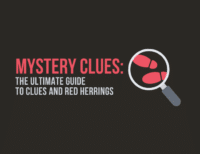
I wish I’d read point 6 – keep a bible a couple of years ago before I wrote my 450k word magnum opus, because I’m now writing several supplemental short stories in that universe and I’m forever digging through for minor character’s names, details of meeting places etc
My current WIP is involving a lot more research than I expected. I had to re-write a hunting scene twice, because the first version, which I showed to a real bow-hunter, had him going after the deer right away, and my hunter-friend said to wait a half hour before you start tracking a deer. I don’t hunt myself, so I took his word and re-wrote it, but my gut said it wasn’t right. So I did some surfing and found both his advice, and advice that said you should go after a hip shot right away (basically agreeing with what my gut said should be happening). So was he wrong, were the sources that agreed with me wrong, or was he getting a wrong impression of what was going on? I decided I was overly in love with the opening sentence of the scene and re-wrote the whole thing yet again, using the “simple details” I’d discovered to clarify the deer had taken a hip shot. Minor scene, but a major position: it’s introducing the #2 member of my hero team.
Could it wait until later? Possibly, but I’m seriously considering serializing this thing, so the beginning chapters might be getting published before the end chapters of the first book get written, and I’m hoping for seven books out of this (probably close to 1M words total).
The Devil is in the details!
Submit a Comment Cancel reply
Your email address will not be published. Required fields are marked *
Submit Comment
Join over 450,000 readers who are saying YES to practice. You’ll also get a free copy of our eBook 14 Prompts :
Popular Resources
Book Writing Tips & Guides Creativity & Inspiration Tips Writing Prompts Grammar & Vocab Resources Best Book Writing Software ProWritingAid Review Writing Teacher Resources Publisher Rocket Review Scrivener Review Gifts for Writers
Books By Our Writers

You've got it! Just us where to send your guide.
Enter your email to get our free 10-step guide to becoming a writer.
You've got it! Just us where to send your book.
Enter your first name and email to get our free book, 14 Prompts.
Want to Get Published?
Enter your email to get our free interactive checklist to writing and publishing a book.

The Serial Binger
Your Daily Dose of Kpop, Kdrama, and Anime Excitement!
50 Best Fantasy Book Series (Must Read Before you Die)
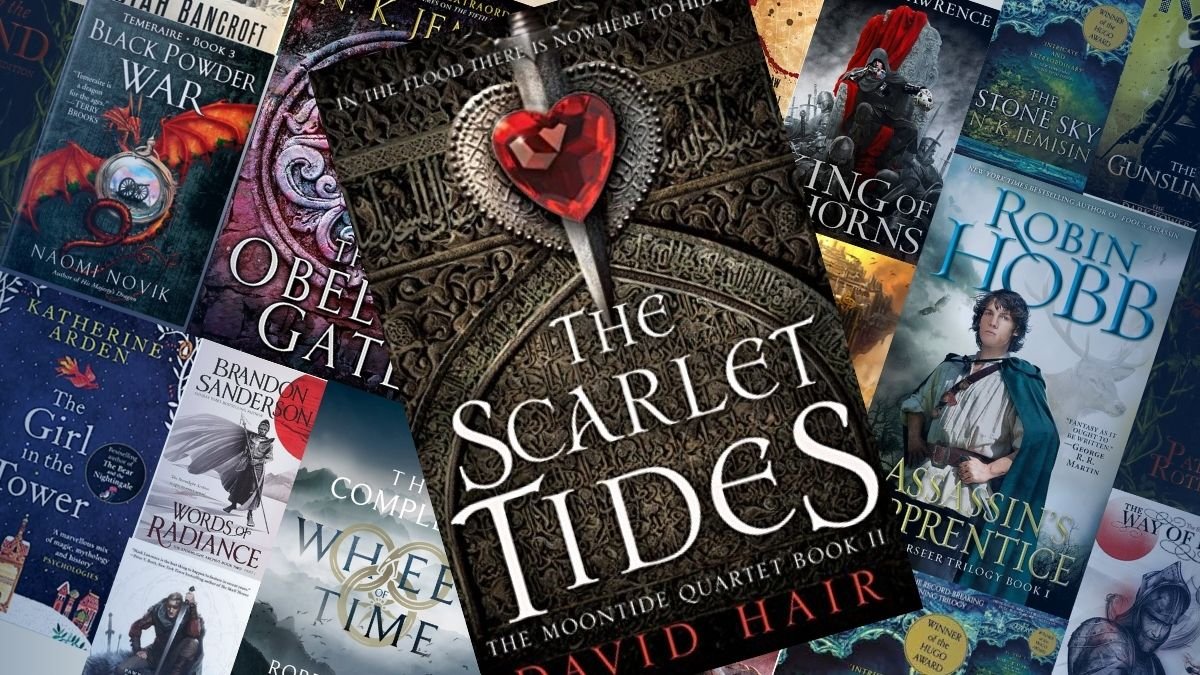
Dive into realms of wonder, where magic dances with the imagination and heroes embark on quests that challenge the very fabric of reality. Fantasy literature, with its intricate tapestries of lore and legend, has always held a special place in the hearts of readers. It offers an escape, a doorway to worlds where dragons soar and kingdoms rise and fall on the whims of wizards. From timeless classics to modern masterpieces, the genre has given us countless tales that linger long after the last page is turned. In this compilation, we journey through the 50 best fantasy book series ever penned , inviting you to lose yourself in sagas that redefine the boundaries of the imaginable. Join us, and let the adventure begin!
Pointers that were considered during the selection process of the “50 Best Fantasy Book Series”:
- Literary Merit: The series’ writing quality, showcasing intricate plots, profound character arcs, and a captivating narrative, setting it apart in the vast sea of fantasy literature.
- World-Building: The series’ ability to craft immersive, detailed universes, making readers feel they’ve stepped into another realm, rich with history, culture, and unique landscapes.
- Reader Reviews: Feedback from the reading community, reflecting genuine reactions, praises, and critiques, ensuring the series resonates with its intended audience.
- Awards and Recognitions: Accolades the series has garnered, indicating its excellence and standing in the literary world, and validating its place among the best.
- Re-readability: The series’ enduring charm, enticing readers to revisit its pages multiple times, discovering new layers and nuances with each read, showcasing its depth and complexity.
50. The Divine Cities
- Logline: Gods have fallen, and their once-magical cities navigate a new era of politics and power.
- Author Name: Robert Jackson Bennett
- First Book Published: “City of Stairs” (2014)
- Total Books in Series: 3
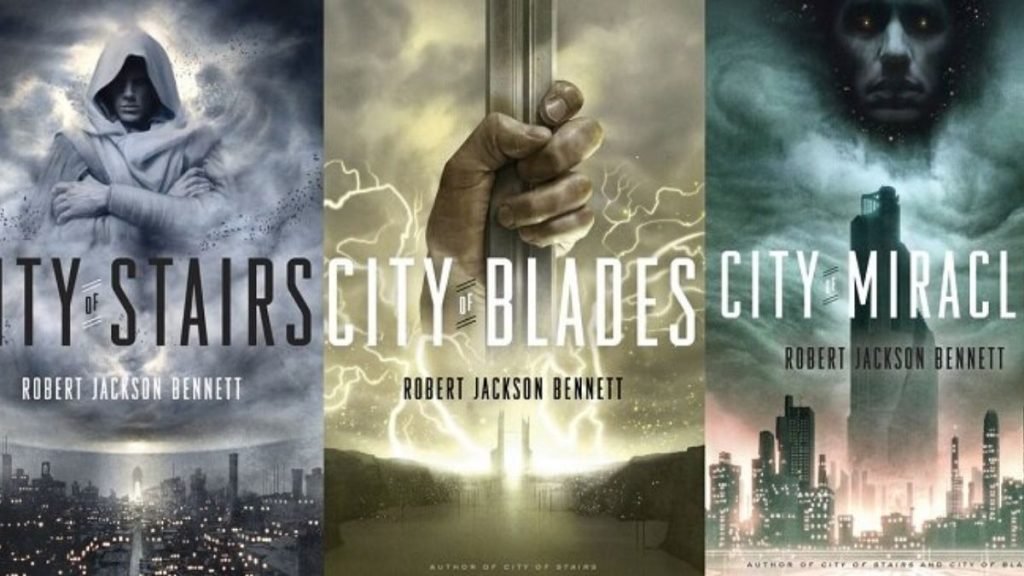
49. The Moontide Quartet
- Logline: Every twelve years, a bridge emerges, igniting war, trade, and intrigue between continents.
- Author Name: David Hair
- First Book Published: “Mage’s Blood” (2012)
- Total Books in Series: 4

48. A Pattern of Shadow & Light
- Logline: Five strands of power weave a tapestry of war, treachery, and hope.
- Author Name: Melissa McPhail
- First Book Published: “Cephrael’s Hand” (2010)
- Total Books in Series: 5
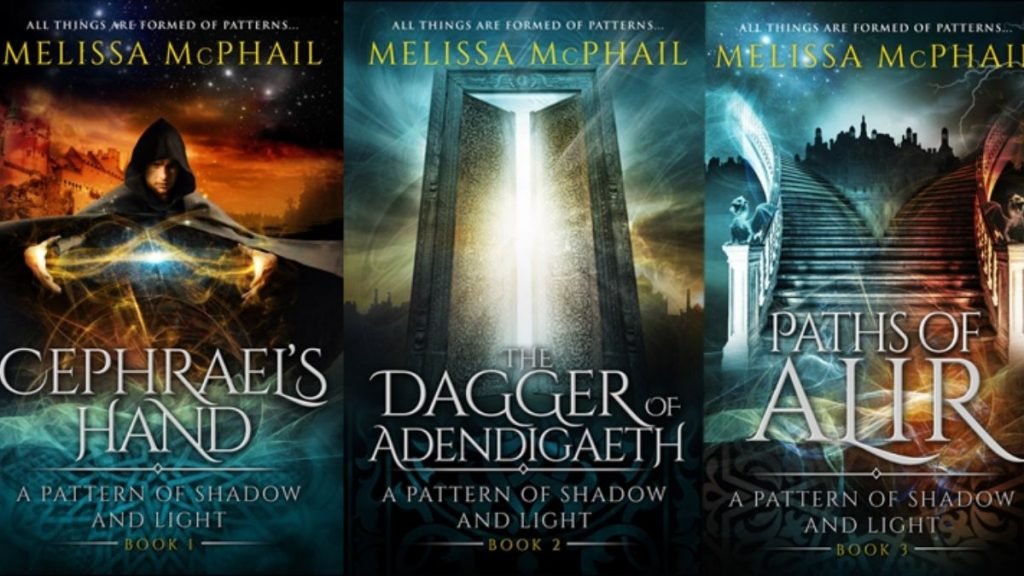
47. The Books of Babel
- Logline: A man’s search for his lost wife in a towering, mysterious structure.
- Author Name: Josiah Bancroft
- First Book Published: “Senlin Ascends” (2013)
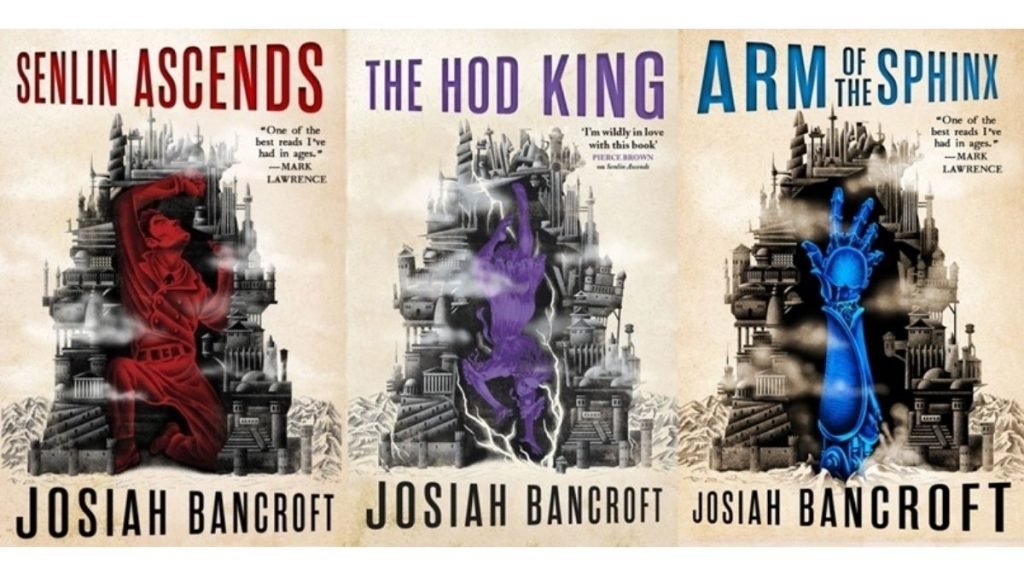
46. The Sevenwaters Trilogy
- Logline: Ancient magic, love, and family ties shape Ireland’s fate.
- Author Name: Juliet Marillier
- First Book Published: “Daughter of the Forest” (1999)
- Total Books in Series: Originally a trilogy, but expanded to 6 books.
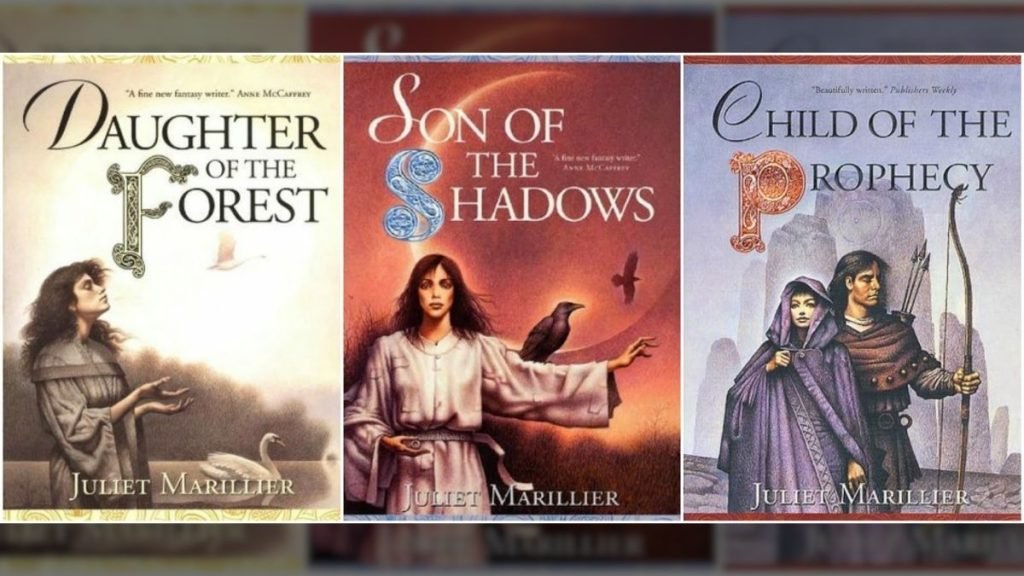
45. The Sword of Truth
- Logline: A woods guide is thrust into a battle between good and evil, wielding a powerful sword.
- Author Name: Terry Goodkind
- First Book Published: “Wizard’s First Rule” (1994)
- Total Books in Series: 15
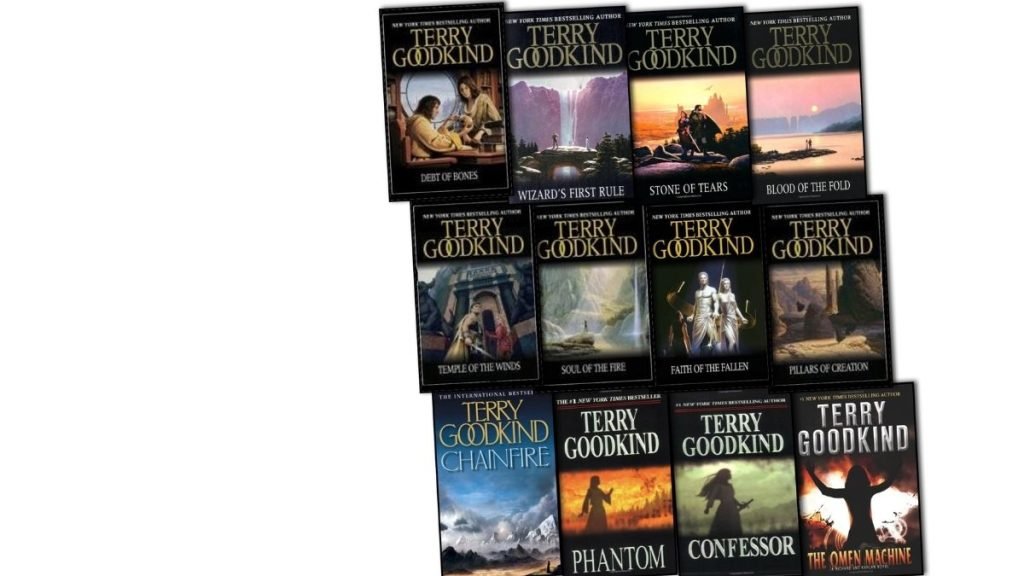
44. Valdemar Series
- Logline: In a magical kingdom, Heralds and their telepathic companions uphold justice and face challenges.
- Author Name: Mercedes Lackey
- First Book Published: “Arrows of the Queen” (1987)
- Total Books in Series: Over 40 (including trilogies and standalone)
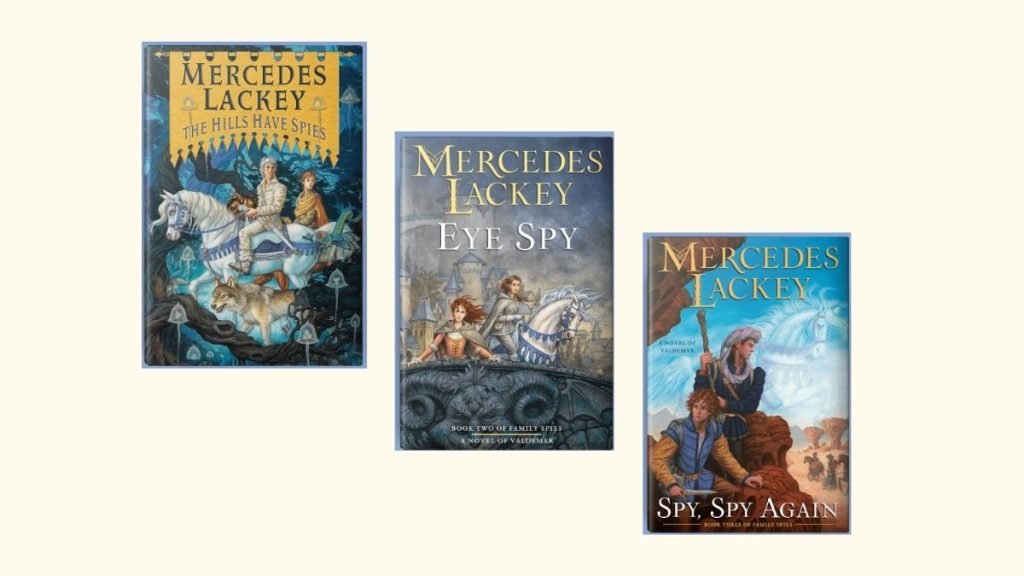
43. The Pern Series
- Logline: On the planet Pern, dragonriders combat a deadly spore with the help of telepathic dragons.
- Author Name: Anne McCaffrey
- First Book Published: “Dragonflight” (1968)
- Total Books in Series: 24
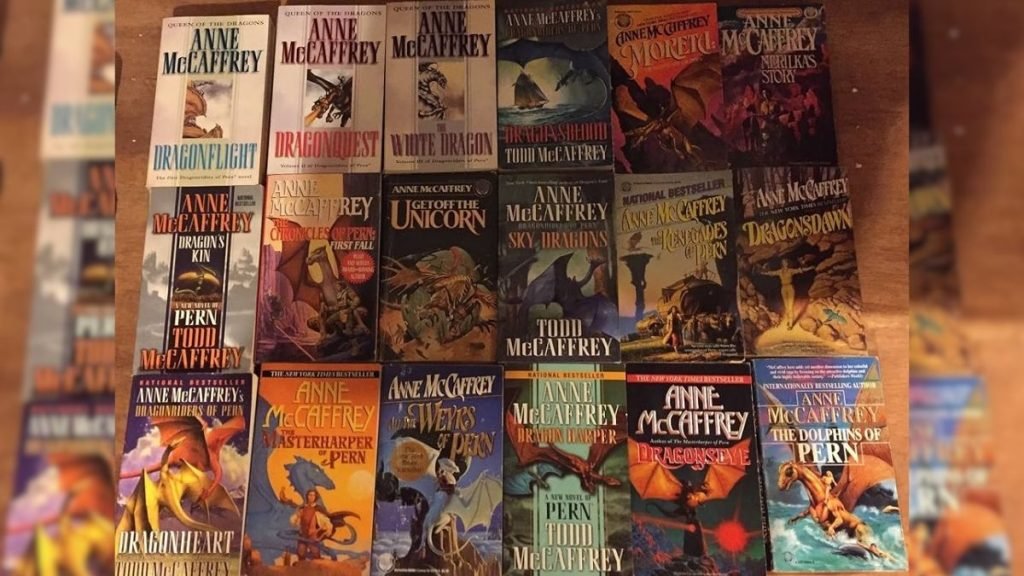
42. Book of the Ancestor
- Logline: In a convent, young girls are trained to be assassins, mages, and warriors.
- Author Name: Mark Lawrence
- First Book Published: “Red Sister” (2017)

41. The Winternight Trilogy
- Logline: In medieval Russia, a girl bridges the mortal world and mythological realms.
- Author Name: Katherine Arden
- First Book Published: “The Bear and the Nightingale” (2017)
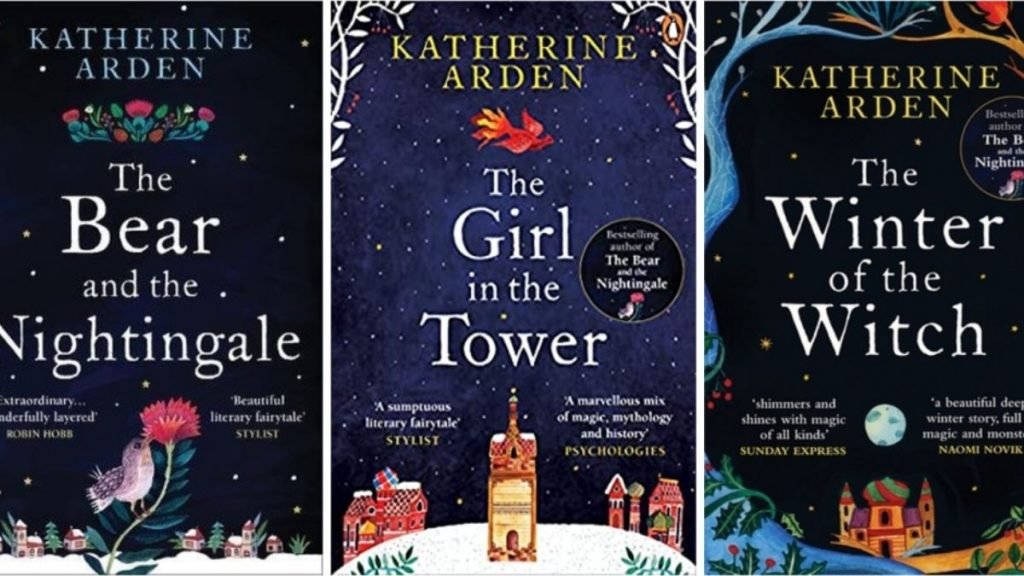
40. The Demon Cycle
- Logline: Humanity battles nocturnal demons using magical symbols and the power of daylight.
- Author Name: Peter V. Brett
- First Book Published: “The Warded Man” (also known as “The Painted Man”) (2008)
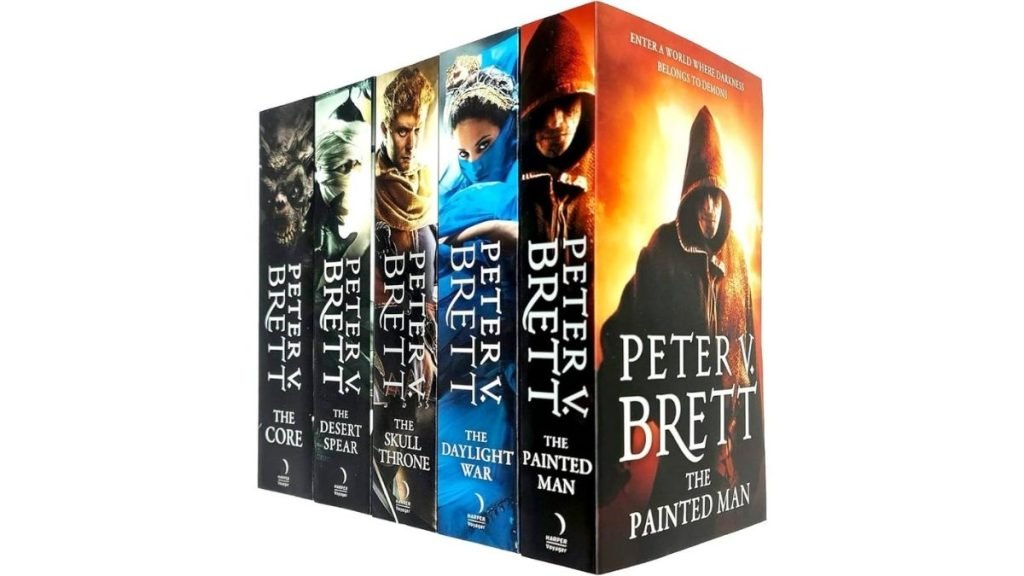
39. The Red Queen’s War
- Logline: A prince and a Norse warrior embark on a perilous quest in a post-apocalyptic Europe.
- First Book Published: “Prince of Fools” (2014)
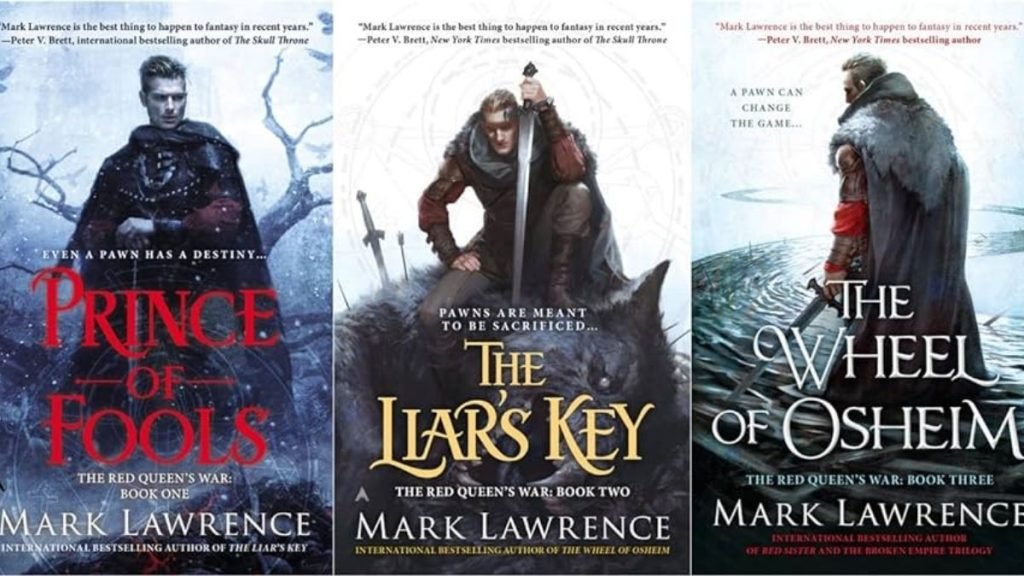
38. The Shadow Campaigns
- Logline: A blend of military strategy and ancient magic shapes the fate of an empire.
- Author Name: Django Wexler
- First Book Published: “The Thousand Names” (2013)

37. The Books of Pellinor
- Logline: A young girl’s destiny unfolds amidst ancient prophecies and magical gifts.
- Author Name: Alison Croggon
- First Book Published: “The Naming” (2002)

36. Powder Mage Trilogy
- Logline: In a world of gunpowder and gods, a coup threatens an established order.
- Author Name: Brian McClellan
- First Book Published: “Promise of Blood” (2013)
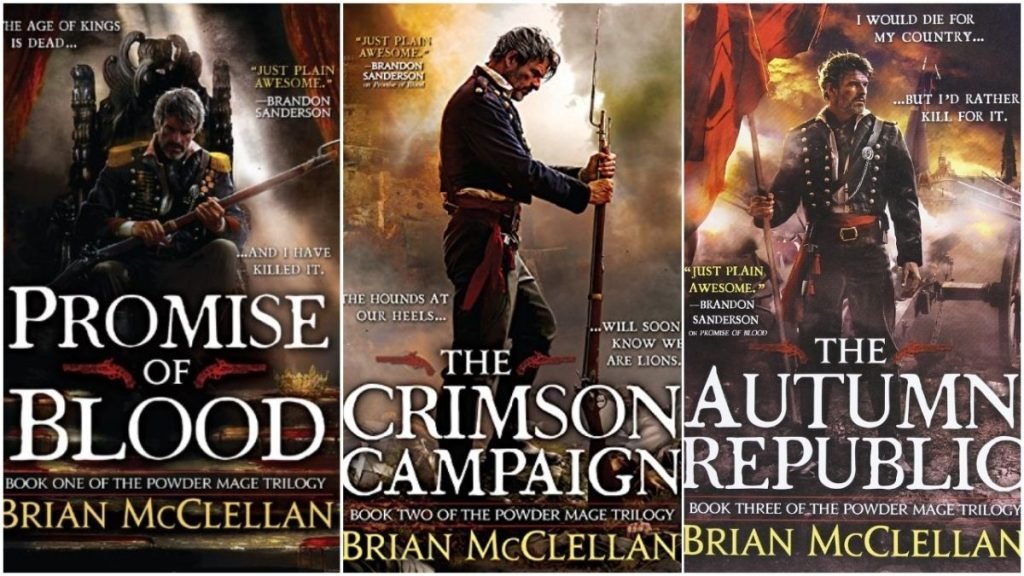
35. The Chronicles of the Black Company
- Logline: A mercenary band navigates wars, dark sorcery, and shifting allegiances.
- Author Name: Glen Cook
- First Book Published: “The Black Company” (1984)
- Total Books in Series: 9
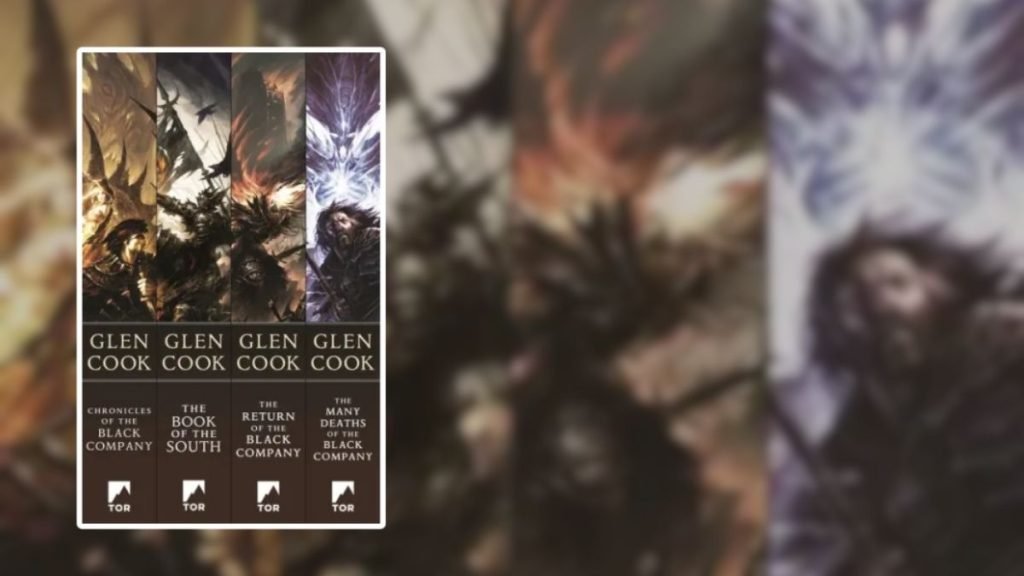
34. The Licanius Trilogy
- Logline: In a land of prophecy and war, the past confronts the future.
- Author Name: James Islington
- First Book Published: “The Shadow of What Was Lost” (2014)

33. The Inheritance Cycle
- Logline: A farm boy and his dragon embark on a quest against an evil empire.
- Author Name: Christopher Paolini
- First Book Published: “Eragon” (2002)
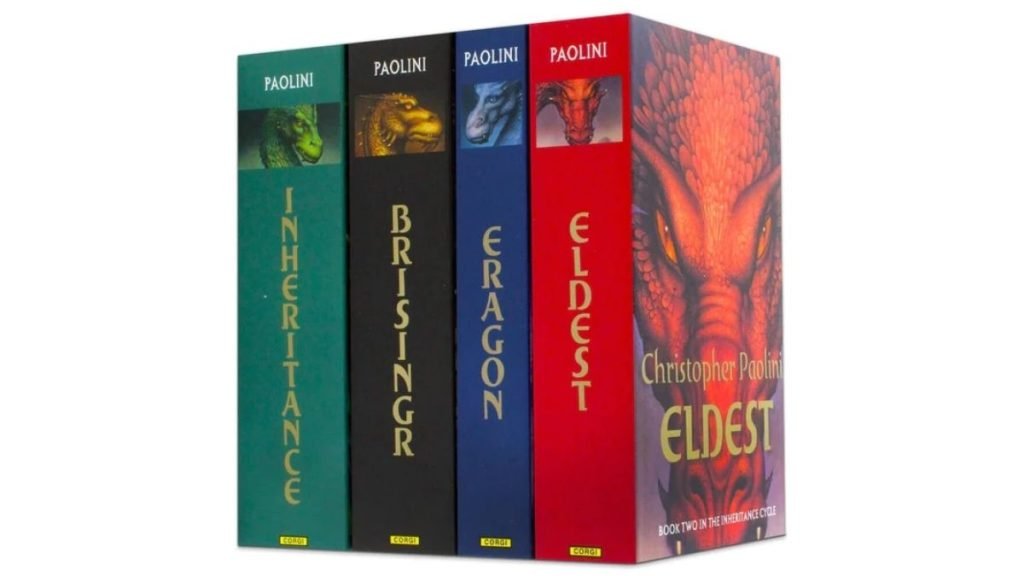
32. The Temeraire Series
- Logline: The Napoleonic Wars reimagined with intelligent dragons as aerial combatants.
- Author Name: Naomi Novik
- First Book Published: “His Majesty’s Dragon” (2006)
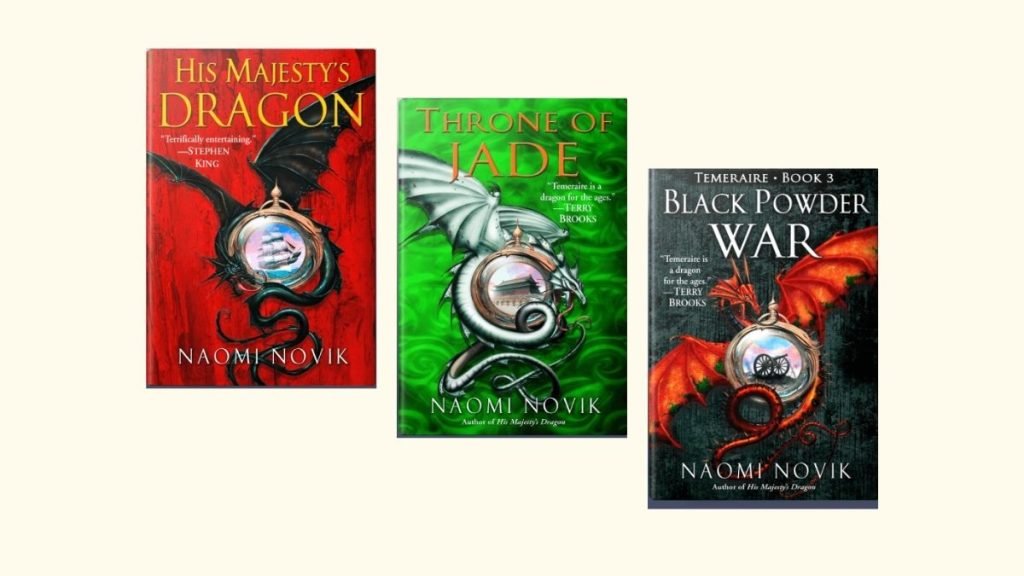
31. The Magicians
- Logline: A brilliant student discovers magic is real, and reality is painful.
- Author Name: Lev Grossman
- First Book Published: “The Magicians” (2009)

30. Memory, Sorrow, and Thorn
- Logline: An orphaned scullion’s fate intertwines with an ancient, malevolent force.
- Author Name: Tad Williams
- First Book Published: “The Dragonbone Chair” (1988)
- Total Books in Series: 3 (Original trilogy)
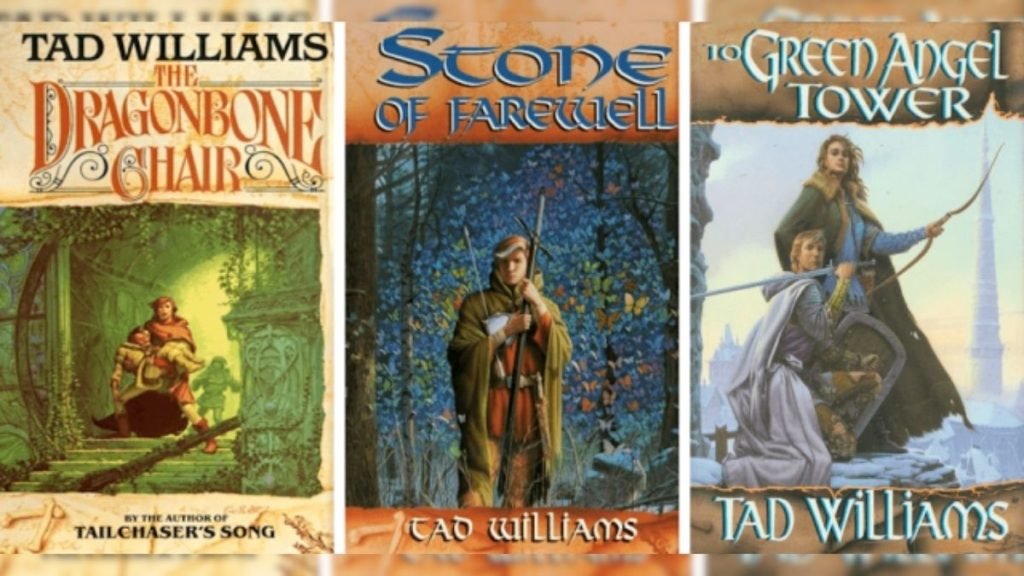
29. Codex Alera
- Logline: A young man’s journey in a land where elemental spirits fuel powerful magics.
- Author Name: Jim Butcher
- First Book Published: “Furies of Calderon” (2004)
- Total Books in Series: 6
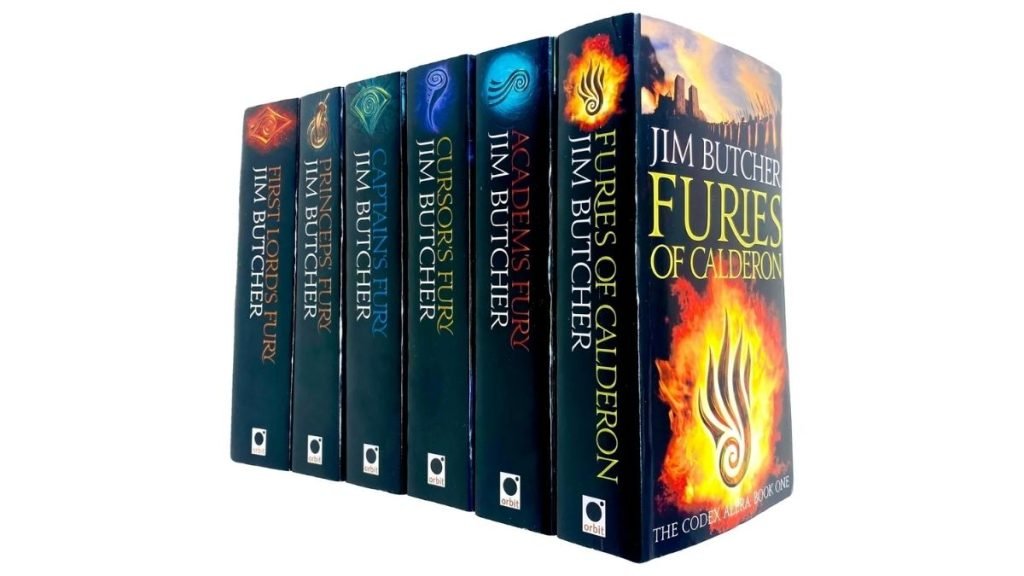
28. The Broken Earth Trilogy
- Logline: A shattered world’s fate hinges on its most despised inhabitants.
- Author Name: N.K. Jemisin
- First Book Published: “The Fifth Season” (2015)
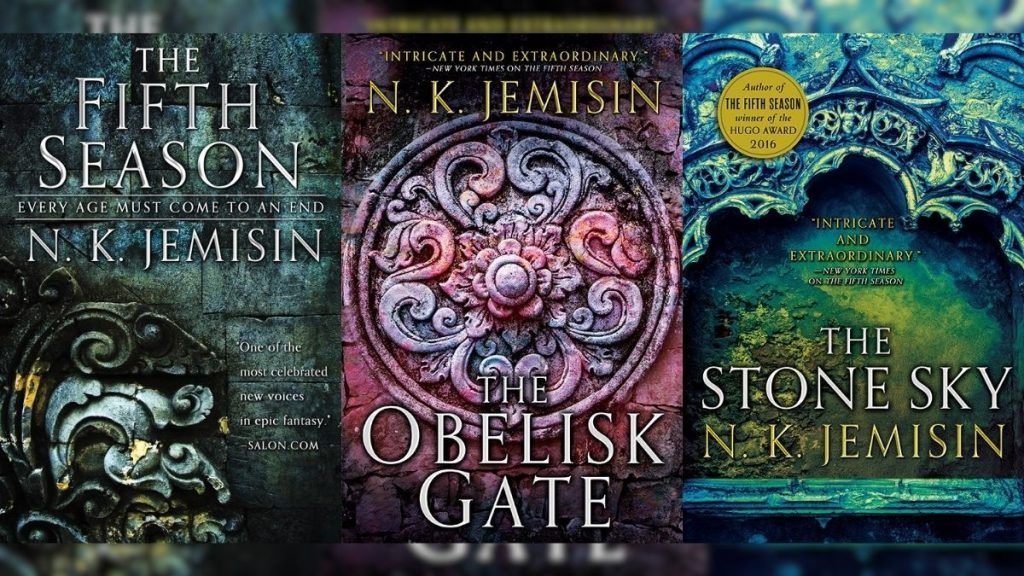
27. Abhorsen Series
- Logline: In a world of necromancy, one family stands against the dead’s return.
- Author Name: Garth Nix
- First Book Published: “Sabriel” (1995)

26. Bartimaeus Trilogy
- Logline: A young magician summons a sarcastic djinni, sparking adventures and political intrigue.
- Author Name: Jonathan Stroud
- First Book Published: “The Amulet of Samarkand” (2003)

25. Night Angel Trilogy
- Logline: An assassin’s path intertwines with dark magic and destiny.
- Author Name: Brent Weeks
- First Book Published: “The Way of Shadows” (2008)
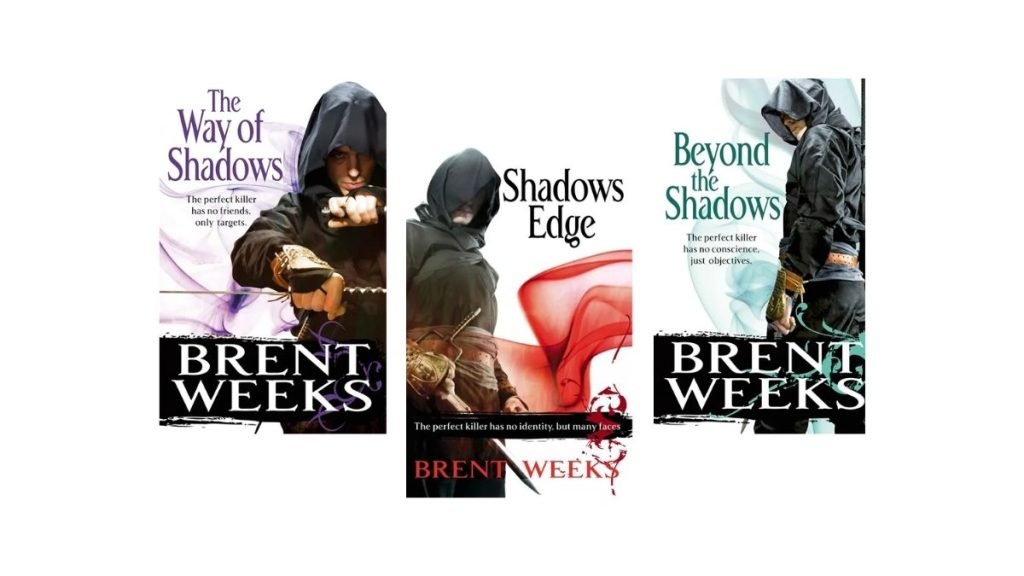
24. Riyria Revelations
- Logline: Two thieves find themselves embroiled in kingdom-wide conspiracies.
- Author Name: Michael J. Sullivan
- First Book Published: “Theft of Swords” (2011)
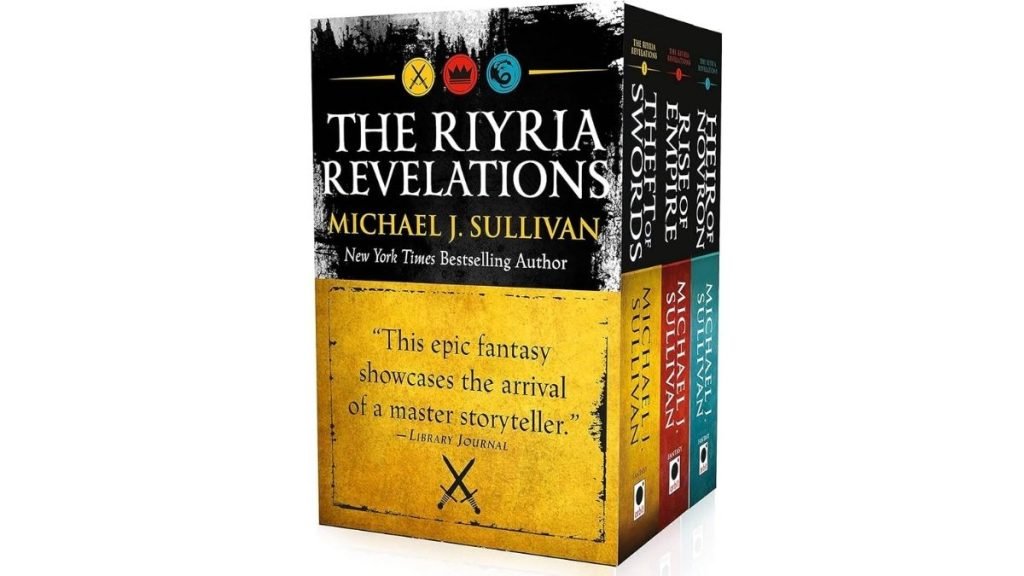
23. Gentleman Bastard
- Logline: Con artists navigate a world of danger, politics, and revenge.
- Author Name: Scott Lynch
- First Book Published: “The Lies of Locke Lamora” (2006)
- Total Books in Series: 3 published, with more planned.
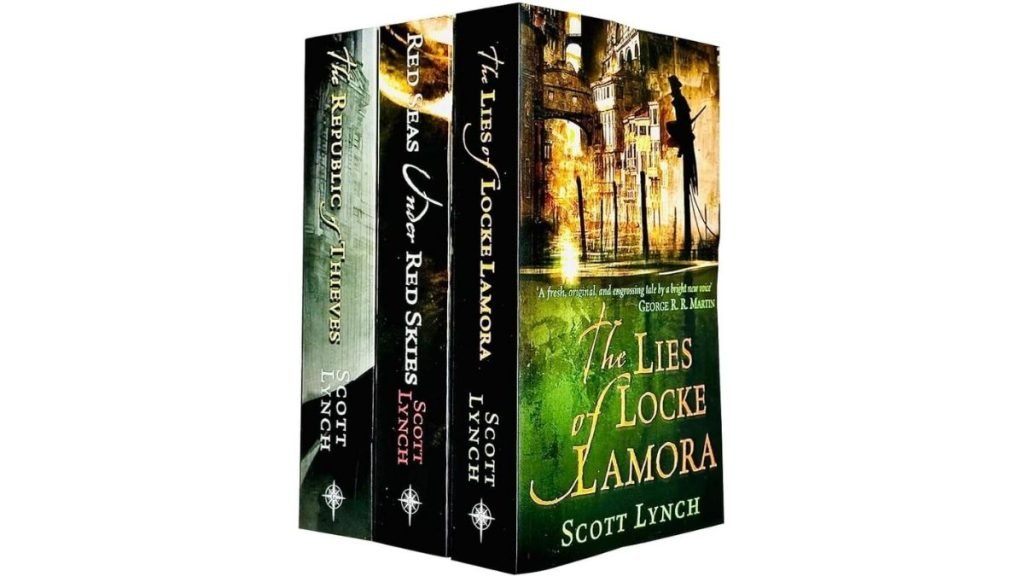
22. The Chronicles of Amber
- Logline: A royal family’s power struggles span parallel worlds.
- Author Name: Roger Zelazny
- First Book Published: “Nine Princes in Amber” (1970)
- Total Books in Series: 10
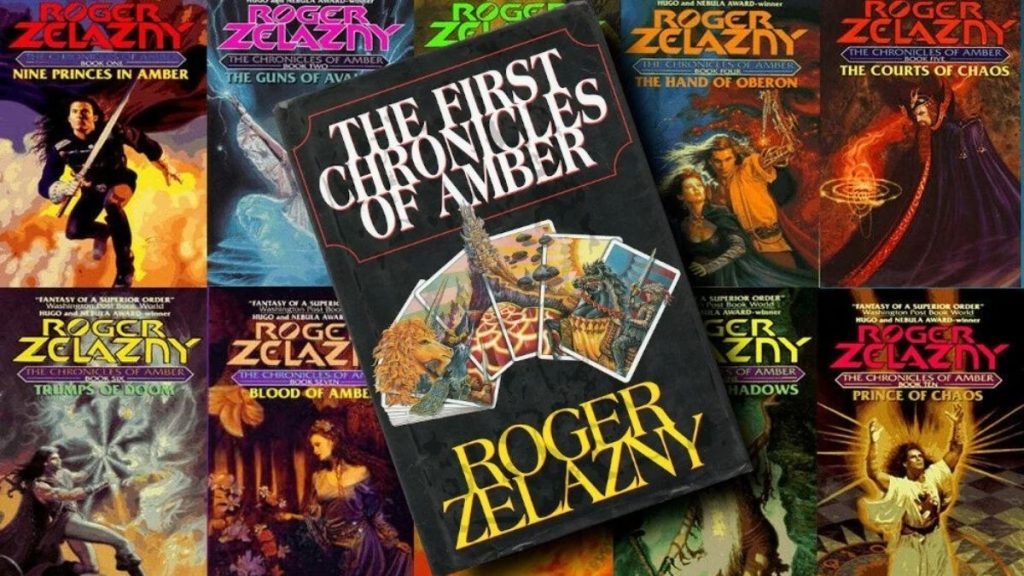
21. The Inheritance Trilogy
- Logline: Gods, mortals, and power dynamics shape a complex world.
- First Book Published: “The Hundred Thousand Kingdoms” (2010)
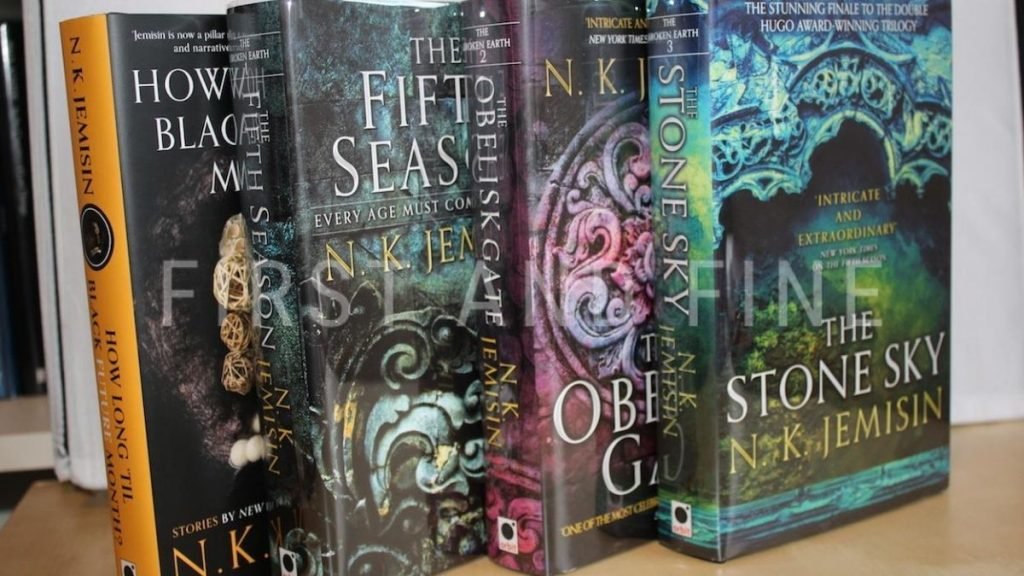
20. The Earthsea Cycle
- Logline: A young wizard’s journey in a world of islands and magic.
- Author Name: Ursula K. Le Guin
- First Book Published: “A Wizard of Earthsea” (1968)

19. The Liveship Traders
- Logline: Sentient ships, sea serpents, and traders’ tales in a rich maritime world.
- Author Name: Robin Hobb
- First Book Published: “Ship of Magic” (1998)
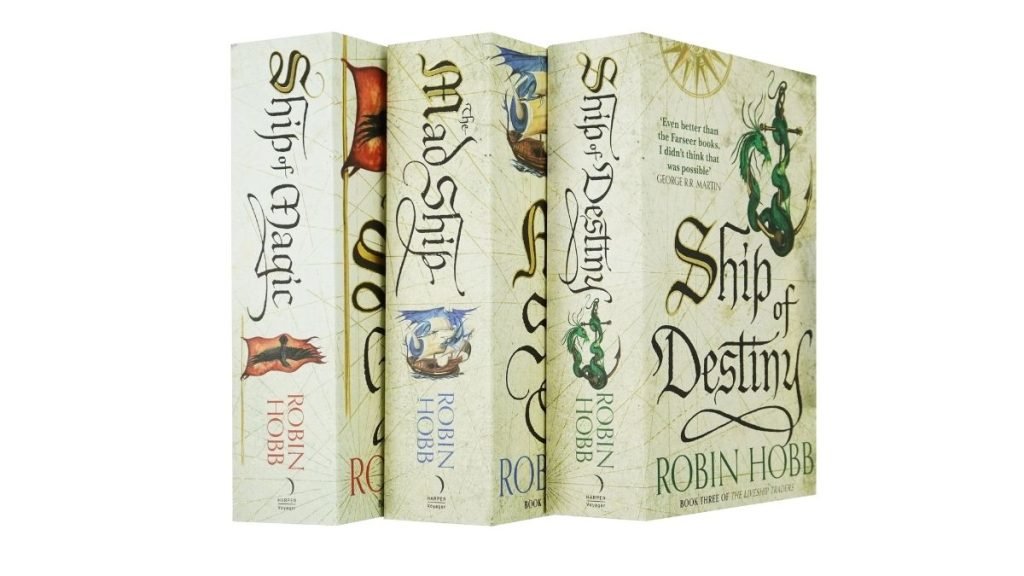
18. The Farseer Trilogy
- Logline: A royal bastard becomes an assassin in a kingdom of intrigue.
- First Book Published: “Assassin’s Apprentice” (1995)
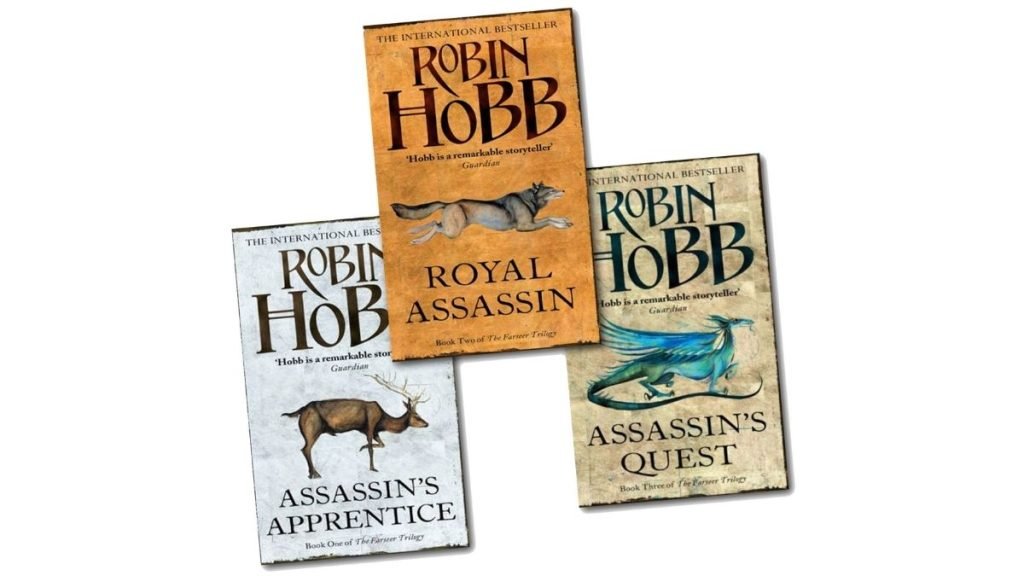
17. Lightbringer Series
- Logline: Magic based on light’s spectrum shapes empires and destinies.
- First Book Published: “The Black Prism” (2010)

16. The Broken Empire
- Logline: A prince’s ruthless journey to power in a post-apocalyptic world.
- First Book Published: “Prince of Thorns” (2011)
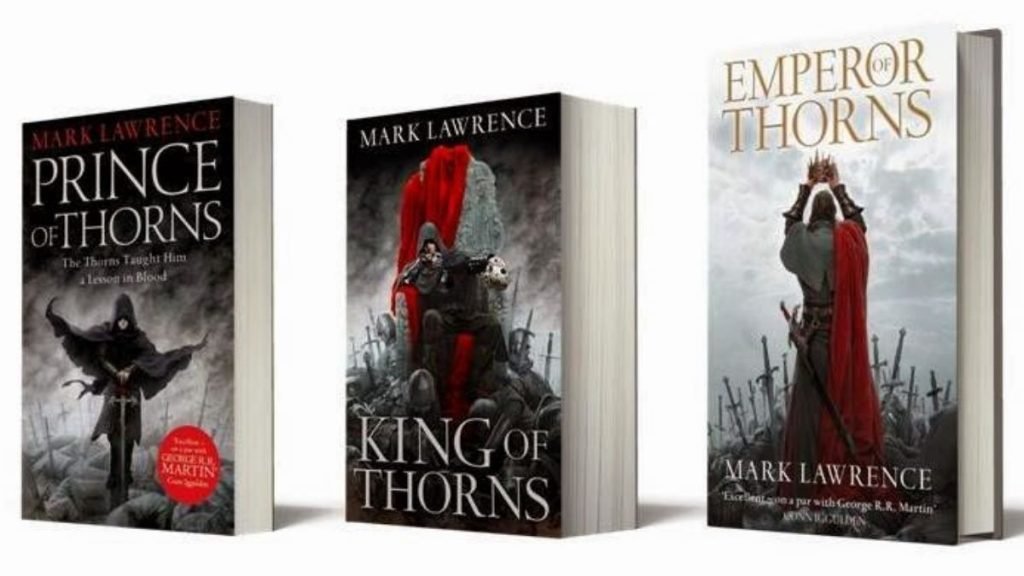
15. The First Law
- Logline: War, magic, and politics collide in a gritty fantasy world.
- Author Name: Joe Abercrombie
- First Book Published: “The Blade Itself” (2006)
- Total Books in Series: 3 main books, with additional standalones and a new trilogy set in the same world.
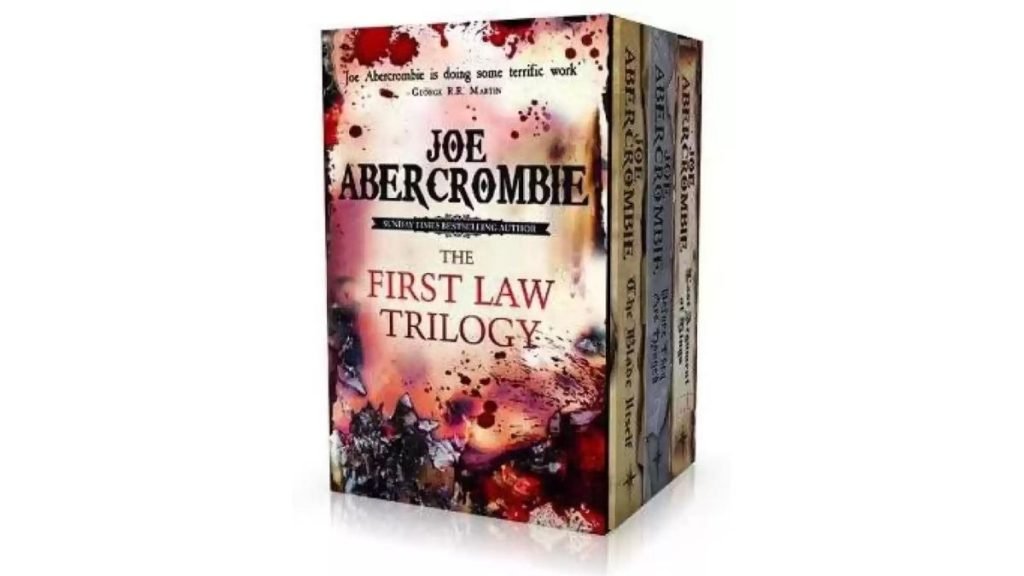
14. Discworld Series
- Logline: A satirical fantasy series set on a flat world balanced on elephants.
- Author Name: Terry Pratchett
- First Book Published: “The Colour of Magic” (1983)
- Total Books in Series: 41
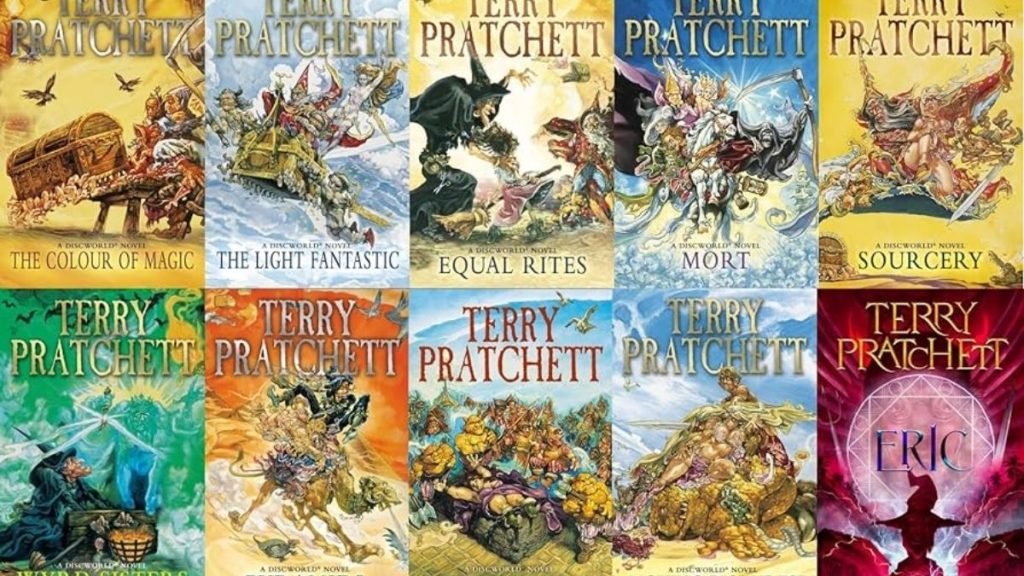
13. The Witcher
- Logline: A monster hunter navigates political intrigue and ancient evils in a war-torn world.
- Author Name: Andrzej Sapkowski
- First Book Published: “The Last Wish” (1993, English translation)
- Total Books in Series: 8 (including short story collections)
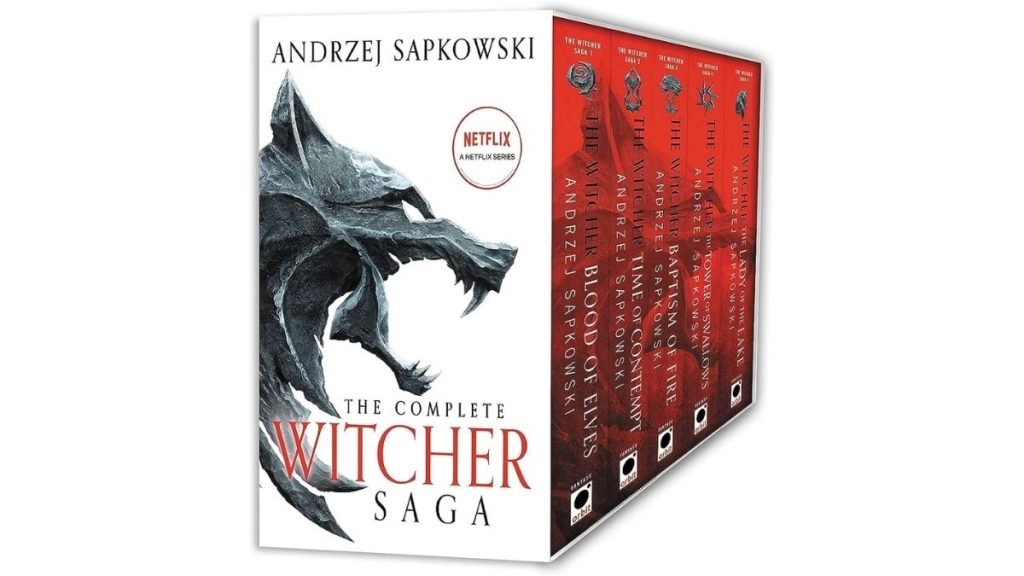
12. His Dark Materials
- Logline: Parallel universes, a powerful substance, and a girl’s journey to understand her destiny.
- Author Name: Philip Pullman
- First Book Published: “Northern Lights” (1995) (Published as “The Golden Compass” in North America)
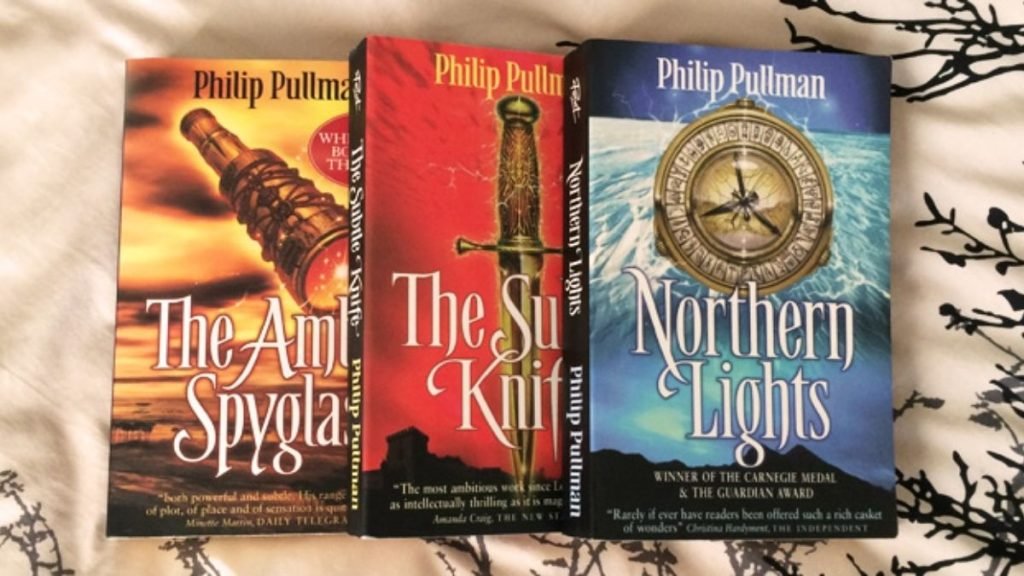
11. The Dark Tower
- Logline: A gunslinger’s quest to reach a mysterious tower in a world blending fantasy and the Old West.
- Author Name: Stephen King
- First Book Published: “The Gunslinger” (1982)
- Total Books in Series: 8

10. The Dresden Files
- Logline: A wizard detective in modern-day Chicago battles supernatural threats.
- First Book Published: “Storm Front” (2000)
- Total Books in Series: 17
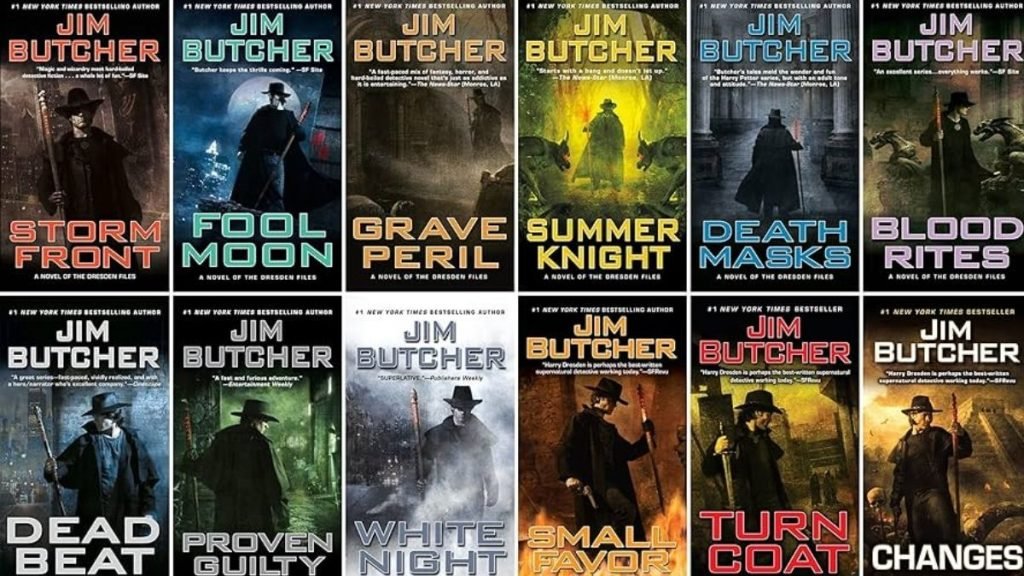
9. The Malazan Book of the Fallen
- Logline: An epic tale of empires, gods, and magic spanning continents and millennia.
- Author Name: Steven Erikson
- First Book Published: “Gardens of the Moon” (1999)
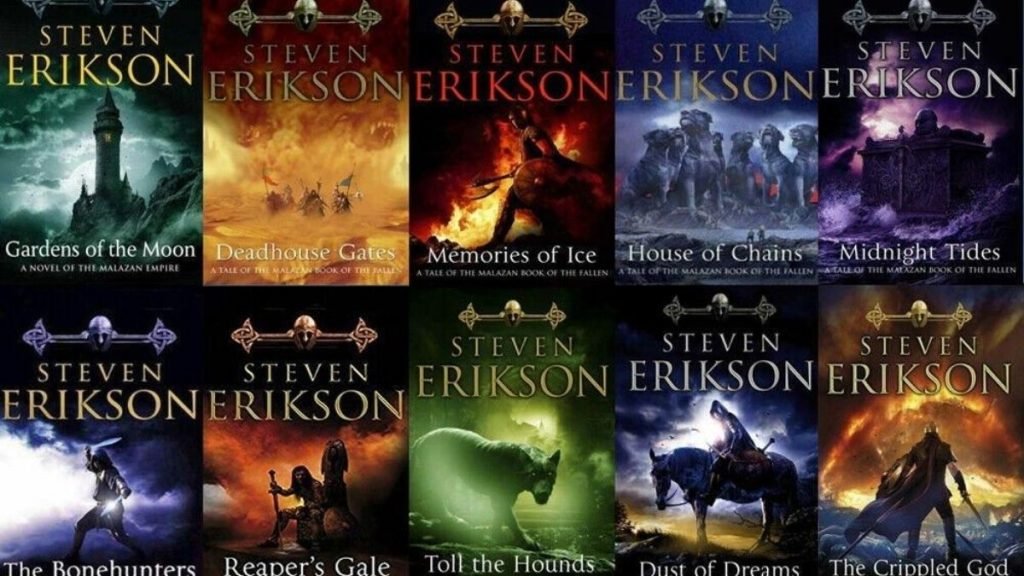
8. The Stormlight Archive
- Logline: Heroes, magic, and ancient evils clash on the storm-ravaged world of Roshar.
- Author Name: Brandon Sanderson
- First Book Published: “The Way of Kings” (2010)
- Total Books in Series: 6 (with more planned)
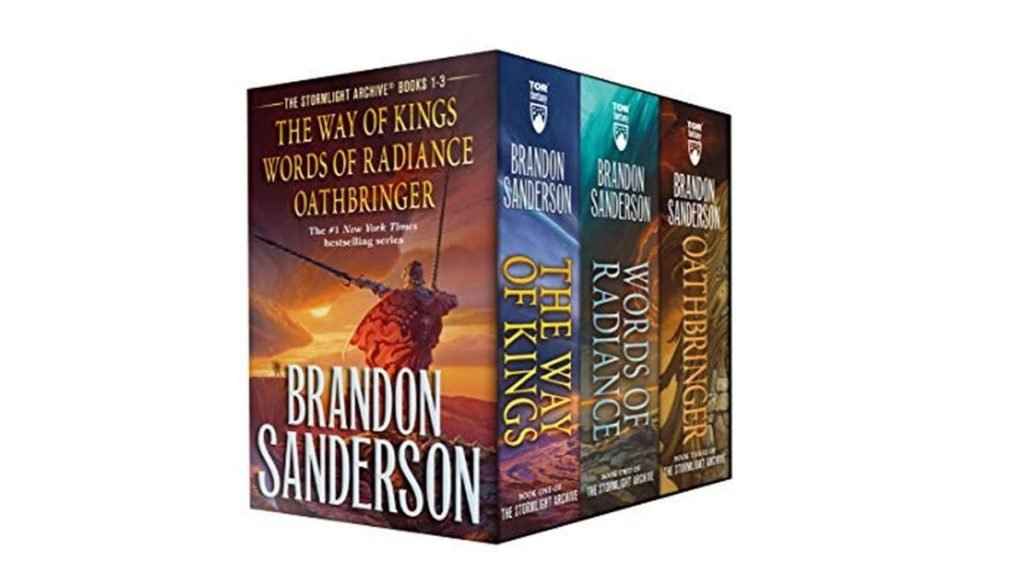
7. Mistborn
- Logline: In a world where ash falls from the sky, rebels aim to overthrow a dark lord.
- First Book Published: “Mistborn: The Final Empire” (2006)
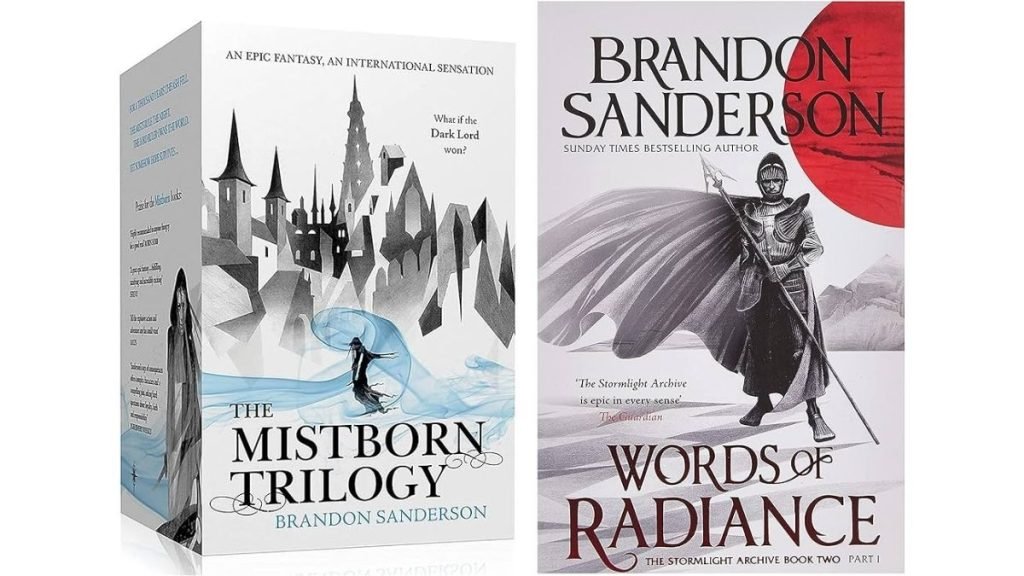
6. The Kingkiller Chronicle
- Logline: A legendary figure recounts his life, from orphaned child to famed magician and adventurer.
- Author Name: Patrick Rothfuss
- First Book Published: “The Name of the Wind” (2007)
- Total Books in Series: 2 main novels (with a third planned)
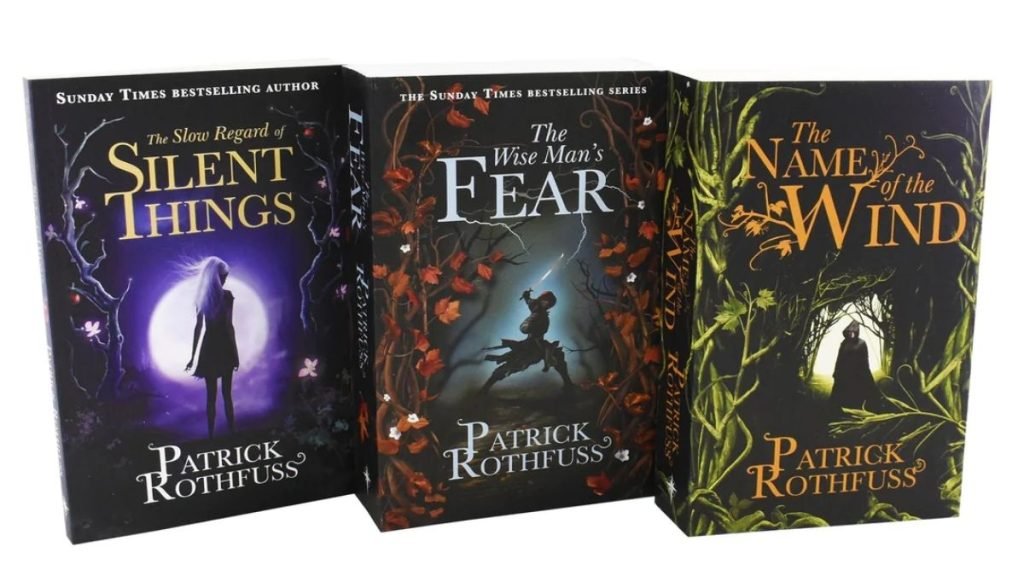
5. The Chronicles of Narnia
- Logline: Children discover a magical land where they battle evil and fulfill prophecies.
- Author Name: C.S. Lewis
- First Book Published: “The Lion, the Witch and the Wardrobe” (1950)
- Total Books in Series: 7
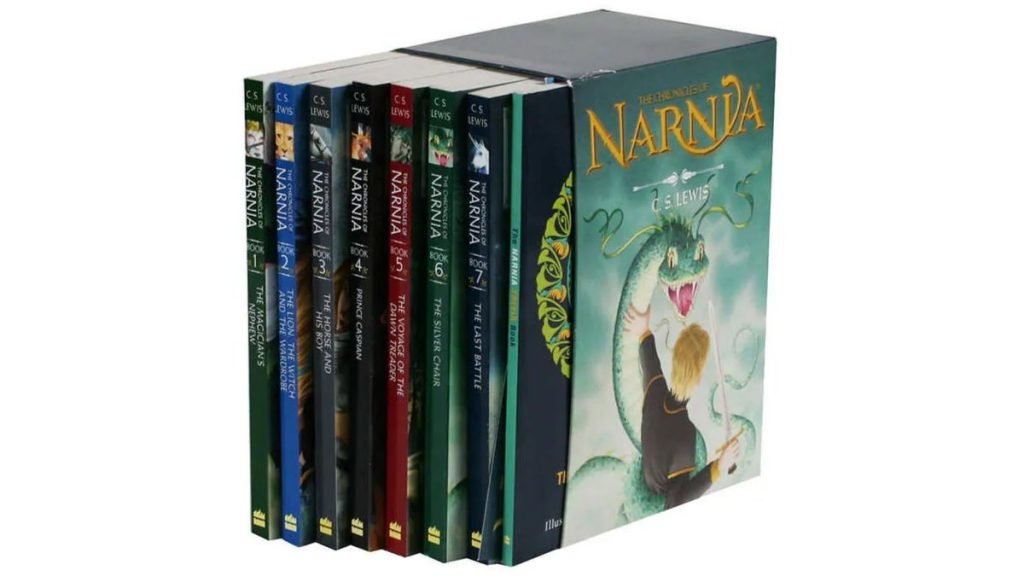
4. The Wheel of Time
- Logline: A destined savior and his allies confront the Dark One in an epic battle of fate.
- Author Name: Robert Jordan (and later Brandon Sanderson)
- First Book Published: “The Eye of the World” (1990)
- Total Books in Series: 14

3. A Song of Ice and Fire
- Logline: Noble houses vie for the Iron Throne in a brutal, intricate game of power.
- Author Name: George R.R. Martin
- First Book Published: “A Game of Thrones” (1996)
- Total Books in Series: 5 published, with 2 more planned.

2. The Lord of the Rings
- Logline: A hobbit’s quest to destroy a powerful ring and defeat the Dark Lord Sauron.
- Author Name: J.R.R. Tolkien
- First Book Published: “The Fellowship of the Ring” (1954)

1. Harry Potter
- Logline: A young wizard battles the dark lord Voldemort while discovering his own destiny.
- Author Name: J.K. Rowling
- First Book Published: “Harry Potter and the Philosopher’s Stone” (1997)
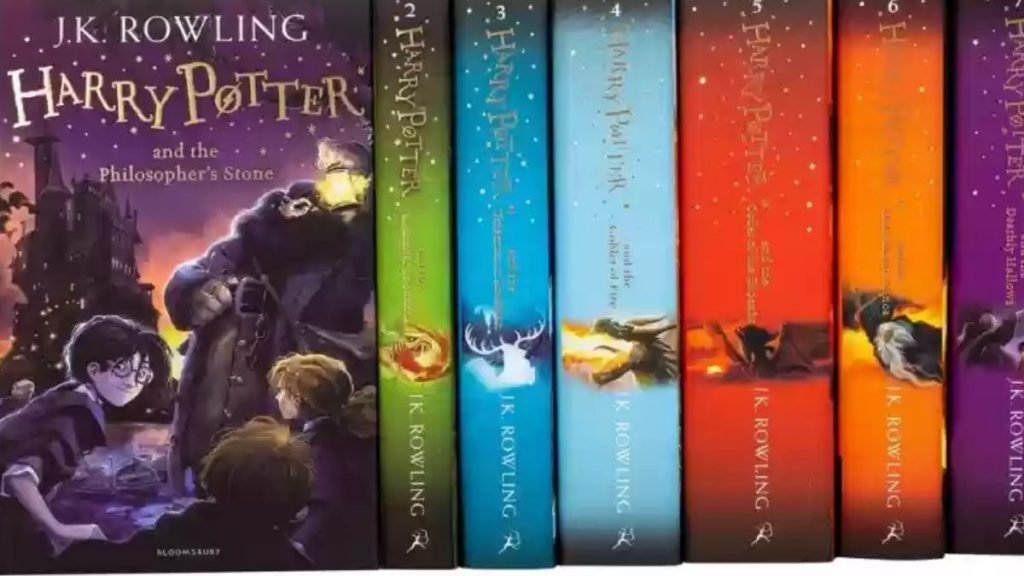
Guide: How to Select the Perfect Fantasy Book Series to Read
With so many captivating worlds, intriguing characters, and epic adventures to explore in the realm of fantasy literature, it can be overwhelming to decide which series to dive into next. Whether you’re a seasoned fantasy reader or just starting your journey, this guide will help you make an informed choice and discover your next favorite read.
1. Know Your Preferences
Before you start your search, it’s essential to understand your reading preferences. Ask yourself these questions:
- Do you prefer high fantasy (complex magical worlds) or low fantasy (magic in a real-world setting)?
- Are you interested in character-driven stories or intricate world-building?
- Do you enjoy epic quests, political intrigue, or a combination of both?
- Is a fast-paced plot or lyrical prose more appealing to you?
Knowing your preferences will help narrow down your choices.
2. Explore Subgenres
Fantasy is a vast genre with numerous subgenres, such as:
- Epic Fantasy : Grand adventures set in expansive worlds.
- Urban Fantasy : Fantasy elements in contemporary urban settings.
- Magical Realism : Fantasy elements seamlessly integrated into the real world.
- Steampunk : A mix of fantasy and technology in Victorian settings.
- Sword and Sorcery : Action-packed tales with sword-wielding heroes.
- Grimdark : Dark and morally complex fantasy.
Exploring these subgenres can lead you to books that align with your specific interests.
3. Read Reviews and Recommendations
Research is your best friend when choosing a book. Look for book reviews and recommendations from trusted sources, including friends, online book communities, and literary websites. Pay attention to reviews that mention elements you enjoy in a fantasy novel, and consider both positive and negative feedback to make an informed decision.
4. Consider Book Length
Fantasy books come in various lengths, from standalone novellas to multi-book epics. Consider how much time you’re willing to invest in a story. If you prefer shorter reads, look for standalone novels or series with manageable book lengths.
FAQs: Common Questions About Choosing Fantasy Books
Q1: Can I start with a classic fantasy book even if I’m new to the genre?
A: Absolutely! Classic fantasy books like “The Hobbit” or “A Song of Ice and Fire” are excellent starting points.
Q2: What if I’m overwhelmed by the sheer number of fantasy books available?
A: Start with recommendations from friends or online communities. It’s a great way to discover hidden gems.
Q3: Are there any fantasy books suitable for young readers?
A: Yes, many fantasy books are suitable for all ages. Look for Young Adult (YA) or Middle Grade fantasy novels.
Q4: How can I find diverse and inclusive fantasy books?
A: Seek out book lists and recommendations that focus on diversity and inclusivity in literature. There are many excellent options available.
Selecting the perfect fantasy book to read is an adventure in itself. By understanding your preferences, exploring subgenres, reading reviews, and considering factors like book length and series status, you can make an informed choice and embark on a literary journey that will transport you to magical realms and unforgettable adventures. Happy reading!
Rajat Mehta
Meet Rajat, the coolest cat at The Serial Binger! This writer is all about that Manga/Manhwa and Book life. With an unbreakable love for the lovely stories, Rajat hooks readers up with the freshest and mind-blowing updates. Get ready to groove and geek out with Rajat's funky articles!
Recommended Articles

20 Highly Acclaimed Authors Like Colleen Hoover to Explore
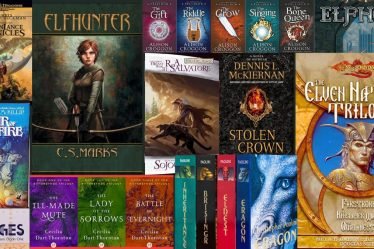
20 Fantastic Book Series with Elves in Main Roles: MUST READ

15 Highly Acclaimed Authors Like Lee Child to Explore
- How-To Guides
How to Write a Fantasy Novel in 12 Steps
Escape the chains of the real world, and jump straight into fantasy story-telling. Fantasy novels push the limits of your imagination – Taking on new worlds, creatures and magic. In this guide, we’ll show you how to write a fantasy novel in 12 steps.
As a writer, the fantasy genre can be very exciting. It presents writers with the opportunity to create their own rules, explore new worlds, and discover magic of all sorts – The only limit is your own imagination! However, the job of a fantasy writer is not always an easy one. In fact, fantasy novels can be more difficult to write than non-fantasy or factual based books. The simple reason is that fantasy stories require more planning and research to make them ‘believable’ to readers. We put the word, believable in quotes because most readers know that magical elements like dragons don’t exist in the real world. But your task as a fantasy writer is to make them believe in magic and things beyond logic.
You might also find this guide on how to write a story for children useful.
What is the Fantasy Genre?
1. read the work of others, 2. know your readers, 3. stick to your idea, 4. create a descriptive world, 5. beware of too much description, 6. write down the rules, 7. do your research, 8. add real-world elements, 9. create relatable characters, 10. do the unexpected, 1. think of a unique idea, 2. outline your idea, 3. develop your characters, 4. develop your world, 5. write the starting paragraph, 6. write the first chapter, 7. develop the climax, 8. write the remaining chapters, 9. write the ending, 10. self-edit your novel, 11. title your fantasy novel, 12. publish your novel, how do you start a fantasy novel, what are the steps to writing a fantasy novel, what makes a great fantasy novel, what should you not do in a fantasy novel, how do you write the first chapter of a fantasy novel.
The fantasy genre contains an element of magic or make-believe. Think of witches, wizards, magical wardrobes, dragons and faraway kingdoms. Fantasy novels contain elements of fiction, as opposed to factual elements. The most popular fantasy series of all time is Harry Potter. Other examples include Lord of the Rings, The Chronicles of Narnia and The Mortal Instruments. The fantasy genre can be split into many sub-genres including:
- Epic Fantasy: This genre is set in a fictional world. Here the characters and even the plot would include high elements of magic or fantasy.
- Urban Fantasy: The novel is set in an urban setting and normally in the present day.
- YA Fantasy: These are fantasy novels targeting readers between the ages of 12 to 18.
- Fantasy Romance: This is a romantic story between characters which combines elements of magic or fantasy.
- Historial Fantasy: The novel here is set in past historical periods, such as the pre-19th century.
- Dark Fantasy: This is a type of fantasy that combines horror and frightening themes, along with magical elements.
- Sci-Fi Fantasy: This is a combination of science-fiction or reasonable logic, along with fantasy or make-believe elements.
- Low Fantasy: These stories are set in the real world, but with a small magical twist.
10 Tips For Writing A Fantasy Novel
Before you jump straight into planning your fantasy novel, here are 10 tips for writing a fantasy novel:
Before you delve into the world of fantasy writing, take time to read popular fantasy books and stories. Don’t just read them, understand them. Think about all the story elements that make them great and the elements that are not-so-great. Better yet, write down your own book review for each fantasy novel you read. Make notes of things you find interesting. You could even use sticky notes to bookmark pages that you would like to revisit later on. During your book review, pay attention to how the author introduces characters, describes the world and how the major conflict is dealt with.
Our advice is to read as many fantasy novels as you can before writing your own. Not only does this help you with coming up with a great story idea, but it can also help you become a great writer too.
Who are you writing for? It is extremely important to know who your audience is. Knowing your target audience guides your writing style, idea generation, language choice and even choice of characters and setting. Think about the age of your target audience – Are they children, young adults or grown-ups? A younger audience may relate to a simpler story idea and main characters who are also young. While a grown-up audience would expect plot twists, big build-ups to the conflict and an older main character to relate to.
Another aspect of knowing your readers is thinking about the sub-genre of fantasy you want to write about. Which sub-genre would be most popular with your target audience? At this point, you will need to think about the interests of your potential readers. If you readers love scary stuff, then dark fantasy is a good sub-genre to take on. While a romantic fantasy tale would go well with teens or grown-ups interested in love and romance.
Imaginations can run wild, especially when thinking about fantasy worlds. Make sure you stick to your original story idea throughout the novel. It is easy to get side-tracked by secondary characters or minor conflicts you develop. But your focus should always be on the main character and their role in the story. While secondary characters can have their own problems, their main role should always relate back to your original plot idea.
Know your fantasy world inside and out. Whether your entire world is make-believe or you just added elements of magic on Earth – A detailed description of the world is required. If your story is set on present-day Earth, then think about how magic has changed the world (see our guide on how to write a magic system ). And if the story is in a fictional world, then describe this world in detail from its climate to its currency , language and even way of life. You might not need to include all this information directly in the story, but it will definitely help you create a believable world during the planning phase.
An extra tip is to use the five senses technique to describe this world (see, hear, feel, taste and smell). This will help you go beyond the physical appearance of the world into a deeper, more meaningful world description. Check out this list of 112+ world-building questions to help you create a realistic fantasy world.
It’s perfectly fine to create detailed descriptions of the setting and characters in the planning phase. However, when it comes to the actual fantasy novel, try to avoid cramming too much description into one page or a section of the story. This could be off-putting to readers and even boring to read. Instead, try to provide subtle hints of the world the characters live in and leave the rest up to the imagination of your readers.
Fantasy worlds normally run by their own rules. Whether this is a faraway kingdom with rules created by a vile king or a new set of rules for particular people on Earth. Common rules may relate to the use of magic, money or currency and even how people live their lives. Rules can also be the source of conflict in many fantasy stories. As a writer, it is important to write down the rules of your fantasy world and stick to these throughout the story.
Just because you’re making stuff up, doesn’t mean no research is required. If you want to create a believable fantasy tale, you’ll need to do your research on how things work in your fantasy world. Common mistakes fantasy writers make are mixing up titles and classes in characters. For example, a necromancer mage is very different from a mage who specialises in illusions. You might not think this is important, but fans of the fantasy genre will know the difference. And so creating a fantasy novel with incorrect details can be extremely detrimental to its success.
Another example is explaining the logic behind magical powers and abilities. Of course, you can’t know for sure how magical powers work. But you should at least create a near-realistic back story to these. For example in an underwater kingdom, how do the humans that live here survive? Doing your research, you might think the humans are actually merpeople with fins and gills that help them breathe underwater. Alternatively, a magical source or outer-world technology helps them survive there.
No fantasy novel is 100% fantasy. There are always elements of realism or facts that people in the real world can relate to. The level of realism can vary greatly in fantasy stories. In epic fantasy stories, real-world elements are subtle. While in low fantasy stories real-world elements are at the centre of the plot and are more obvious. The common types of real-world elements in fantasy novels include character personality traits, technology use, and even real-world problems. Just imagine a wizard with social anxiety issues or a plumber who discovers a magical toolbox.
No one’s perfect and neither should your characters be. When developing characters the most important thing to consider is their flaws. What mistakes have they made? What do they fear? And what are their weak points? Knowing the answers to these questions is what makes your characters believable and relatable. At this point, it is a good idea to think about real-world problems that your readers might face. For example, depression, social anxiety, eating disorders, and poverty are all examples of problems in the real world. These problems could be the main source of conflict in your fantasy novel, along with a magical twist.
The fantasy genre is great for including unexpected plot twists. Think outside the box and try doing the opposite of what your readers might expect. Don’t be scared of introducing new characters mid-way through your story or even at the end. Think about the magical elements, how far can you push these? What is the full capability of your main character? By throwing in unexpected plot twists and elements, you can keep your novel interesting and even make room for more novels in your fantasy series.
How to Write a Fantasy Novel Step-By-Step
Learn how to write a great fantasy novel in just 12 easy steps:
Behind every great fantasy novel is a spectacular idea. The idea doesn’t need to be anything 100% new or original. You could simply take a basic idea from your favourite book or movie, and add your own elements to it making it unique. But be careful not to copy or plagiarise another author’s work!
Here are some examples of fantasy story ideas you could use or adapt:
- A boy discovers he is related to the dark lord of the underworld.
- An antique collector comes across a magical mirror from another world.
- A dark elf falls in love with a fairy against all the odds.
You can also view our post on 70+ fantasy writing prompts for more ideas.
As you can see most story ideas, include a character and a problem or goal that they want to achieve. Try using the simple jigsaw method for idea generation which involves, the who, want and why not.
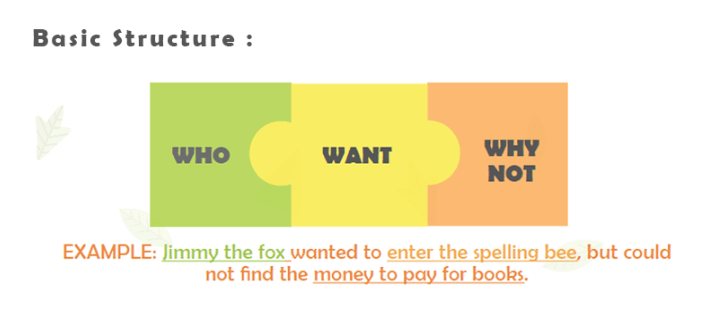
Each piece of the puzzle is explained below:
- Who: Who is your character?
- Want: What does your character want?
- Why not: Why can’t your character get what they want?
Once you have your idea written down the next step is to outline this book idea . The purpose of this step is to expand your idea into a couple of paragraphs. These paragraphs should be divided into the beginning, middle and ending of your story. You can also include notes on your novel’s major conflict, along with any plot twists you plan on including.
There are many techniques you can use for outlining stories, such as:
- Snowflake Method
- Story Mountain Templates
- Scene Lists
- Storyboarding
Ideally, by the end of this step, you should have a chapter-by-chapter outline or plan for your novel or chapter book .
Characters are an important element in all stories. For this reason, you should focus on your characters separately. Developing your character involves two key steps. First, you should list out the main characters in your story, along with their role in the story. Next, you should create a detailed character profile for each one.
A detailed character profile includes information about name, age, occupation, values, goals, fears, wants and so on. The purpose of a character profile is to make sure your character is consistent with their beliefs throughout the story. Of course, the hero of your character will change and develop as the story progresses, but their core beliefs should remain the same. See our guide on the hero’s journey for more information.
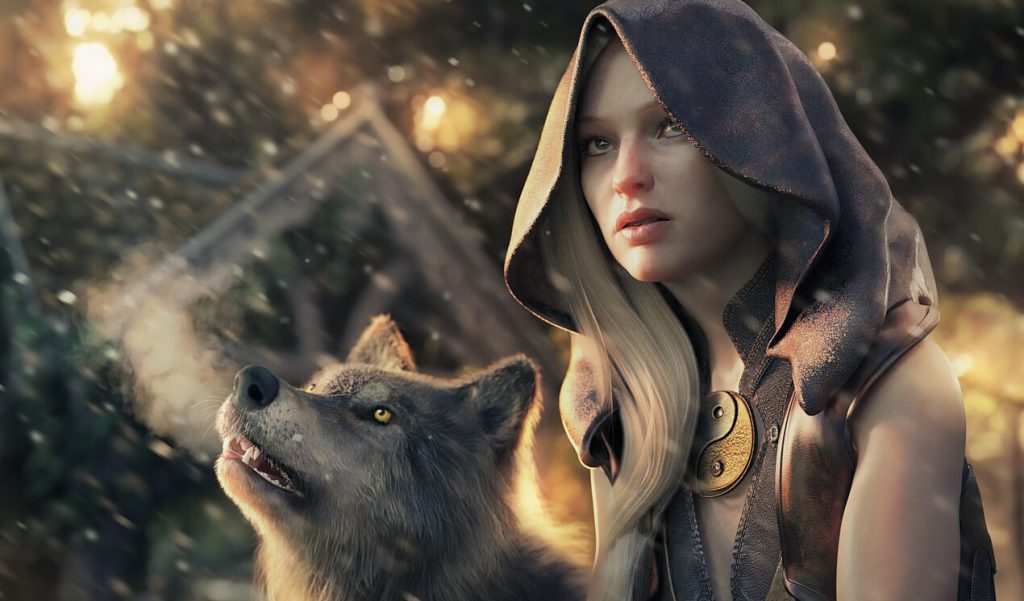
You might be interested in this fantasy name generator for some character ideas.
World-building is an important activity for fantasy writers, especially those writing about a fictional world. When developing a world, you should think about the following elements:
- Climate (see fantasy weather generator )
- Native Language
- Rules / Laws
- Important buildings
- Tourist Attractions
These elements will help bring your fictional world to life, and make it more believable when you write about it in your novel. It is a good idea to keep a detailed world description sheet or document that you can refer to when writing your novel – This can help you stay consistent throughout the story.
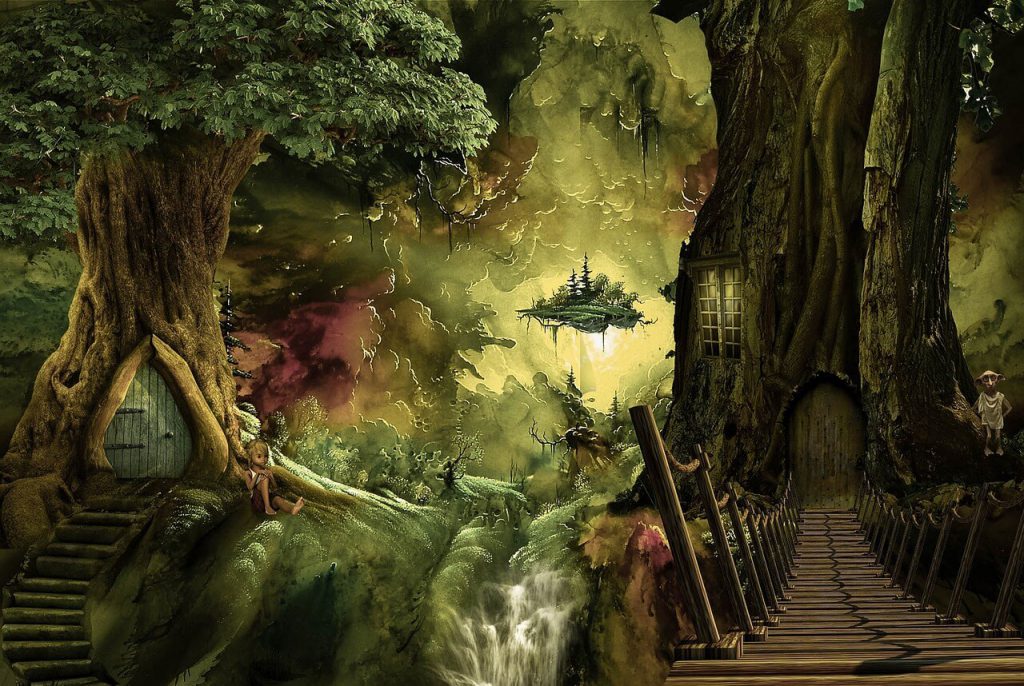
Take a look at this fantasy world name generator for some inspirational world name ideas.
Think about how you will start your fantasy novel. More specifically focus on the opening line or starting paragraph. Do you start with a question or an interesting fact about the fantasy world? Will you start with a conflict or action scene? If you plan on starting with a conflict, make sure this is a minor conflict, so the readers can look forward to a bigger conflict later on in the story. A good starting paragraph is a difference between hooking your readers and putting them off, so make sure it’s a good one.
The first chapter of a fantasy novel normally introduces the main character, provides a description of the setting and provides a hint towards the possible main conflict. With this in mind make sure your first chapter is clear and concise. Do not ramble on too much about the exact details of the setting, or the main character’s every single flaw, weakness and goal. Be careful about the information you give your readers. You want to give them a hint to keep them hooked and keep the best secrets until the near end of the novel.
The climax is the point when the main conflict occurs. This is likely past the middle point of your novel and perhaps towards the end. You might be wondering why did we jump from the first chapter all the way to the climax? Simply because the first few chapters can be cumbersome or tiring for writers. To keep things interesting and to give yourself a goal, we suggest developing the conflict scene or chapter towards the beginning of your novel writing journey. Don’t worry you don’t need to have a set-in-stone chapter written, just an outline of the climax or main conflict in your story will do.
It’s time to fill in some blanks. You got your first chapter written, and you got a detailed outline of your climax chapter. Now go back and work on the remaining chapters. If you’re struggling with your chapters, then try outlining or planning each one before you actually write it. An outline is a great way to keep you on track, and can even act as a motivation tool to complete each chapter.
You made it! Your fantasy novel is almost complete, you just need a great ending to satisfy your readers. Most fantasy novels come in trilogies or in a series. If you plan on writing more parts to your novel in the future, then the best ending is a cliffhanger or an open ending. A cliffhanger ending leaves a certain conflict still in the mist, as the main conflict is resolved. Resolution is important in all novels. If nothing is resolved, then the whole novel could be a waste of time for you and your readers.
A resolution could come in many forms, such as a solution or part-solution to the main conflict or the main character learning something important at the end. Think about how your fantasy novel will end. Will it be a happy, sad or cliffhanger ending?
Your novel is complete! Celebrate and rejoice, you just completed the hardest thing for any author. Now go back and read through each chapter of your fantasy novel. Be a critic in your own mind. Question your own word choices, dialogue and descriptions. How could you make this paragroup sound more interesting? How could you explain this concept better? Could you add more plot twists?
Don’t be afraid of sharing your draft work with friends, family, teachers or colleagues for their feedback. You could even create a questionnaire to help get valuable feedback from others on your draft novel. An extra tip, we recommend when self-editing is to take a break from your novel. Come back to it in a month with a fresh pair of eyes, so you can be a fair critic of yourself.
The title of your fantasy novel may be the single most important thing you do. After all, before a reader even reads your book, the title, along with the book cover is the first thing that will entice them. Make sure your book title is short, descriptive and relates to your core story idea. Avoid using fancy words, just because they sound cool. Instead, keep it true to the meaning of your novel. Just take a look at this example: Harry Potter and the Goblet of Fire – It summarises the whole book in just 7 words!
You can use our fantasy book title generator for some ideas on how to title your novel.
Now you have a beautifully complete fantasy novel. It’s time to publish it. At this point, you have many options. You can publish your book online using a tool like Imagine Forest – Which is great for kids and young writers. From there you can share it with friends and family and build your fanbase online. Alternatively, you can self-publish your novel professionally on Amazon or take the traditional route by working with professional book publishers.
That’s it! 12 steps later and your fantasy novel is complete!
Common Questions About Fantasy Novels Writing
There are a number of ways to start your fantasy novel, including the following:
- A detailed description of the world.
- An interesting fact about culture.
- A question to the audience.
- Minor conflict or action scene.
- Secondary character dialogue.
- A dream sequence.
- A past memory.
- The death of a character
Try to come up with a unique and powerful way to start your novel. Remember the goal is to hook your readers so they keep on reading until the very end.
There are 12 steps for writing a fantasy novel:
- Think of an idea
- Outline your idea
- Develop your characters
- Develop your world
- Write the starting paragraph
- Write the first chapter
- Develop the climax
- Write the remaining chapters
- Write the ending
- Self-edit your novel
- Title your novel
- Publish your novel
The key to writing a great fantasy novel is creating believable and relatable characters. You can include all the magical elements you want, but your characters must be realistic. Realistic characters have flaws, weaknesses and dreams. Their problems are just like your problems in the real world. To help you create relatable characters think about your own fears, dreams and wants, and incorporate them into your main characters.
Here is a list of 10 mistakes that most fantasy writers make:
- Writing down too much detail about the world.
- Creating perfect characters with little or no flaws.
- Including too many action scenes, with no purpose.
- Creating stereotypical, flat characters.
- Introducing too many characters at once.
- Not doing your research.
- Neglecting the opening line.
- Including terrible dialogue.
- Using technical terms without meaning
- Creating an ending with no resolution.
Before you write the first chapter in your fantasy novel, plan the chapter. Note down what you plan on including, the overall purpose of the chapter, and the key scenes within the chapter. This outline will help guide you when it comes to writing the first chapter of your novel. Typically in fantasy novels, the first chapter includes an introduction to the main character, a setting description, and a small build-up to the main conflict.
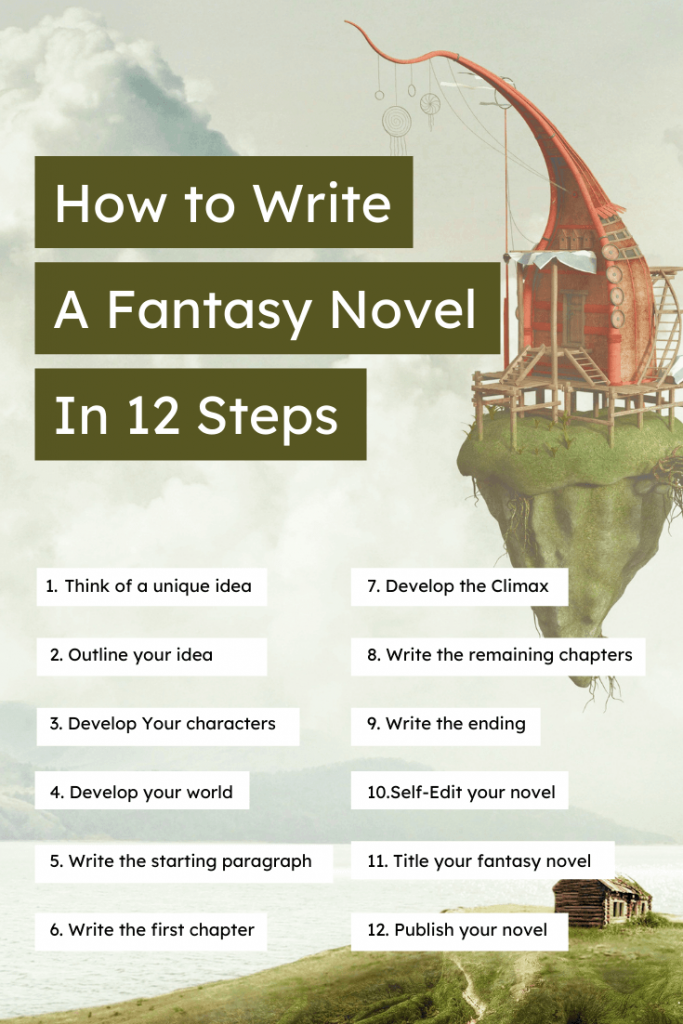
Marty the wizard is the master of Imagine Forest. When he's not reading a ton of books or writing some of his own tales, he loves to be surrounded by the magical creatures that live in Imagine Forest. While living in his tree house he has devoted his time to helping children around the world with their writing skills and creativity.
Related Posts
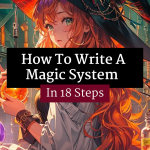
Comments loading...

The Ultimate Guide To Writing A Fantasy Novel
You just finished reading a fantasy series that has left you reeling.
You’re satisfied with the way things turned out, but the thought of saying goodbye to those characters just hurts.
You want to keep the magic going.
So now you’re looking for the best guide on how to write a fantasy novel — because you want to be the kind of writer who can work that kind of magic.
Who knew fantasy fiction could be so transformative?
Fantasy Writing Tips
Fantasy plots, how to write a fantasy novel outline, how to start a fantasy story, 1. develop your characters., 2. develop your (story’s) world., 3. develop your backstory., 4. craft an interesting and believable plot for your characters., 5. decide how your story will begin., 6. write the first chapter., 7. decide on your story’s climactic event., 8. keep writing chapters until you reach the end., 9. print out your first draft and take a break., 10. self-edit., 11. revise your self-edited draft., 12. edit your draft., 13. revise your professionally-edited draft., 14. get your novel ready for publication., writing fantasy.
Writing a fantasy novel presents some unique challenges to the storyteller. For one, you’re expected to know about the magical elements you use in your story.

For example, if your story involves werewolves or vampires, you’ll need to research all the folklore related to both in order to portray them in a way that will build trust with your reader.
Making things up as you go when there’s already known folklore or mythology in place will irritate knowledgeable readers and likely earn you some scathing reviews.
Second, fantasy fiction usually involves an imaginary world created by the author.
Research is important here, too, since some magical creatures are associated with particular environments.
And just because it’s a made-up world doesn’t mean you have to defy every expectation.
The sky doesn’t have to be a different color unless that detail adds an essential something to your story.
But you should know this world as well as the one you live in (when you’re not writing).
Also, some — if not all — your fantasy characters will be magical or mythical beings, humanoid or otherwise.
And the more you know the mythology surrounding them, the more convincing your character building will be to your readers.
As with your setting, you should know these characters as well as you know the people in your closest circle — recognizing all the while, of course, that they can still surprise you.
If you want to know how to write a good fantasy story, learn from those who’ve written before you.
Many of them are only too happy to help fellow writers with their story crafting.
For all they know, you could be the next Rick Riordan or J.K. Rowling.
So, helping you write better stories is in everyone’s best interests. To that end, consider the following tips for writing a fantasy novel:
- Become a voracious reader of fantasy novels — especially the kind you want to write.
- Research the folklore and mythology related to any magical elements you want in your story.
- Research potential markets and marketing strategies for your book based on genres that are currently selling well.
- Choose the perspective and point of view for your story’s narrator.
- Get into your fantasy characters’ heads.
- Sketch out a timeline for your story’s events and key moments.
- Get acquainted with every detail of the made-up world where your story happens.
As one of the ten key parts of your story , your plot is what gives your story its overall shape and direction.
To more clearly see how it does this, we can follow Gustav Freytag’s lead and break down your plot into the following five elements:
With fantasy plots, these elements often tie into the stages of the hero’s journey — a universal story structure based on Joseph Campbell’s monomyth.
It’s because the hero archetype resonates within the psyche of every individual that the most memorable and endearing stories follow this structure.
Check out this Authority Pub post for more information on the ten key parts of writing your story.
And read on to learn how to write one of your own.
How to Write A Fantasy Novel
The writer’s journey in writing a book is similar to the hero’s journey just mentioned.

Like the hero in your story, you’re going on a journey of your own — though at first there’s some reticence to go any deeper than your comfort level will allow.
At some point, though, like Bilbo as he listened to the dwarves’ song about the Lonely Mountains, you feel pulled out of your cozy bubble into a new and sometimes terrifying world.
And, like Bilbo, you find you have more courage in you than you thought you had.
Good thing, too. Writing an unforgettable story takes courage. No one breaks new ground when they don’t venture beyond what they know.
Outlining your fantasy novel will be similar to any outline you’ve created in the past — for other books or your English Lit class.
The key difference here is thinking ahead to determine whether or not your fantasy book will be a standalone or part of a trilogy or tetralogy.
If your book is standalone, you will need to compress the introduction of your characters and the fantasy world you create to fit into one book. So consider this when developing your outline.
For a series, you’ll have more time to unravel your characters and develop the magical world in which they reside.
You don’t have to outline all of your books initially, but if you choose a series, just be sure you leave enough action and character development for future books.
Try to think ahead about plot progression and the struggles your characters will face throughout the series.
Either way, your first book is the key to hooking readers into loving your characters and story and wanting more.
In your outline, be sure you include a cliffhanger at the end to ensure your readers can’t wait to buy the next book.
Getting started looks different for everyone. If you’re a plotter, you know that an outline helps you sort out your ideas so you can tackle the actual writing with a clearer head — one idea at a time.
See this Authority Pub post for more information on getting started with your novel.
If you’re a pantser, you might think outlines are “too stodgy” or that you won’t follow it anyway.
But even writing a bulleted list of the main things you want to happen in your story can help you write with a better sense of direction.
The following tips and questions can help you create an outline that comes to life even before you start writing your story:
- Interview your fantasy characters. Get to know them at their deepest level so you can speak and act as they would.
- Get clear on your character’s arcs. How will the events in this story change them?
- Give old tropes a dash of something new . Think of how J.K. Rowling reinvented the witch’s broomstick.
- Get clear on your story’s main events and defining moments.
- Write a draft of the final chapter — detailing the outcome for each character.
Think of this step as simply jotting down the main elements of the plot or character that made you want to write this story in the first place.
You can also start with an elevator pitch. Tell me what will happen in your story in 30 seconds or less.
See if it makes sense to you when you articulate it out loud.
Then, nail down those critical details and leave the rest to your imagination.
How to Write A Fantasy Novel Step by Step
Once you’ve created your outline, follow these steps to write a fantasy novel your readers will tell all their friends about:
Interview them. Do some voice-journaling for them. Create character profiles.
Do whatever helps you get into their heads and make them real people to you.
The more they come to life for you, the more they’ll do the same for your reader.
The more real this world seems to you, the more easily your readers will step into and lose themselves in it.
Make it a place they won’t want to leave. And make every detail matter.
What made your characters and your world as they are now? What details from the past are essential to the story you’re telling.
Get clear on what happened in the past that created the reality of your story’s present.
Give them a problem and show how they recognize and deal with it. Show how it changes them. Show us what they want most and how far they’ll go to get it.
Show what’s at stake – what they could gain and what they have to lose.
More Related Articles
Want To Write A Murder Mystery? Here’s How
12 Effective Tips On How To Write Faster
Character Development: How To Make Your Book Characters Unforgettable
What inciting event will challenge your main character? What will your main character reveal in the first minute?

What will pull your reader right into the heart of your story and make them want to stick around?
You have to start somewhere. Sometimes, the only way to get started on your story is to just start writing and see what comes out?
Maybe that’ll be your first chapter. Or maybe it’ll be your prologue (we don’t hate those, but they do have to earn their place).
If you don’t have a clear idea of your book’s climax, at least work on a vague idea until it becomes clearer or moves aside for something better.
You can either write these as a pantser or start with a bullet-point list of the main things that should happen.
I mean it. Take a break from your book baby. I know it’s hard, but you need this. And you’ve earned it.
Go through it with a red pen and make corrections, write down comments and ideas, and generally bleed all over it.
Sometimes, it hurts. Sometimes, it’s so much fun, you’ll forget to eat. Bring snacks.
Make the necessary changes to your story and rewrite what needs to be rewritten. Then take a shorter break and go over it again.
At this point, it’s best (for your story and your readers) to find a professional editor — preferably one with experience editing fantasy fiction.
See if you can find one recommended by fellow fantasy authors.
Make the changes you and your editor agree upon. Once your story is at its best yet, find some beta readers — ideally those that enjoy reading fantasy fiction.
If they’re also authors, you can return the favor by beta-reading their books.
Hire a professional formatter for your novel’s interior and a cover designer for its exterior.
Make your novel as irresistible to the eye as your story will be to your reader’s imagination.
Ready to write your fantasy story?
Now that you know how to write a fantasy novel, does a particular work in progress come to mind? And is this a new idea — or one you’ve set aside for a while?
Ultimately, it doesn’t matter how long the idea has been percolating in your head.
The real magic happens when you get down to the business of writing your story.
That’s when your brain gets the message, “We’re doing this.” When you keep showing up, the muse knows where to find you.
The key is to open the faucet before you expect the water to flow. Let the air out. And by that, I mean just let your ideas flow out as they are before you expect to make sense of them.
Before long, you’ll be sorting out that beautiful mess and creating a fantasy story your readers will never forget.

Leave a Comment Cancel reply
This site uses Akismet to reduce spam. Learn how your comment data is processed .
Articles on Fantasy literature
Displaying 1 - 20 of 23 articles.

Italy’s far-right claim The Lord of the Rings – but they’ve misread Tolkien’s message
Tom Emanuel , University of Glasgow

Urban fantasy novels: why they matter and which ones to read first
Paul March-Russell , University of Kent

Science fiction builds mental resiliency in young readers
Esther Jones , Clark University

Why the ancient promise of alchemy is fulfilled in reading
Elisabeth Gruner , University of Richmond

Gormenghast: can Mervyn Peake’s weird fantasy ever work on screen?
David Jackson , Liverpool John Moores University

Ursula K Le Guin’s strong female voice challenged the norms of a male-dominated genre
Dimitra Fimi , Cardiff Metropolitan University

Should authors’ unfinished works be completed?
Claire Squires , University of Stirling

Worth reading: Bananas, dwarves, salt and love
Thomas Merritt , Laurentian University

On Philip Pullman’s fantastic politics and The Book of Dust

Why Tolkien’s fantastic imaginary languages have had more impact than Esperanto
Philip Seargeant , The Open University

Friday essay: science fiction’s women problem
Dr Bronwyn Lovell , Flinders University

A beginner’s guide to Terry Pratchett’s Discworld
David G. Lloyd , University of South Australia

Philosophy and Fallout 4: what’s the appeal of the post-apocalypse ?
Laura D'Olimpio , University of Notre Dame Australia ; Matthew Beard , UNSW Sydney , and Patrick Stokes , Deakin University

Is HarperCollins flogging a dead horse with latest Tolkien publication?
Stuart Lee , University of Oxford

Shepherd’s Crown is a crowning achievement for Terry Pratchett and his Discworld

Rival fantasies: Dungeons & Dragons players and their religious critics actually have a lot in common
Joseph P. Laycock , Texas State University

The Hobbit box set released – and finally, the Jackson saga is over
Tom van Laer , City, University of London and Thorsten Hennig-Thurau , University of Münster

Farewell Terry Pratchett: a psychological analysis of Discworld
Helen Gavin , University of Huddersfield

Peter Jackson finally leaves Middle Earth with last Hobbit film
Sally O'Reilly , The Open University

Enid Blyton’s The Faraway Tree to hit the screen in latest bid to aim fantasy at grown-ups
Related topics.
- Children's literature
- Imagination
- Lord of the Rings
- Neil Gaiman
- Science fiction
- Terry Pratchett
Top contributors
Vice-Chancellor and President, University of South Australia
Professor of Fantasy and Children's Literature, Co-Director, Centre for Fantasy and the Fantastic, University of Glasgow
Professor in Publishing Studies, University of Stirling
Associate Professor of Philosophy of Education, University of Birmingham
Senior Lecturer in English, Macquarie University
Deputy CIO; Member of English Faculty; Member of Merton College, University of Oxford
Wellcome Trust Research Fellow, University of Glasgow
Emeritus Professor of English, University of Kentucky
Honorary Associate in Creative Writing, The Open University
Professor of Marketing and Media Research, University of Münster
Director of Graduate Education and Principal Lecturer in Psychology, University of Huddersfield
Associate Professor of Religious Studies, Texas State University
University of South Australia
Senior Lecturer in Applied Linguistics, The Open University
Professor, Chemistry and Biochemistry, Laurentian University
- X (Twitter)
- Unfollow topic Follow topic

This page contains an annotated listing of valuable resources for the science fiction scholar and teacher. Currently, only a handful of entries are present, but the intent is to make this a comprehensive listing, particularly highlighting the work of SFRA members. If you would like to contribute an entry or become curator of this page, please contact the SFRA President .
Research Resources
Encyclopedia of science fiction.
An ongoing project to provide a comprehensive, scholarly, and critical guide to science fiction in all its forms.
Historical Dictionary of Science Fiction
Originally a project begun by the Oxford English Dictionary, the HD/SF is a dictionary of language and terms used in and about science fiction. Alongside definitions, each entry also offers a variety of quotations containing the word or phrase, arranged chronologically, to give a sense of the context and evolution of the term.
Internet Speculative Fiction Database
The ISFDB is a community effort to catalog works of science fiction, fantasy, and horror. It links together various types of bibliographic data: author bibliographies, publication bibliographies, award listings, magazine content listings, anthology and collection content listings, and forthcoming books.
Science Fiction & Fantasy Research Database
The Science Fiction and Fantasy Research Database is an inclusive tool, designed to cover all aspects of science fiction, fantasy, horror, supernatural and weird fiction. History, criticism, commentary, fan writings, and some reviews are all included, although book reviews are left to Science Fiction and Fantasy Book Review Index at this time. Science fiction generates the largest number of entries, followed by fantasy and horror in that order.
Indexes and Reference Tools
Bsfa magazine collection.
A website providing access to most publications of the British Science Fiction Association up to 2011
Locus Magazine Science Fiction Index
An index to science fiction works received or reviewed by Locus Magazine from 1984 to 2007.
Science Fiction, Fantasy & Weird Fiction Magazine Index
A comprehensive and searchable list of contents and magazine covers for a huge range of SF magazines. (Collections are also available for other genres of magazine.)
Science Fiction Anthologies & Collections Index
A reference index for English-language science fiction short stories published in anthologies and magazines.
Science Fiction & Fantasy Archival Collections
A list of archival holdings for science fiction and fantasy authors. The collection can be searched by author or organisation to identify where archive materials may be found.
Science Fiction & Fantasy Book Review Index
An index of book reviews for science fiction and fantasy covering the period from 1926 to 1991, with more limited coverage of subsequent years.
Fanzines & Fandom
Fancyclopedia.
A wiki dedicated to the history of science fiction fandom, with information on fanzines, individuals, conventions and more.

FANAC Fan History Project
A website “devoted to the preservation and distribution of information about science fiction fandom”. Among the resources offered by the Project is the Fanzine Archive, a searchable archive of science fiction fanzines, many of which are available to view or download in full.
eFanzines.com
An online archive of electronic science fiction and fantasy fanzines, with a leaning towards more recent publications. The list can be browsed by title or cover. Most fanzines are available for download.
Teaching Resources
Gunn center for the study of science fiction.
The University of Kansas’s Gunn Center for the Study of Science Fiction provides a wealth of resources for teachers and scholars of science fiction.
Join fellow scholars, educators, librarians, editors, authors, publishers, archivists, and artists from across the globe in the SFRA.
Sci-Fi and Fantasy Build Mental Resiliency in Young Readers
Science fiction offers readers a way to rethink social dilemmas.

Young people who are “hooked” on watching fantasy or reading science fiction may be on to something. Contrary to a common misperception that reading this genre is an unworthy practice , reading science fiction and fantasy may help young people cope , especially with the stress and anxiety of living through the COVID-19 pandemic.

I am a professor with research interests in the social, ethical and political messages in science fiction. In my book “ Medicine and Ethics in Black Women’s Speculative Fiction ,” I explore the ways science fiction promotes understanding of human differences and ethical thinking.
Audio brought to you by curio.io
While many people may not consider science fiction, fantasy or speculative fiction to be “literary,” research shows that all fiction can generate critical thinking skills and emotional intelligence for young readers. Science fiction may have a power all its own.
Weekly Newsletter
Get your fix of JSTOR Daily’s best stories in your inbox each Thursday.
Privacy Policy Contact Us You may unsubscribe at any time by clicking on the provided link on any marketing message.
Literature as a moral mirror
Historically, parents have considered literature “good” for young people if it provides moral guidance that reflects their own values. This belief has been the catalyst for many movements to censor particular books for nearly as long as books have been published .
“ The Adventures of Huckleberry Finn ,” published in 1885, was the first book to be banned in the U.S. It was thought to corrupt youth by teaching boys to swear, smoke and run away from home.
In the latter part of the 20th century, the book has come under fire for the Mark Twain’s prolific use of the N-word . Many people are concerned that the original version of the book normalizes an unacceptable racial slur. Who can say the N-word and in what context is an ongoing social and political debate, reflecting wounds in American society that have yet to heal.
The question is, how does literature of any genre – whether popularly perceived as “serious literature” or “escapist nonsense” – perform its educational function. This is central to the conflict between parents and educators about what kids should read, especially as it pertains to “escapist” fiction.
Why science fiction gets a bad rap
Historically, those who read science fiction have been stigmatized as geeks who can’t cope with reality. This perception persists , particularly for those who are unaware of the changes to this genre in the past several decades. A 2016 article in Social and Personality Psychology Compass, a scholarly journal, argues that “connecting to story worlds involves a process of ‘dual empathy,‘ simultaneously engaging in intense personal processing of challenging issues, while ‘feeling through’ characters, both of which produce benefits.”W
While science fiction has become more mainstream , one study claimed that science fiction makes readers stupid . A subsequent study by the same authors later refuted this claim when the quality of writing was taken into account.
This ongoing ambivalence towards the genre contributes to the stereotype that such works are of little value because they presumably don’t engage real human dilemmas . In actuality, they do. Such stereotypes assume that young people can only learn to cope with human dilemmas by engaging in mirror-image reflections of reality including what they read or watch.
The mental health of reading
Reading science fiction and fantasy can help readers make sense of the world . Rather than limiting readers’ capacity to deal with reality, exposure to outside-the-box creative stories may expand their ability to engage reality based on science .
A 2015 survey of science fiction and fantasy readers found that these readers were also major consumers of a wide range of other types of books and media. In fact, the study noted a connection between respondents’ consumption of varied literary forms and an ability to understand science.
With increasing rates of anxiety, depression and mental health issues for youth in the past two decades, it may be the case that young people, no different from American society generally, are suffering from reality overload. Young people today have unprecedented access to information about which they may have little power to influence or change .
The powerful world of science fiction
Science fiction and fantasy do not need to provide a mirror image of reality in order to offer compelling stories about serious social and political issues. The fact that the setting or characters are extraordinary may be precisely why they are powerful and where their value lies.
My contribution in the forthcoming essay collection “Raced Bodies, Erased Lives: Race in Young Adult Speculative Fiction” discusses how race, gender and mental health for black girls is portrayed in speculative fiction and fantasy. My essay describes how contemporary writers take an aspect of what is familiar and make it “odd” or “strange” enough to give the reader psychic and emotional distance to understand mental health issues with fresh eyes.
From the “ Harry Potter ” and “ Hunger Games ” series to novels like Octavia Butler’s “ Parable of the Sower ” and “ Parable of the Talents ” and Nancy Kress’ “ Beggars in Spain ,” youths see examples of young people grappling with serious social, economic, and political issues that are timely and relevant, but in settings or times that offer critical distance.
This distance gives readers an avenue to grapple with complexity and use their imagination to consider different ways of managing social challenges. What better way to deal with the uncertainty of this time than with forms of fiction that make us comfortable with being uncomfortable, that explore uncertainty and ambiguity, and depict young people as active agents, survivors and shapers of their own destinies?
Let them read science fiction. In it, young people can see themselves – coping, surviving and learning lessons – that may enable them to create their own strategies for resilience. In this time of COVID-19 and physical distancing, we may be reluctant for kids to embrace creative forms that seem to separate them psychologically from reality.
But the critical thinking and agile habits of mind prompted by this type of literature may actually produce resilience and creativity that everyday life and reality typically do not.
This article is republished from The Conversation under a Creative Commons license. Read the original article .

JSTOR is a digital library for scholars, researchers, and students. JSTOR Daily readers can access the original research behind our articles for free on JSTOR.

Get Our Newsletter
More stories.

- Celebrating the Fourth of July

Burlesque Beginnings

In the Mood for “Fake” Music?

Performing as “Red Indians” in Ghana
Recent posts.
- Black Freedom and Indian Independence
- Real Estate and the Revolution
- Birthing the Jersey Devil
- Swimming Rediscovered, True Crime, and Zealandia
Support JSTOR Daily
Sign up for our weekly newsletter.
The Target Audience for Fantasy Novels: Who Loves Them and Why?
Do you love reading books about dragons, elves, and magic? If you do, then you are not alone. The fantasy genre is one of the most popular genres in the world.
In this article, we will discuss the target audience for fantasy novels and why they love these stories so much.
So if you are a fan of fantasy novels, or if you are thinking about writing one yourself, keep reading!
Why Do We Love Fantasy?
Fantasy has a way of transporting us to other worlds and giving us a break from reality. In fantasy, we can be anyone we want to be and do anything we can imagine.
For many of us, reading fantasy is like living in another world for a little while. It allows us to escape the mundane tasks of our everyday lives and explore new places and cultures.
The types of people that make up the target audience for fantasy novels are those looking to be immersed in a mystical world existing outside the constraints of their own reality.
Who is the Target Audience for Fantasy Novels?
To better understand the target market for fantasy novels, we will look deeper into some of the reasons why people reach for fantasy novels over other works of literature.
Let’s take a closer look at each of these audiences for fantasy novels.
#1. People who already love fantasy novels
Therefore, it should be of no surprise that one of the major target audiences for fantasy novels is the people who already read and enjoy them.
Whether it is the magic, the complex characters, the well-developed worlds, or the epic quests, this segment of people has fallen in love with fantasy novels.
#2. People who want to be immersed in another world
Whether it be Harry Potter, The Lord of The Rings, A Song of Ice and Fire, or The Kingkiller Chronicle, the people in this segment have one major thing in common and that is they read fantasy novels to be immersed in another world.
The power of fantasy gives this segment an outlet to another universe, one that is fresh, unexplored, and just begging for an adventurer, or a bookworm, or a wizard —that is the remarkable power of fantasy world-building and why these people choose fantasy novels.
#3. People who enjoy magic (and the occasional dragon)
While not every fantasy novel has dragons, most of them have at least some form of magic. This leads us to this next target audience of fantasy novels, those who enjoy magic.
These readers want to let magic into their lives, enchanted by mystifying arts that bring great and terrible consequences to the world.
#4. People who want a story about humanity
Escapism is fantastic for some, but it can have a limited shelf life for others. This target segment is looking to enjoy fantasy novels that tackle real-life conflicts in unreal realms.
From tragedies and sacrifices to celebrations and victories, these people are looking to relate their emotions to those of fantasy novel characters. These readers are not slaying dragons or making deals with the devil to save the ones they love, hopefully.
Yet, self-sacrifice and drive to enhance our loved ones’ lives are as real as breathing to every person. Great quests to better oneself or drive to beat our inner demons are real stories that people face every day.
#5. People who enjoy science fiction (sci-fi)
Even though this segment may not be the primary target audience for fantasy novels, with more people taking an interest in the blended genres of science-fiction fantasy and science fantasy, this sci-fi segment, including the market for sci-films , is an emerging key target market.
From the fantasy fanatics to those simply looking for a little magic in their lives, there is no lack of people interested in fantasy novels. With such a wide audience, it is not surprising that fantasy novels garner such popularity.
When it comes to the target audience for fantasy novels, there are plenty of segments to reach. With the right marketing strategy, your fantasy novel can find its perfect nook to thrive.
- Skip to main content
- Skip to primary sidebar

Writing Tips Oasis - A website dedicated to helping writers to write and publish books.
How to Market a Fantasy Novel
By Georgina Roy

Table of Contents
1. Introduction to Marketing
2. creating a good book cover, 3. creating the perfect blurb, 4. joining the crowd (on social media), 5. perfect your online presence, 6. attending conventions, 7. create contest giveaways, 8. offer arcs to popular fantasy reviewers, 9. followers, reviewers, and street teams, 10. using paid marketing tools, 11. conclusion.
So, you may have written your novel, published it (via traditional means, or independently on your own), and now you’re wondering what should your next step be. And, if you’re doing that, then there is a lot more than you need to learn about the publishing process. On the other hand, you may know what is supposed to follow – marketing your fantasy novel to potential readers – but you don’t really know where or how to begin.
That’s where we come in. Welcome to Writing Tips Oasis, and our newest guide : How to Market a Fantasy Novel.
Now, before we continue, we need to get the basic process of publishing the novel out of the way.
The writing process is different for every writer, but, in essence, it can be divided in two different parts: writing and editing . Both are self-explanatory. First, you write the first draft, and then you need to edit it until it’s the best version of itself. Here, many writers differ: some are never satisfied, some are satisfied too soon (which usually ends in a novel that is not so good), and others seek help and at least another pair of eyes (be it a professional editor or just a beta reader).
Now, if you’re getting traditionally published, you will get an editor to work with, and even the marketing aspect of the process will be covered for you. On the other hand, if you’re self-publishing, then you’re your own publisher, essentially, and you need to take care of the editing, polishing, creating the cover – and marketing the novel. In both cases, your involvement in the marketing process is needed, because even if you have a publisher, if the publisher does not make enough effort into marketing your novel, the sales may not be satisfactory (which may lead to the publisher dropping you).
Before you begin to plan how to market and promote your novel, you need to consider the genre you’re publishing in. Fantasy has long been considered a genre that is both highly specific – and overdone, especially in the wake of Twilight, which prompted many copycat stories and novels to come about in the YA Fantasy/Paranormal genre. As a result, you need to ensure that the way you’re marketing your novel will make it plain to the audience that your novel is both original and interesting.
Marketing, in general, means informing the public (or the audience) of your product (in this specific case, your fantasy novel) – in such a way as to entice and convince the viewers that your novel is the next Big Thing Everyone Loves. Mainly, marketing is a field that focuses on promotion, distribution, pricing, and more, but when it comes to novels, you, as the author, can only do so much. Most of your work, if you’re getting traditionally published, will be focused on social media platforms and running your own professional author website. If you’re self-publishing, however, you will need to take care of pricing and distribution too – as well as the book’s promotion. So, if you’re publishing independently, keep in mind that you will need a certain budget, because none of these things will come cheap, and many of these will depend on yourself as the author, because the marketing plan for a debut indie author will be different than the marketing plan for an indie author with a few successful novels below their belt.
The pricing of the novel can be determined by many different factors. The usual price equation dictates that the cost of making the product has to be covered by the price, and in order to make a profit, the price of the product has to be more than the cost of making it. But, when you’ve spent several months, or even years, on writing a novel, how do you determine the cost? This is where genre rules come into play, as well as the format in which you’re publishing. Hardbacks, for example, are always on the pricier side (something that is more a mark of a traditionally published novel than a self-published one), while paperbacks are cheaper. This is a result of the manufacturing process – it’s easier to mass produce a paperback (which is why you might see that mass paperback prices are cheaper than hardbacks).
Additionally, if you’re using Amazon and other platforms to self-publish (Amazon also has the neat print-to-order option, which means that you as the author don’t need to be very involved in the process – but you also do not have a lot of control over the final product, so, even if your formatting is right, the end product, the novel itself, looks nothing like other mass produced paperbacks). If you’re a debut author, you can match the price of other fantasy books, or you can go lower, or upper. The lower price might get you more reluctant spenders, but it can also turn away readers who will not believe that a good fantasy novel will be cheaper than all the other ones. To avoid this, a good plan is to use the average pricing – but also, offer a promotion of your novel (Amazon has tools to help you with this) at a lower price for a limited amount of time.
Which leads us to promotion. Many people confuse marketing with just promotion, because when they hear the word marketing, they imagine ads, both online and on TV, as well as billboard ads, and so forth. However, ads are merely a single aspect of promotion as a marketing tool, which, for a novel, includes book tours, bookstore readings, attending conventions, creating banners that count down to the publication date, and more.
When it comes to novels, you can also create images and videos – called book trailers – that are supposed to entice prospective readers to buy your novel, and the keyword here is prospective. Because, unless you’re marketing to readers who love the fantasy genre, then your efforts might lead to disappointment. Because of that, you need to know your audience – where that audience dwells, and find the right spaces where you can promote your novel. For example, creating leaflets and leaving them at a random bar or café will not produce good results for your fantasy novel, because not every bar-dweller and coffee house enthusiast will be interested in fantasy novels. However, attending a fantasy convention and leaving these around might bring a better result. On the other hand, if you create a list on Goodreads of upcoming fantasy novels and include yours in it, it might produce better results, because whoever views that list is definitely looking for their next fantasy novel fix.
Your novel needs a cover that will be universally considered gorgeous and beautiful to attract more readers, even though, the amount of disappointing novels out there with gorgeous covers is huge. But, a universally gorgeous cover really means that the art on the cover needs to be less stylized, and more aesthetically pleasing. Let’s look at some things that you need to keep in mind:
- The color scheme : It can vary, but often, fantasy novels feature vivid colors, maybe some neon magical effects, as well as plenty of dark spaces so as to not draw the eye. On the other hand, white, pale, and cream colored covers, for example, are more associated with literature, general fiction, women’s fiction, and YA contemporary.
- The content: You can go two different ways here. The first one is simple and minimalistic: a dark background, a pattern, the title and your name, an object in the middle, maybe. The second one is more elaborate, and it can include a backdrop of a city (and if it’s an exotic fantasy city, even better), a forest, branches, patterns on the side, the main character, who may or may not be holding their weapon of choice, and who should be dressed in a style unique to the fantasy world you’ve created. For example, an Urban Fantasy novel will feature the backdrop of a big city skyline, and a heroine dressed in leathers, holding a sword or a gun, or maybe she’ll have lit palms if she’s a magic user, or carry a wand (although, wands have become such a Harry Potter thing, that it might be better to avoid their use altogether). On the other hand, an Epic Fantasy novel might feature a green forest with some dark shadows, a heroine dressed in a red/black/purple medieval dress (unless the setting is not medieval in particular), who may or may not be carrying a weapon (but she might be barefooted, to indicate a damsel in distress possibility). In the background, there might be a glimpse of a fortress or a castle. If the protagonist is a fantasy character, like a faery or an angel, this aspect should be included on the cover, to give the readers an immediate understanding about what kind of magical creatures the novel will include.
- The style: Photographic or illustrated, or a balanced mix of both. Having a book cover that can pass for a photograph taken in real life is not recommended (although, it worked well for Miss Peregrine’s Home for Peculiar Children. But, the reason why it worked was because the plot itself featured black and white photographs of the titular peculiar children, and the cover communicated that pretty well). Covers that can pass for photographs usually make the readers think of non-fiction, photography and other art books, and, even textbooks! Because of that, an illustrated cover is the better choice. However, if it’s completely illustrated, it might give an effect of a comic book, so a perfect meld of both is needed. If your novel strays too much on the realistic side, it might seem like a cheap indie book and cover. If it strays too much on the illustrated side, it might confuse the readers and make them think that it’s a comic book.
You might be tempted to create your own cover, but, keep in mind that it’s better to pay a certain sum to get a great, professional book cover, because that is the first thing that the readers will see.

The blurb is the description of the novel, and, after the cover, it’s the next thing your prospective readers will pay attention to. Now, a blurb can be a hit or a miss. When it comes to fantasy novels, the blurbs tend to be on the longer side and descriptive, or, on the shorter end of the spectrum, with sentences that hide the story rather than reveal it. Epic fantasies tend to explain the world, which is why they’re often long.
How to create the perfect blurb?
If you’ll choose to write a longer blurb, make sure you don’t end up retelling the whole story – or, in other words, writing a complete summary. You need to introduce the protagonist, the world, the problem the protagonist has to solve, and present the personal stakes involved for him or her.
If you choose to write a shorter blurb, then your task will be more difficult. You will need to write in some details about the story, without revealing too much. Here’s an example, taken from the blurb of the novel Unsouled, by Will Wight:
Sacred artists follow a thousand Paths to power, using their souls to control the forces of the natural world.
Lindon is Unsouled, forbidden to learn the sacred arts of his clan.
When faced with a looming fate he cannot ignore, he must defy his family’s rules…and forge his own Path.
Three sentences, and each one describes the world, first, then the protagonist, and the challenge he has to face in the novel. It reveals almost nothing about the world and the story, which can be a hit or a miss for some readers, especially if they want to know exactly what kind of world they would be entering before they buy a novel. As such, it’s advisable to do some research on the market by analyzing other fantasy novels’ blurbs. This way, you can get creative with your blurb and try to write one in an original way, while still keeping up to the standards of the genre and its unwritten rules.
Now that the cover and the blurb are out of the way, we can talk about what you, as the author, can do to market your book, and here, it doesn’t matter whether you’re getting traditionally published or not. Because even if you have a publisher, remember that they have a lot of books to publish. And while they have teams dedicated to each phase of the publishing process, they may not have the funds or the interest in extensive promotion and marketing of your novel, which, again, may lead to some disappointing results. As such, you, as the author, need to as much as you can to help your novel gain both traction and interest (especially within the fantasy community). And for that, you need to join the crowd on social media.
Having accounts on Twitter, Facebook, Instagram, and Goodreads is a must, and we would even suggest to find more places online where you can connect with fantasy readers. However, just making social media accounts is not going to be enough, especially if you don’t have the backing of a publishing house.
As such, you will need to create accounts that will fall somewhere between personal and business accounts. Meaning, you can’t use your private Facebook/Twitter/Instagram, where you’ve got pictures of your drunken escapade in college, or content that is not related to books at all. And with Goodreads, you can’t be just an author that does not read or review other novels (especially if you’re publishing independently). On the other hand, you also do not want to create accounts that are too business-looking, where it seems like you hired an assistant to make promotional posts about your novel, or novels, and nothing else.
The perfect online presence has no definition. There is no formula that you can apply and create a platform of followers on social media. For that reason, you need to begin your online presence a lot earlier than the publishing date of your novel – again, especially if it’s your first novel. Even if you have the backing of the publisher, when readers DO get to hear about your novel, or see a sponsored add, you can bet they will seek you out on social media. As such, make sure to create and cultivate your social media accounts – even if they’re linked and you’re posting the same things – for a while before you publish your novel. A good way to do this is to both give and take on social media: create content about your writing, your writing habits, and your life too, without cluttering your account, and other people’s feeds too.
Additionally, you can join different groups and join their conversations, post reviews of the novel you like (but refrain from posting negative reviews on other authors, because you don’t want to be the author that blasts other authors in order to make themselves and their novels look better). In other words, your online presence needs to be more positive rather than negative, because the publishing world is the one world where negative press is bad press (and you definitely need to think of your online presence as your public media presence because everything is available and easily reachable online).
In conclusion, do not be the author who only talks about themselves on social media. Post praises of books you loved, and be present for other authors too. Cultivating online friendships with other authors can also aid in your natural joining of the crowd, and connecting with other readers and reviewers – as a reader – will ensure that your prospective readers are already looking at you, as the author, in a favorable way.
Though we currently live in very uncertain times, it’s worth noting that as an author, attending conventions is a must. Now, there are two ways to attend, as a fan and as an author. If you have a publishing house backing you, you might get a book tour to promote your novel directly in bookstores, and you can organize this on your own (especially locally), if you’re self-publishing in print (which will come at your own cost), by organizing events at the bookstores that will be selling your self-published novel. However, attending conventions can get you a foot in the industry door. These events are often attended, not just by authors and fans, but by editors, agents, and other people in the publishing industry.
However, you cannot just attend the event and hope for the best. You should attend lectures, workshops, Q&A’s with authors, and do everything you can to interact with as many people as possible. On the other hand, keep in mind that you shouldn’t talk about your novel – or novels – unless someone specifically asks you a question about it. For that reason, prepare a short but concise answer, one that you can use any time you are asked about it. There are tools online that can help you with this, because this is usually considered “elevator pitch” – to refer to the fact that you have about a minute or two to introduce a stranger to your story, and convince them that they want to read it.
On the other hand, if you go about a convention trying to get anyone who will stand still for long enough to listen to you go on and on about your novel, not only will you not get a foot in any doors, you may also be actively blocked from it – even if your novel has the potential to be the next Harry Potter. As such, make sure that you behavior and decorum are very good when you’re attending conventions, and remember, you only get one chance to leave a good first impression.
Contest giveaways, or book giveaways, are online events where readers can win a book for free. There are several online platforms that allow you to do this, like Goodreads, but you can also create them on Twitter, Facebook, and Instagram. In order for your giveaway to be successful, you need to ensure that you target audience knows that they can enter a contest to win a free copy of your book (which is where your online presence comes into play). Additionally, the winners of the giveaway should be people who are interested in your book and love the fantasy genre. Why? Because they are more likely to leave reviews (be it positive or negative – which can happen sometimes). Additionally, if the winners of your fantasy novel are not primarily fantasy fans, you might get a review that is not very positive, even though you have a great book in the genre.
So, what type of giveaways can you make? Actually, there are many types of contests that you can hold, although this will depend on your publisher, especially because they might hold a contest giveaway too (although, this type of giveaways will usually involve more than one author and more than one novel). But, the giveaways can include a signed book, an ARC (usually held on NetGalley for reviewers), and other merchandise goodies, like t-shirts, mugs, and other items that are related to the novel. Most often, the giveaways include bookmarks.
Bookmarks are one of the best ways to promote your novel, because they are cheap for the author to order and send to their readers, and often, authors only ask the interested readers to sign up for them (meaning, there is not even a contest involved).
On the other hand, if you’re traditionally published, you will receive copies from the publisher (maybe even some free audiobooks too, if your novel is getting an audiobook version), which you can use to giveaway too. Organizing such contests can offer you an opportunity to gain traction, and if you use paid tools to promote the contest, you can reach more potential readers. Moreover, since most fantasy novels today are series rather than standalone novels, if the readers of the first book like your novel, you will be able to continue writing the series where each book will bring more readers and each subsequent published novel will already have a waiting platform.

While a contest is a good way to attract new readers, other prospective readers will be reluctant to either pre-order or buy your novel. Because of this reason, getting reviews before your novel is published – through Advanced Reading Copies, or ARCs – is an imperative part of a novel’s marketing strategy.
When it comes to the genre of fantasy, the reviews gain an even bigger importance, because many readers want to make sure they know what type of fantasy world they would be entering (epic, dark, realistic, with or without magic, and so on). Additionally, notice that we use the word popular fantasy reviewers – meaning, people who have established themselves as good book reviewers in that genre. We mentioned NetGalley here, the platform that offers prolific reviewers the chance to win ARCs of upcoming novels. If you can’t get your book on Net Galley, you can always contact these reviewers directly and offer them a free ARC or a copy of your novel, in exchange for a free, unbiased review. However, do not offer them any money – that’s a huge red flag for readers, and it often leads to the author getting “blacklisted” by prospective readers, and you can be sure that the reviewer will tell in their review that they’d been offered money for that review (even if you do not specify that you want a positive review, the exchange of money indicates that). This becomes even worse when you realize that popular reviewers can have thousands of followers who will read the review. It only takes one such review to cast doubt upon all the other positive reviews that your book has, so, in the end, it’s not worth the hassle.
On the other side of the coin, of course, are reviewers who will ask for money to write a positive review (or just to write a review). Be wary of these too, because they may not even read your novel and simply leave a generic, positive review that will not convince anyone who reads it (although, these days, popular reviewers with their own platforms are rarely reviewers who accept money to review a novel).
If you cultivate your social media presence carefully and in a positive manner, you will gain followers who will like what you have to say or post on social media. This will make them pre-disposed to help you out as a writer, which is why it’s important to have a platform these days – even if you’re getting traditionally published. As such, make sure to interact with them, and to make them feel like a part of your fandom, they are not just an audience that is there to give you credibility as a writer (and today, many publishing houses take the aspiring author’s platform of followers as a basis upon which they decide whether to sign the author or not).
With time, you can create a street team – a group of fans and readers who love your work and help you by word of mouth and recommending your novel. Additionally, they can create social media groups for fans of your work, although this will ideally come after you’ve published your first novel.
And, finally, the reviewers and the reviews. You will rarely find a novel that has exclusively positive reviews. More often than not, your novel will receive both positive and negative reviews. Your novel will never be universally liked by all of your readers. It can be tempting to turn against the reviewer, and maybe even ask your street team to mark their reviews as not helpful, or to dislike the review, or even report it. You might be tempted to make a social media post about how unfair the reviewers were towards the novel, and how they simply did not get it, and that their review is just a ball full of hate.
Do not that, in any kind of situation. We’ve previously discussed that it’s important to keep a positive social media presence, and if you start attacking reviewers who left a negative review, you will only mar your own name and brand online. Because the readers and reviewers do not feel free to express their own opinion when the author tends to fight back and attack them, simply because they didn’t like a book. Additionally, it makes one seem like a bad person, and no one will want to read your novel after that. And even if your novel has been out for a while now, it doesn’t mean that it’s potential for gaining new readers is diminished. In fact, as with most series, people tend to begin with the first novel, and if you create such a situation with a reviewer, new potential readers will be put off.
When it comes to paid marketing tools, these can include promotions, sponsored ads on Goodreads and Facebook, and again, you might even be tempted to pay for a couple of reviews in order to gain traction.
In this situation, there’s an important distinction between getting traditionally published, and independently published. Usually, the publisher takes care of the paid marketing tools, and depending on your contract, there may be only so much you can add to their marketing plan.
But, if you’re publishing your novel independently, you will have to use these tools to promote your novel. Here are some things you can do:
- Sponsored ads, mainly on Goodreads, but Facebook might be an option as well, especially because there are groups on Facebook where you can promote your novel (please keep in mind that these groups are not fan groups, they are groups where self-promotion is encouraged and accepted, and self-promotion is not accepted into the usual groups). Keep in mind that you need to specifically find the right audience for your sponsored ad. For example, readers to this day believe less in sponsored Facebook ads for novels, but may view a sponsored novel on Amazon or Goodreads more favorably.
- Book promotions: If you’re self-publishing on Amazon, you can use their tools, some of which include offering your book on a deal (be it free or really cheap, like $0.99 or so). Please keep in mind that you this type of promotion should only be for a limited time, because you don’t want to make the readers think that your novel is so bad, it’s only worth $0.99.
- Illustrations and fan art: Fan art is a great way to communicate with your readers (meaning, you should encourage your readers to create and share fan art – a good way to do it is through a contest). You can also encourage them to make memes as well, and share them with you. You can later share these on your own platform (website and social media accounts), which will give the impression that the readers love your novels so much, they’re creating fan art. Additionally, you can also commission art for your book, tease only a few images, but include the rest in the novel (especially if it’s an ebook). If you are publishing in print, it might be too expensive to print because illustrations are in color and need special paper too. However, if you can make your own art, even better. For example, Marie Lu has done a wonderful job of enticing readers for her YA fantasy series, The Young Elites and Legend, by creating wonderful illustrations of her characters and their clothing (which is specific to the fantasy worlds she’s created, especially in the Young Elites). However, if you’re not good at drawing, commissioning art to help visualize the characters and the setting can make a huge difference in attracting more and more readers.
Marketing your fantasy novel is not a process that you should start after you’ve published your novel. In fact, your online presence as an author should begin a long time before you’ll publish anything. The best way to try to get more followers – regardless of which social media platform you’re using – is to read novels in your genre and post reviews – positive reviews. If you read a novel that you dislike, refrain from making a rant review from your professional author account, because you do not want to be the author that blasts other authors.
The number of your followers will depend on how much give-and-take you offer on social media. The more you interact with other authors and readers, the better, but make sure that these interactions are positive and genuine. And, the best timing to do this might even be before you’ve started on the first draft of your novel.
Once you have a certain number of followers, you can create contests and giveaways to entice readers, and you should also offer ARC’s to popular reviewers in exchange for an honest review.
In the end, marketing your fantasy novel will be a taxing and demanding job. It will ask of you, as an independent author, to think not just like a writer, but like a marketing expert as well. Because of that, it’s worth noting that there a benefits from hiring an expert in the field to help you with this, if you can afford it, but be prepared to handle most of the cost on your own. If you’re getting traditionally published, make sure to cultivate a relationship with fans of fantasy novels online, and to support other authors as well (and note, many of them will return that support when you will need it). And remember, you online presence should not be all about yourself, or all about your novels, but somewhere in between.
Georgina Roy wants to live in a world filled with magic. As a screenwriting student, she is content to fill notebooks and sketchbooks with magical creatures and amazing new worlds. When she is not at school, watching a film or scribbling away in a notebook, you can usually find her curled up, reading a good urban fantasy novel, or writing on her own.
Get the Reddit app
r/Fantasy is the internet's largest discussion forum for the greater Speculative Fiction genre. Fans of fantasy, science fiction, horror, alt history, and more can all find a home with us. We welcome respectful dialogue related to speculative fiction in literature, games, film, and the wider world. We ask all users help us create a welcoming environment by reporting posts/comments that do not follow the subreddit rules.
Fantasy Books with Academic/Research Plots
Hello everyone! I am looking for books that have plots or subplots relating to researching old texts/knowledge/etc that doesn't necessarily have to be academic, though these are the immediate examples coming to mind. I'm not looking for dark academia or school fantasy unless it involves active researching, looking for clues, etc.
Some examples would be The All Souls Trilogy by Deborah Harkness (the search for a lost manuscript, researching alchemy), The Atlas Series (researching and working in archives), The Historian by Elizabeth Kostova (finding a series of letters leads to a huge mystery), The Mummy 1994 movie (Evie's research helping them deal with Imoteph), and not fantasy novels but Stoker's Manuscript by Royce Prouty (man becomes prisoner of Dracula's son and must decipher clues in the original Dracula manuscript and learns lots of secrets) and The Da Vinci Code (following a ton of research and symbolism to solve a mystery).
The context for my question is that I'm working on a fantasy novel series involving following hidden clues in prophecies, items, and documents to solve a quest and want to see how other folks laid it out.
Thank you very much for your time and help.
- Craft and Criticism
- Fiction and Poetry
- News and Culture
- Lit Hub Radio
- Reading Lists

- Literary Criticism
- Craft and Advice
- In Conversation
- On Translation
- Short Story
- From the Novel
- Bookstores and Libraries
- Film and TV
- Art and Photography
- Freeman’s
- The Virtual Book Channel
- Behind the Mic
- Beyond the Page
- The Cosmic Library
- The Critic and Her Publics
- Emergence Magazine
- Fiction/Non/Fiction
- First Draft: A Dialogue on Writing
- The History of Literature
- I’m a Writer But
- Lit Century
- Tor Presents: Voyage Into Genre
- Windham-Campbell Prizes Podcast
- Write-minded
- The Best of the Decade
- Best Reviewed Books
- BookMarks Daily Giveaway
- The Daily Thrill
- CrimeReads Daily Giveaway
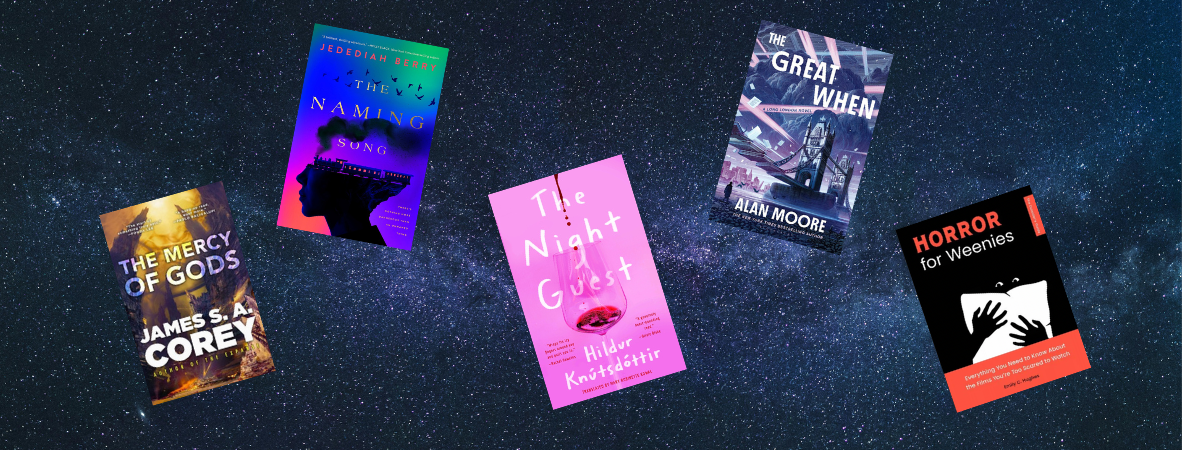
Our 21 Most-Anticipated Sci-Fi, Fantasy, and Horror Books for the Rest of 2024
Books for the witches, spacefarers, and ghouls among us.
It might be a bad year in the world, generally speaking, but it has been a great year for books—especially genre books! I love some good literary fiction as much as anybody but I’m a sucker for a good book of magic, dragons, spaceships, monsters, slashers, ghosts, etc… and so I’ve been combing the calendar for the back half of 2024 to bring you a totally idiosyncratic and absolutely non-comprehensive list of 21 sci-fi, fantasy, and horror books to look forward to.
We’re living in a true golden age of genre fiction, so there’s a little something for everyone here—Big Five publishers, small indie presses, novels, short story collections, non-fiction, doorstoppers, single-sitting novellas—but feel free to sound off in the comments with books I didn’t include that you’re looking forward to, too!
* A note on my methodology: there are a handful of big books out this summer like Lev Grossman’s The Bright Sword that I’m not including here even though they are absolutely genre fiction, because they are getting what I like to call the “literary-fiction treatment” in terms of coverage and launch attention. Definitely read The Bright Sword but also… pick up some of these that you maybe haven’t heard of before, too.
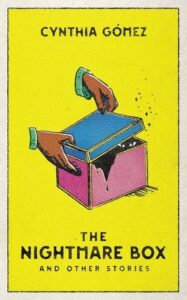
Cynthia Gómez, The Nightmare Box and Other Stories Cursed Morsels, July 9
I’ve read a few of these stories and have been looking forward to the collection for ages. Gómez brings Oakland to a magical kind of life in these strange, sometimes scary, sometimes furious tales. Vampires, witches, Black Panthers, ACAB—this one’s got it all. Plus, that cover!
Chuck Tingle, Bury Your Gays Tor Nightfire, July 9
As previously recommended: I loved Chuck Tingle’s traditional-publishing debut Camp Damascus (a terrific possession/demonology novel that managed to both terrify and uplift) and his Tinglers remain an absolute delight, but I’m going to go out on a limb and say that Bury Your Gays is his best work yet. It deserves to be the literary equivalent of a massive summer blockbuster, and I’m using that term specifically because it is set in Hollywood and written by somebody who gets it : the suits are going to drive us all off the cliff of increasingly crappy AI-driven stories that have zero humanity to them whatsoever, but we-the-artists (and we-the-audiences) can and must push back!
It also works as a total thrill-ride, following a screenwriter on the verge of his big moment (an Oscar nomination, critical and commercial success) only to discover that the suits want him to kill off the gay characters in his long-running series. When he declines, monsters from his horror movie days start appearing in real life and trying to kill him and his loved ones—coincidence? Outrageous publicity stunt? An over-the-top attempt to bring a rogue writer to heel? If you were on the picket lines last year, if original stories are important to you, if you too believe that love is real(!), then this one is for you—even if you don’t think you like horror, you’re gonna devour this.
Keanu Reeves & China Mieville, The Book of Elsewhere Del Rey, July 23
I still can’t believe this book exists. Miéville and Reeves turn out to be a great match, and I for one will take new Miéville fiction however I can get it. Come for the action set-pieces and techno-thriller plotting but stay for the immortal pig(!) and the stirring digressions on ethics, morality, and humanity. It’s nothing like you could possibly expect, so don’t even bother: just dive in.
Gabino Iglesias, House of Bone and Rain Mulholland, August 6
Five teenage boys set out to get revenge on the biggest gang in Puerto Rico after one of their mothers is murdered—just in time for a massive hurricane to sweep down onto the island. Trust Gabino Iglesias to deliver pulse-pounding scares, unflinchingly bloody violence, and achingly beautiful moments of friendship and humanity.
James S. A. Corey, The Mercy of Gods Orbit Books, August 6
For their first book since the end of The Expanse —for my money, one of the best and most satisfying space operas of the 21st Century so far—the writing duo of James S. A. Corey head back to the stars… but where those books were very much about humanity stepping out of the solar system into the stars and discovering space to be a somewhat lonelier place than we’d thought, The Mercy of Gods looks like it’s going to have aliens galore. I’m guessing we’ll have multiple points of view, thorny ethical quandaries, snarky banter, and the building blocks of the next big epic space opera series.
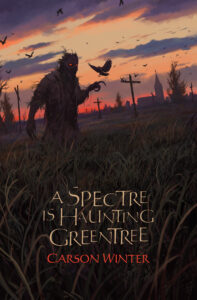
Carson Winter, A Spectre is Haunting Greentree Tenebrous Press, August 15
Tenebrous Press is quickly establishing themselves as a must-read indie press for horror lovers. Since taking over Dread Stone Press’s Split Scream novella series, they’ve introduced me to some incredible up-and-coming horror writers—and I’ve been looking forward to something new from Carson Winter since reading “The Guts of Myth” in Split Scream, Vol. 1 . This latest had me at the spooky scarecrows on the cover and in the blurb, not to mention the Marx reference in the title.
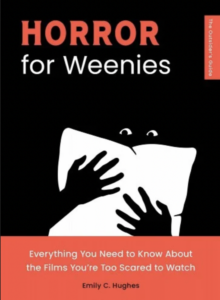
Emily Hughes, Horror for Weenies: Everything You Need to Know about the Films You’re Too Scared to Watch Quirk Books, September 3
I’ve said it before and I’ll say it again: Emily Hughes is the go-to guide for all things horror. A sterling literary citizen and a relentless champion of others, now she turns her attentions to helping those among us who might like the idea of being scared a whole lot more than they do the actual feeling of being scared. Horror for Weenies is here to deliver all the info you might need about some of the greatest horror films of the past half-century or so but without a single jump scare and with a whole ton of good jokes along the way. (But make no mistake: it’s a great read for lovers of the genre too, as Hughes provides a true afficionado’s insights into these classic horror films!)
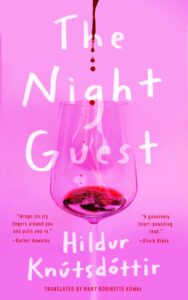
Hildur Knútsdóttir, tr. Mary Robinette Kowal, The Night Guest Tor Nightfire, September 3
“When we all fall asleep, where do we go?” takes on a new and even-eerier dimension in this English-language debut from Knutsdottir (and translation debut from the celebrated Kowal), about a woman in Reykjavik who can’t shake off her constant tiredness… only to discover that, when she thinks she’s asleep, she’s actually been walking over 40,000 steps every night. A true nightmare.
TJ Klune, Somewhere Beyond the Sea Tor, September 10
Klune returns to the world of The House in the Cerulean Sea to follow Arthur, the caretaker of the magical orphanage that so enraptured a legion of readers, as he must return to the mainland and take a stand to defend his found family. Expect tears, laughter, and a feeling of glowing warmth so lovely you’ll never want to leave.
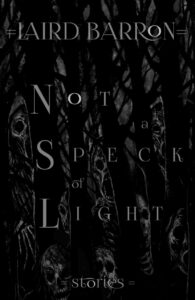
Laird Barron, Not a Speck of Light: Stories Bad Hand Books, September 10
For my money, Laird Barron is one of the best horror writers working—his particular grasp of the Weird speaks directly to the dark caves of my soul. His recent turn to noir with the Isiaiah Coleridge novels was a delight, but I’m excited to see him back at work in the form that terrifies me the most: a short story collection.
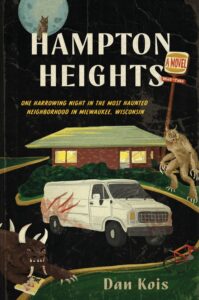
Dan Kois, Hampton Heights: One Harrowing Night in the Most Haunted Neighborhood in Milwaukee, Wisconsin Harper Perennial, September 17
Teenaged paperboys confronting a bunch of monsters in a Milwaukee suburb? From the guy who brought us Vintage Contemporaries and the oral history of Angels in America ?? Say no more, just let this fill the Stranger Things -shaped hole in your fall.
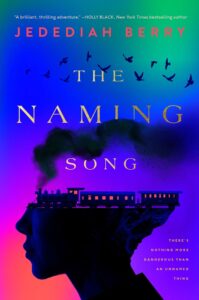
Jedediah Berry, The Naming Song Tor Books, September 24
I’ve been waiting for this book for a long time: Barry’s first novel The Manual of Detection was an instant favorite when it came out and his story-in-cards The Family Arcana has been deeply inspiring to my own creative practice. Now, he’s back with a fantastical epic about a world that lost its language and is trying to get it back. Plus, there’s a magical train! You probably couldn’t design a book more keyed into my personal interests, but I have the feeling this one is going to hit the sweet spot for a whole lot of people.
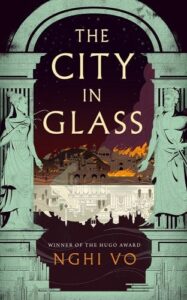
Nghi Vo, The City in Glass Tordotcom, October 1
I love fantasy cities and am always looking to visit new ones—so the promise of Nghi Vo squiring us away to a city beset by angels, protected (and maddened) by a demon, and caught in a cycle of history is very exciting indeed. Publicity copy cites Calvino, Mieville, and Le Guin—and if anybody could live up to that trinity, Nghi Vo can. Stamp my passport for Azril now.
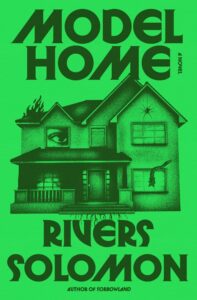
Rivers Solomon, Model Home MCD, October 1
A haunted house novel dealing with family, segregation, and racism in the American South, released on the first day of spooky season and five weeks before the election? Blurring the line between the supernatural and the all-too-human evils around us?? Rivers Solomon has their finger on the pulse of things, to be sure. I’m betting on this one to be Solomon’s breakout.
Alan Moore, The Great When Bloomsbury, October 1
When a fictional book out of an Arthur Machen story ends up in a used bookstore in post-WWII London, a young man’s entire sense of the universe is turned upside down. It’s a rollicking adventure, the first in an apparent series. Imagine if Neil Gaiman commissioned Kevin Barry to write a prequel to Neverwhere and gave him some acid to help get things going, and that’s just the start of it.
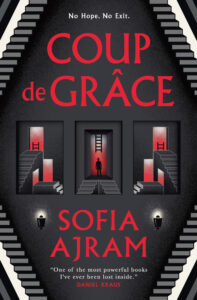
Sofia Ajram, Coup de Grâce Titan Books, October 1
A suicidal young man on his way to throw himself into the Saint Lawrence River instead gets stuck in an endless Montreal subway station. Shades of Piranesi and House of Leaves abound.
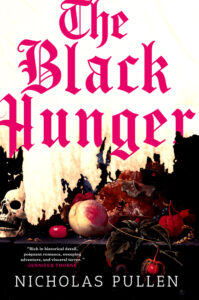
Nicholas Pullen, The Black Hunger Redhook, October 8
A queer historical gothic structured in classic epistolary style? A journey across a dark and fantastically dangerous Europe? I’m always looking for something I know next-to-nothing about to win me over during spooky season and I’m thinking that Pullen’s debut might just be that, this year.
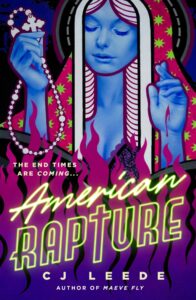
CJ Leede, American Rapture Tor Nightfire, October 15
There really seems to be something in the air right now when it comes to horror writers tackling the apocalypse as brought on by (or relating to) the forces of repression and shame. CJ Leede might have the most audacious yet, featuring lust-zombies and a good Catholic girl trying to find her family in a world on fire. Maeve Fly was one of my favorite reads of last year and I have the highest hopes for this one.
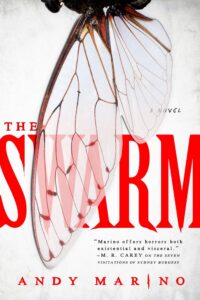
Andy Marino, The Swarm Redhook, November 5
Cicadas are scary! I mean think about it: they come out of the ground at these cyclical intervals and we talk about them in such near-apocalyptic tones… so what would happen if they really were harbingers of the apocalpyse? Trust Andy Marino to meld the 70s-horror-premise to a truly terrifying modern sensibility. Plus, it’s coming out on the scariest day of the year so I bet it’s going to be a banger.
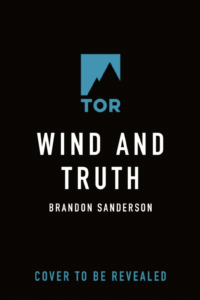
Brandon Sanderson, Wind and Truth Tor Books, December 6
Start adding weight to your arm workouts: Sanderson’s latest doorstopper, clocking in somewhere north of 1200 pages, brings the first arc of his Stormlight Archive series to an explosive conclusion—featuring godfights, magic swords, and literally-world-shaking decisions.
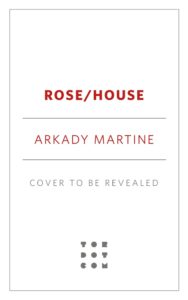
Arkady Martine, Rose/House Tordotcom, December 10
Originally published as a limited-run one-off, Tordotcom is bringing Martine’s AI-haunted Hill House to the masses. Not only is it a great haunted house novel, but Martine’s exceptional eye for structures and systems (as seen in her Teixcalaan series) really shines here as she looks into architecture and design and the way such things shape our very perceptions of the world.

Drew Broussard
Previous article, next article.

- RSS - Posts
Literary Hub
Created by Grove Atlantic and Electric Literature
Sign Up For Our Newsletters
How to Pitch Lit Hub
Advertisers: Contact Us
Privacy Policy
Support Lit Hub - Become A Member
Become a Lit Hub Supporting Member : Because Books Matter
For the past decade, Literary Hub has brought you the best of the book world for free—no paywall. But our future relies on you. In return for a donation, you’ll get an ad-free reading experience , exclusive editors’ picks, book giveaways, and our coveted Joan Didion Lit Hub tote bag . Most importantly, you’ll keep independent book coverage alive and thriving on the internet.

Become a member for as low as $5/month
Screen Rant
10 most-anticipated fantasy books coming out in july 2024.

Your changes have been saved
Email Is sent
Please verify your email address.
You’ve reached your account maximum for followed topics.
10 Underrated Fantasy Book Series That Should Be On Everyone's Radar
10 best fantasy tv shows of 2024, 10 perfect court of thorns & roses memes for the acotar fan.
- 2024 is a great year for fantasy books, as there are many intriguing new releases hitting shelves.
- July's new fantasy books include much-anticipated sequels and new novels by authors like Lev Grossman and Jenn Lyons.
- There are many options for fantasy readers in July 2024, continuing a positive trend from the first half of the year.
Some of the most popular books and series published in recent years are from the fantasy genre, and July 2024 is bringing readers even more exciting releases in that category . In general, 2024 has been a great year for fantasy readers. There are numerous highly anticipated sequels hitting shelves, as well as new books from well-known authors and exciting debuts. Several of the most-anticipated fantasy books of 2024 arrive in July, including the sequel to a viral romantasy hit and a new novel by the author of The Magicians trilogy .
After June 2024's impressive fantasy releases , July continues a positive trajectory for the genre. Although beach reads tend to take precedence during the summer, there will always be readers looking for fantastical new worlds and complex narratives to dive into. Fortunately, such readers will have plenty of offerings to choose from throughout July .
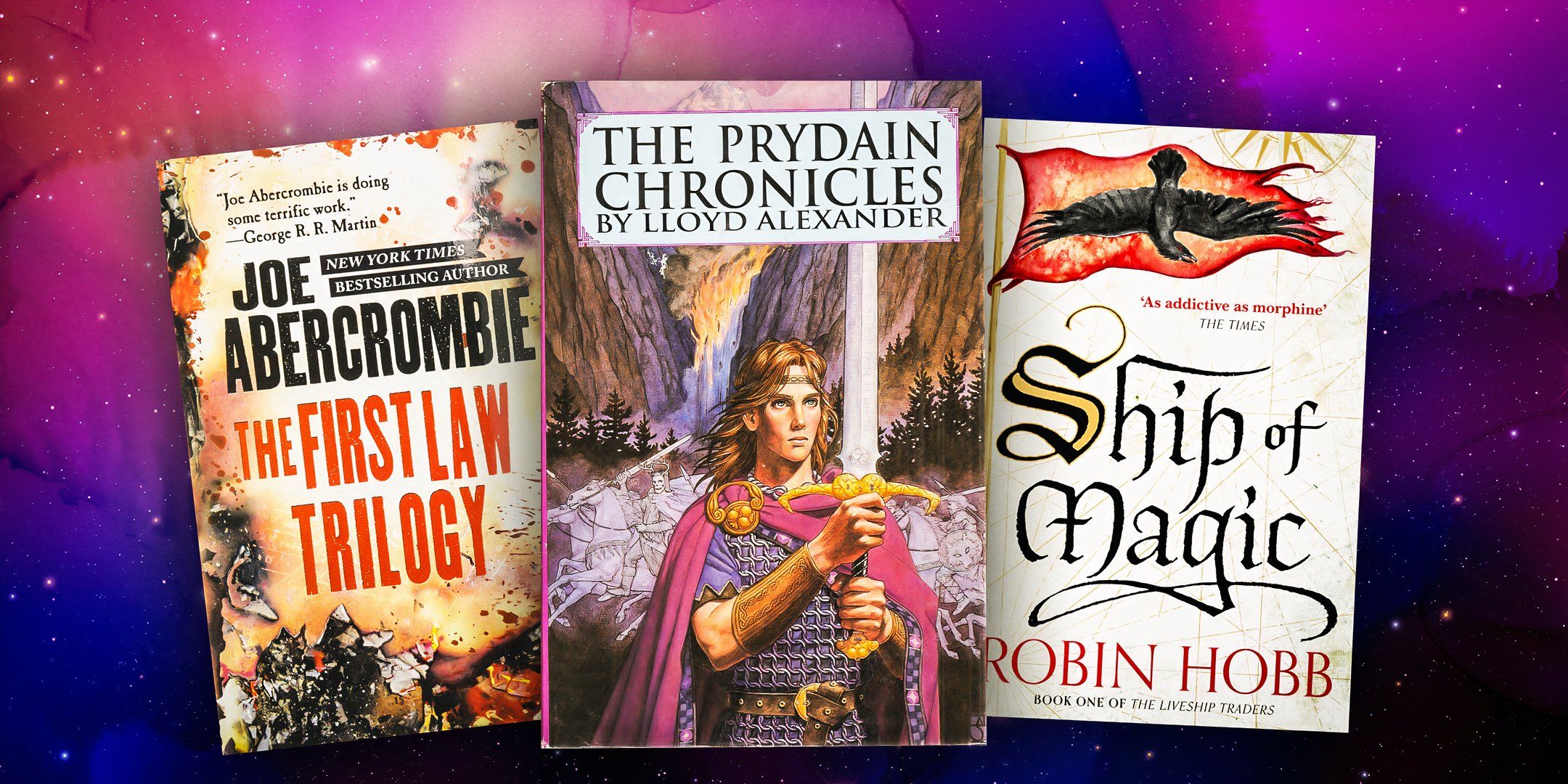
Not every fantasy book series can be The Lord of the Rings or A Song of Ice and Fire, but there are 10 underrated fantasy sagas worth reading anyway.
10 Reckless by Lauren Roberts
Release date: july 2, 2024.
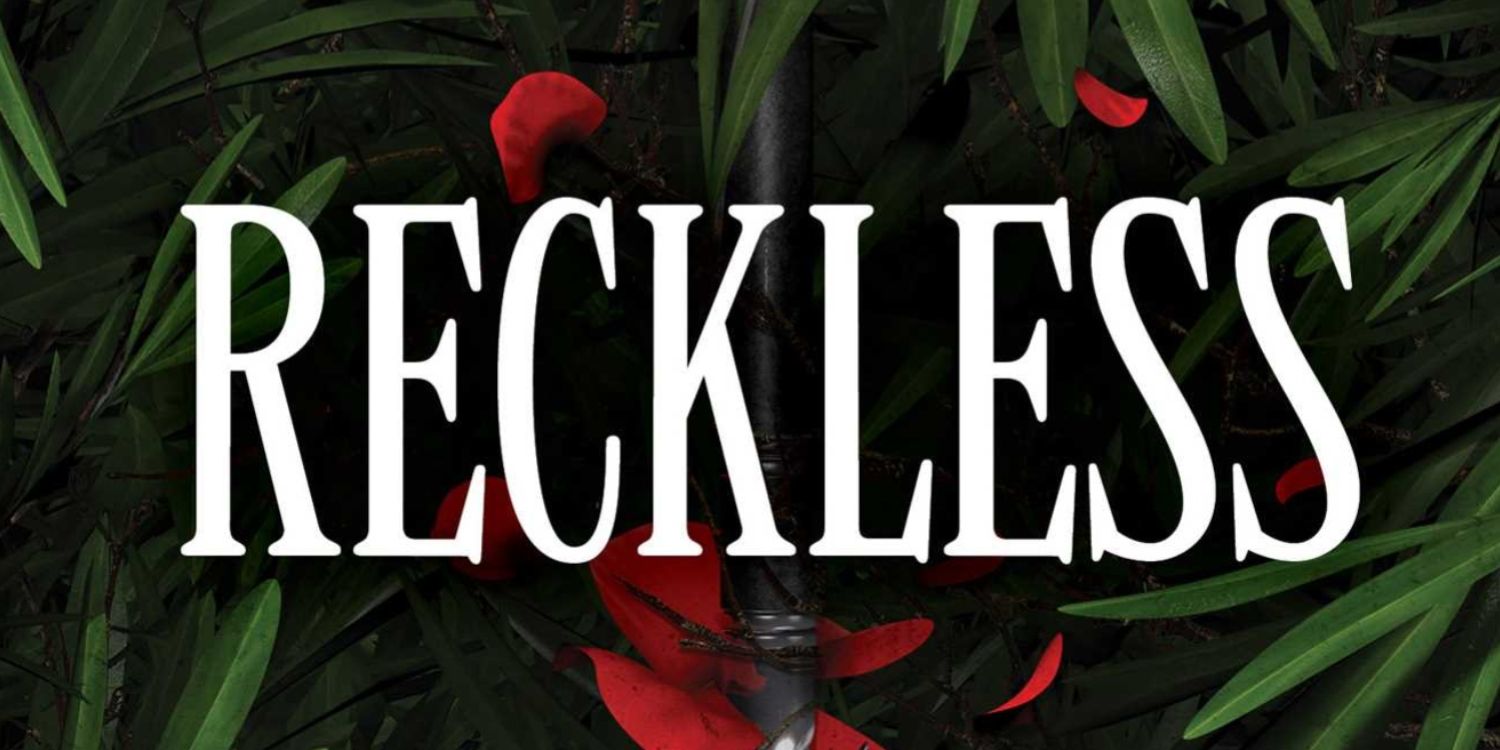
Reckless by Lauren Roberts is one of the most-anticipated fantasy books coming out all summer , and readers can finally get their hands on it come July 2. The sequel to 2023's viral TikTok success, Powerless, Reckless will continue the story of Paedyn and Kai now that the Purging Trials are over. According to the book's synopsis, their lives won't be any easier in Roberts' newest installment. Paedyn is now on the run, and Kai is the person tasked with hunting her down. Despite their attraction to one another, they're officially enemies, which will make for a tense narrative.
Judging by the sequel's 4.63 Goodreads rating, this July 2024 fantasy book doesn't suffer from middle-book syndrome.
Reckless is the second book in Roberts' Powerless Trilogy , so readers can expect another follow-up to Paedyn and Kai's story after. Judging by the sequel's 4.63 Goodreads rating, this July 2024 fantasy book doesn't suffer from middle-book syndrome. It promises to be even better than Powerless, which is an impressive and exciting prospect. For romantasy fans and those who enjoyed the first book, this will be a must-read for July.
|
|
Powerless | 2023 |
Reckless | 2024 |
9 The Night Ends With Fire by K.X. Song
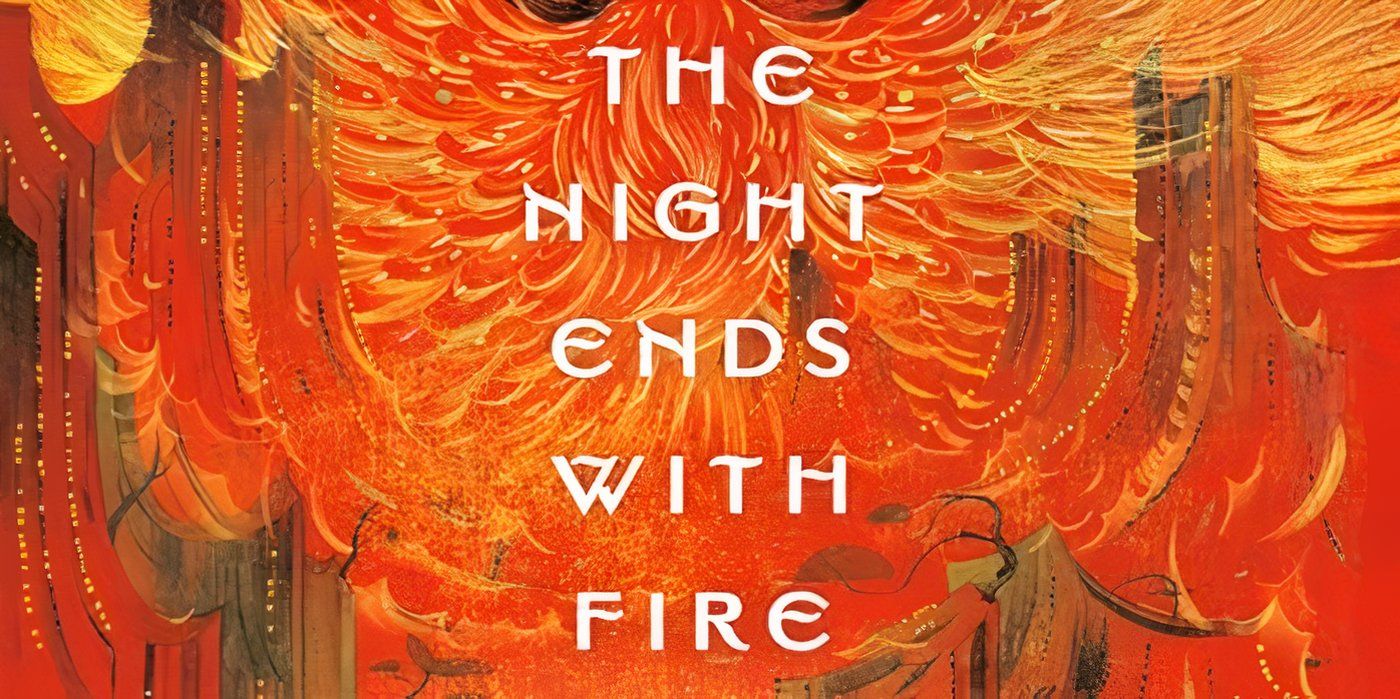
K.X. Song published An Echo in the City in 2022, and the author is back with The Night Ends With Fire in July 2024 . Drawing inspiration from Mulan, The Night Ends With Fire opens with a similar premise. It follows Mellin, whose father won't respond to the Imperial draft, as she's nearly sold off to an angry and abusive man. Refusing to subject herself to such a fate, Mellin disguises herself as a man and joins the army in her father's stead.
Unfortunately, Mellin also feels trapped while she's at war — and her primary chance of freedom comes from a sea dragon spirit who may not be trustworthy. Mellin's story has all the trappings of a gripping fantasy tale, and it promises feminist themes to boot. The Night Ends With Fire is a July 2024 fantasy book readers should keep on their radar, especially if they enjoy retellings of classic tales.
8 The Darkness Within Us by Tricia Levenseller
Release date: july 9, 2024.
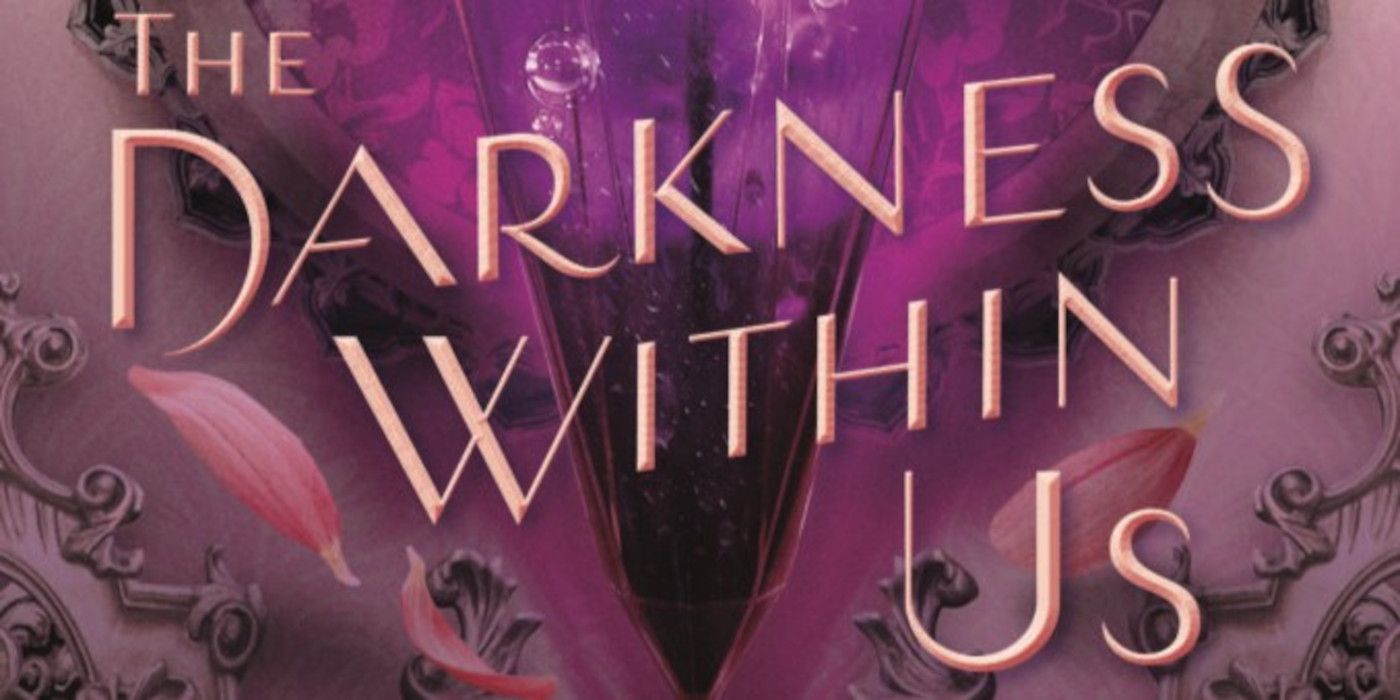
Tricia Levenseller is known for the Daughter of the Pirate King series, as well as The Shadows Between Us. The author's July 2024 release is set in the same world as the latter , with The Darkness Within Us serving as a companion novel to the 2020 book. According to Levenseller's website , The Darkness Within Us can be read without picking up the first installment. So, while fans of The Shadows Between Us may get more out of this book, it's one that fantasy-romance readers should keep an eye out for regardless.
The Darkness Within Us follows Alessandra's sister, Chrysantha Stathos, whose commitment to becoming a duchess has finally paid off. She's looking forward to having freedom and money once her elderly husband perishes, but her plans quickly go awry. She's forced to contend with the duke's grandson showing up and claiming everything that's hers. It sounds like Chrysantha could be attracted to him, but she also has every reason to want him dead. Needless to say, fans of enemies-to-lovers books should probably dig into The Darkness Within Us this July .
|
|
The Shadows Between Us | 2020 |
The Darkness Within Us | 2024 |
7 The Sky on Fire by Jenn Lyons
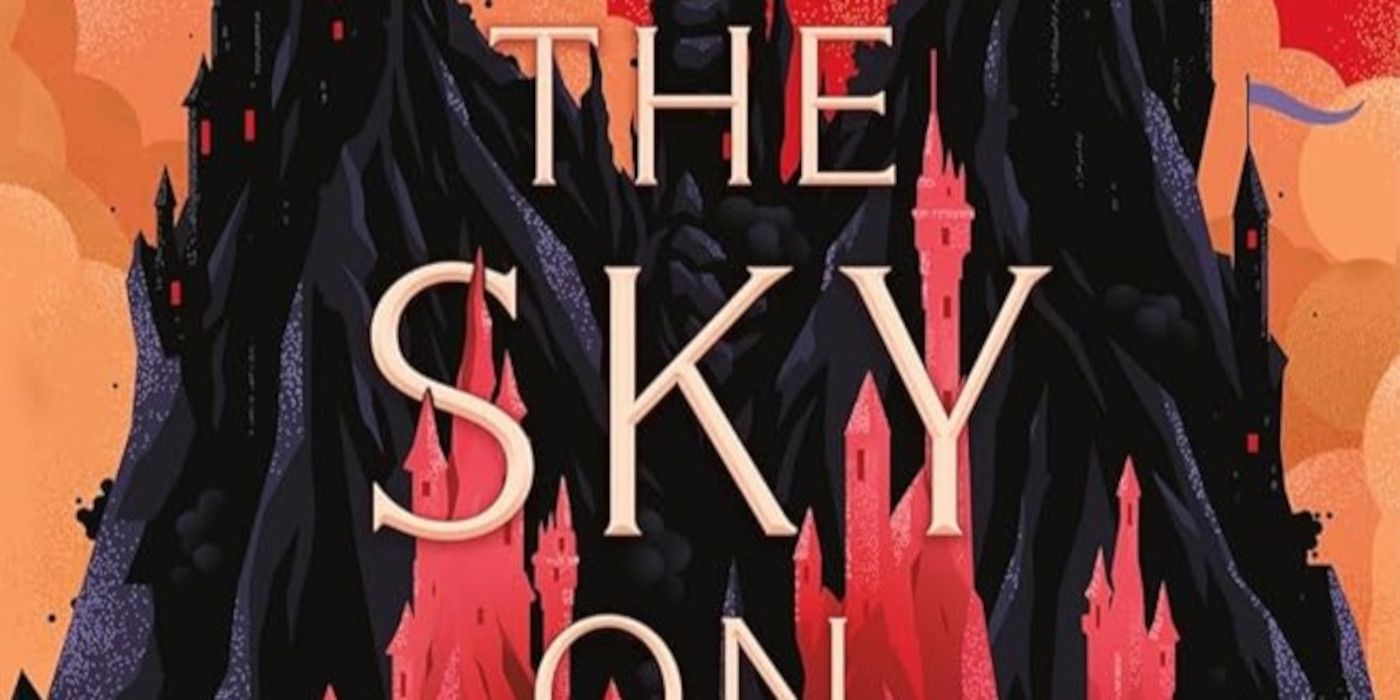
Jenn Lyons' published the final book in A Chorus of Dragons back in 2022, and the author is releasing a standalone fantasy novel in 2024. The Sky on Fire is marketed as a heist story that's set in " a world ruled by dragons " (via Tor/Forge ), and that's probably enough to sell it to fantasy readers. It follows Anahrod, who prefers to be left to her own devices. When she's captured by a local warlord, however, she's rescued by a band of outcasts — and they expect something in return for their service.
With its gripping premise and standalone status, The Sky on Fire sounds like the perfect book to take to the beach.
That's how Anahrod finds herself planning to steal from a dragon's hoard — one belonging to a dragon who hates her. This setup promises a thrilling and tense narrative , and the addition of dragons will likely prove a selling point, especially on the heels of books like Fourth Wing . With its gripping premise and standalone status, The Sky on Fire sounds like the perfect book to take to the beach. It's a must-read summer 2024 release.
6 Black Tide Son by H.M. Long
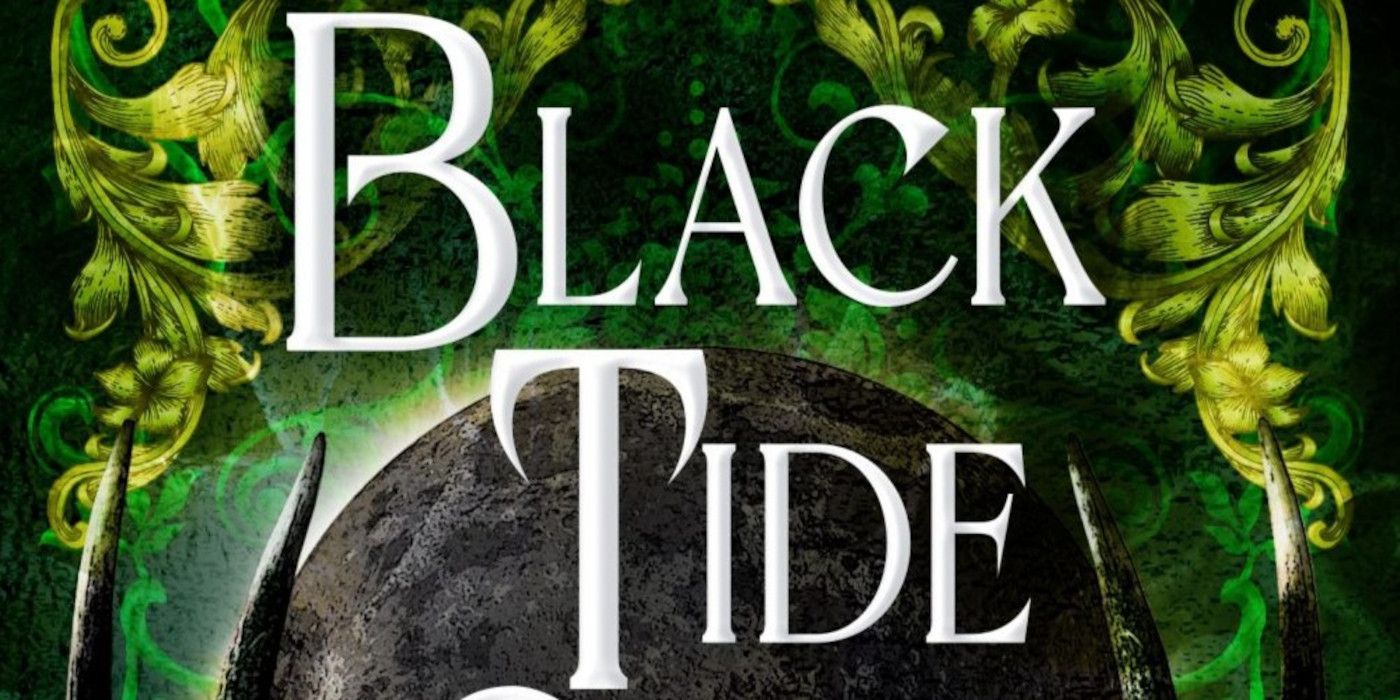
The sequel to H.M. Long's Dark Water Daughter hits shelves in July 2024, and Black Tide Son promises to be even better than its predecessor . The second installment of The Winter Sea series, Black Tide Son continues Samuel and Mary's adventures at sea. The two of them set out in search of Samuel's brother after receiving a surprising tip. The sequel's synopsis suggests that reaching Benedict won't be easy, and it sounds like it could force them to penetrate a seemingly impenetrable fortress. That's a thrilling setup, even without the promise of sparks between the pair.
Long's series is perfect for readers who enjoy fantasy books about pirates, and the summer is the best time to pick up stories about sailing the high-seas. Black Tide Son boasts a 4.27 average Goodreads rating , promising an impressive addition to The Winter Sea series. This July 2024 release will be among the biggest fantasy books of the month, so it's well worth looking out for.
|
|
Dark Water Daughter | 2023 |
Black Tide Son | 2024 |
5 Navola by Paolo Bacigalupi
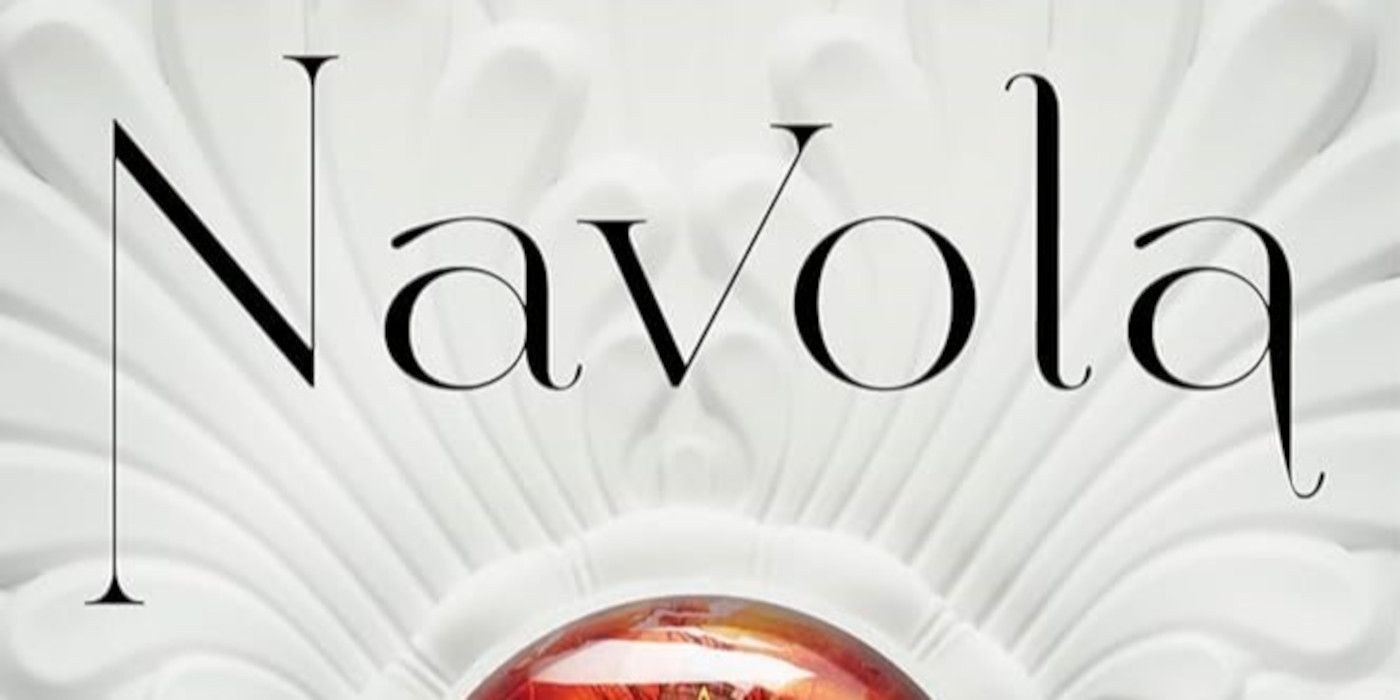
Award-winning author Paolo Bacigalupi is publishing a fantasy novel in July 2024, and Navola sounds like a mature and compelling exploration of power . Navola is named for the city it's set in, and it follows Davico di Regulai, whose family has a massive amount of political and financial sway there. Davico will take over his family's affairs, and that means he'll have to navigate a landscape full of untrustworthy allies. As though that isn't enough to worry about, Davico also believes a fossilized dragon eye is calling him to some greater purpose.
Pitched for fans of Game of Thrones and The Godfather, Navola sounds like an intense novel with plenty of political intrigue. It also promises magic, though how much the novel will lean into its fantasy elements remains to be seen. Either way, Bacigalupi latest holds plenty of promise . There's a reason it's getting attention ahead of its July 2024 release, and hopefully, it will prove worthy of the hype.
4 The Bright Sword by Lev Grossman
Release date: july 16, 2024.
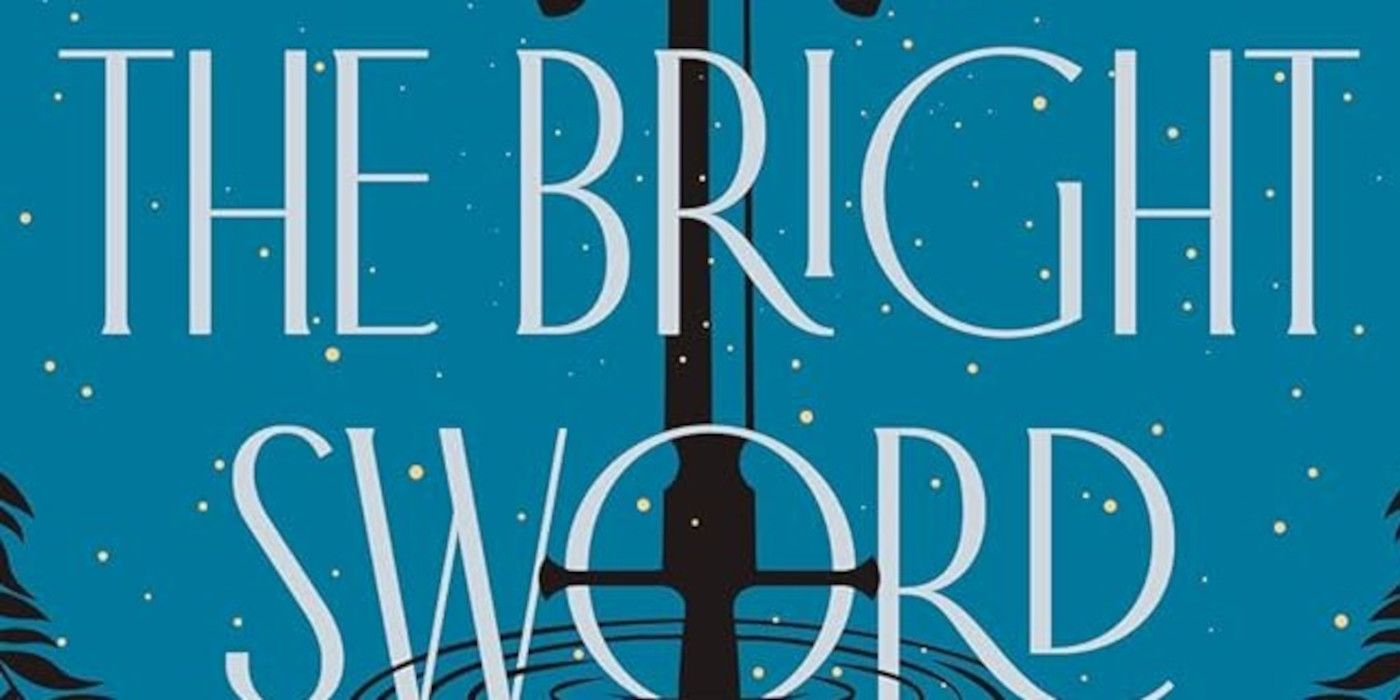
Lev Grossman is known for The Magicians books, and the popularity of that series will likely push fantasy readers to pick up The Bright Sword in July . An Arthurian story, Grossman's latest will follow Collum, a young knight who hopes to join the Round Table. Unfortunately, when Collum arrives at Camelot, he learns that King Arthur is dead. The remainder of his knights aren't the heroes Collum believed them to be, but they'll need to summon their strengths to keep Camelot alive and save Britain from ancient evils.
This retelling highlights Grossman's talent when it comes to putting a darker, more realistic spin on typical fantasy narratives — something The Magicians excels at as well.
An intriguing take on Arthurian legend, The Bright Sword promises to be one of July 2024's biggest new releases . Its impressive 4.29 Goodreads rating suggests it does its premise justice, making it a must-read for fans of Arthurian lore and historical fantasy. This reimagining highlights Grossman's talent when it comes to putting a darker, more realistic spin on typical fantasy narratives — something The Magicians excels at as well.
3 The Lost Story by Meg Shaffer
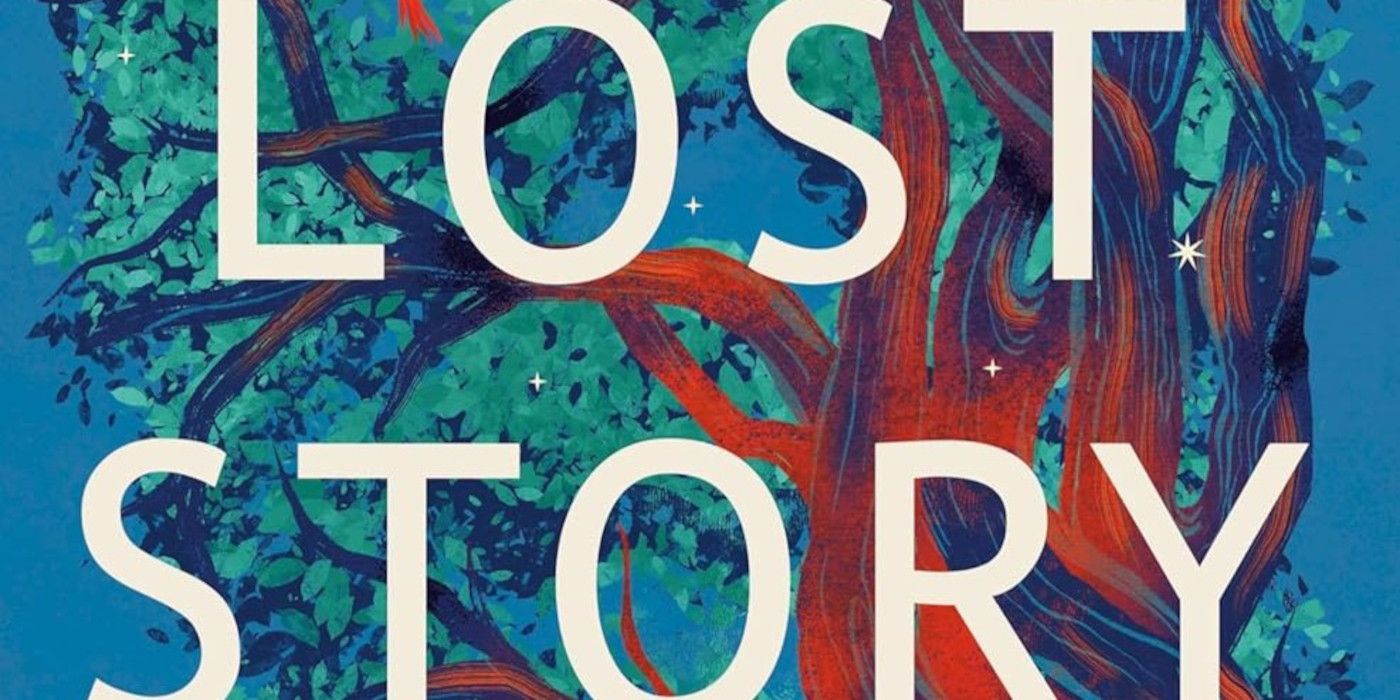
On the heels of The Wishing Game in 2023, Meg Shaffer is publishing a fantasy novel dubbed The Lost Story — and it's inspired by The Chronicles of Narnia. The Lost Story follows Jeremy Cox and Rafe Howell, both of whom disappeared in the woods when they were younger, then mysteriously returned months later. As an adult, Rafe still has no recollection of where they were when they were missing. However, Jeremy knows the truth about their odd disappearance — and as a missing-persons investigator, he'll have to dredge up the past if he wants to find a girl who vanished from the same forest.
The Lost Story promises to explore the darker side of magical realms , making it an ideal choice for fans of The Magicians by Lev Grossman and the Wayward Children series by Seanan McGuire. It sounds like an emotional and intense story for the summer, but it's one to keep an eye out for nonetheless. After The Wishing Game 's success, Shaffer promises to knock it out of the park with The Lost Story. Hopefully, it does its intriguing premise justice.
2 The Black Bird Oracle by Deborah Harkness
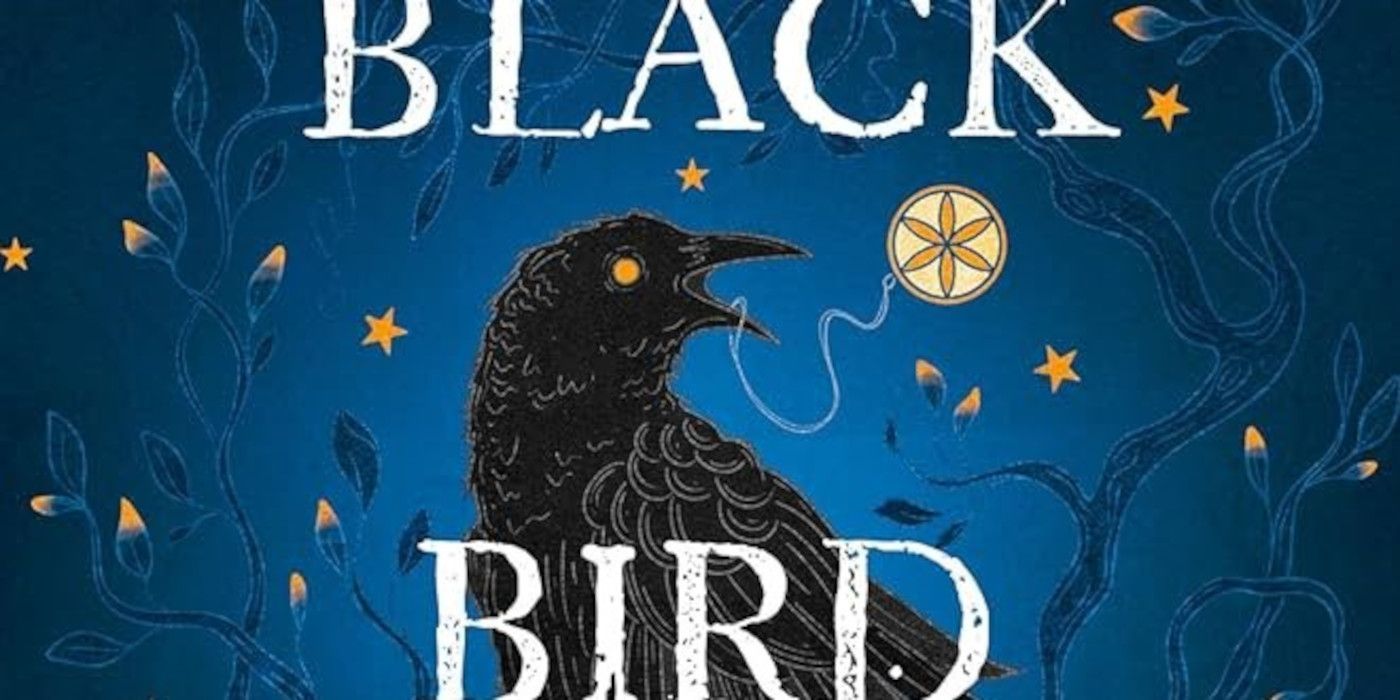
Deborah Harkness is returning to her All Souls universe in July 2024 , with The Black Bird Oracle reuniting readers with Diana, Matthew, and their twins. Set four years after Time's Convert, The Black Bird Oracle will put Diana in an impossible situation when the Congregation wants to test her kids for magic. Not wanting to put the twins through that, Diana refuses their demands and returns to her ancestral home at Ravenswood. This marks an emotional journey for her, though it promises to dig deeper into her background.
The prospect of such a character study will no doubt prove exciting for fans of the All Souls books. And The Black Bird Oracle 's impressive 4.59 Goodreads rating marks a series high. As such, Harkness' latest will be among the most-discussed fantasy books of July 2024 . With any luck, it'll set up future installments that are just as compelling.
|
|
A Discovery of Witches | 2011 |
Shadow of Night | 2012 |
The Book of Life | 2014 |
Time's Convert | 2018 |
The Black Bird Oracle | 2024 |
1 The Mirror of Beasts by Alexandra Bracken
Release date: july 30, 2024.
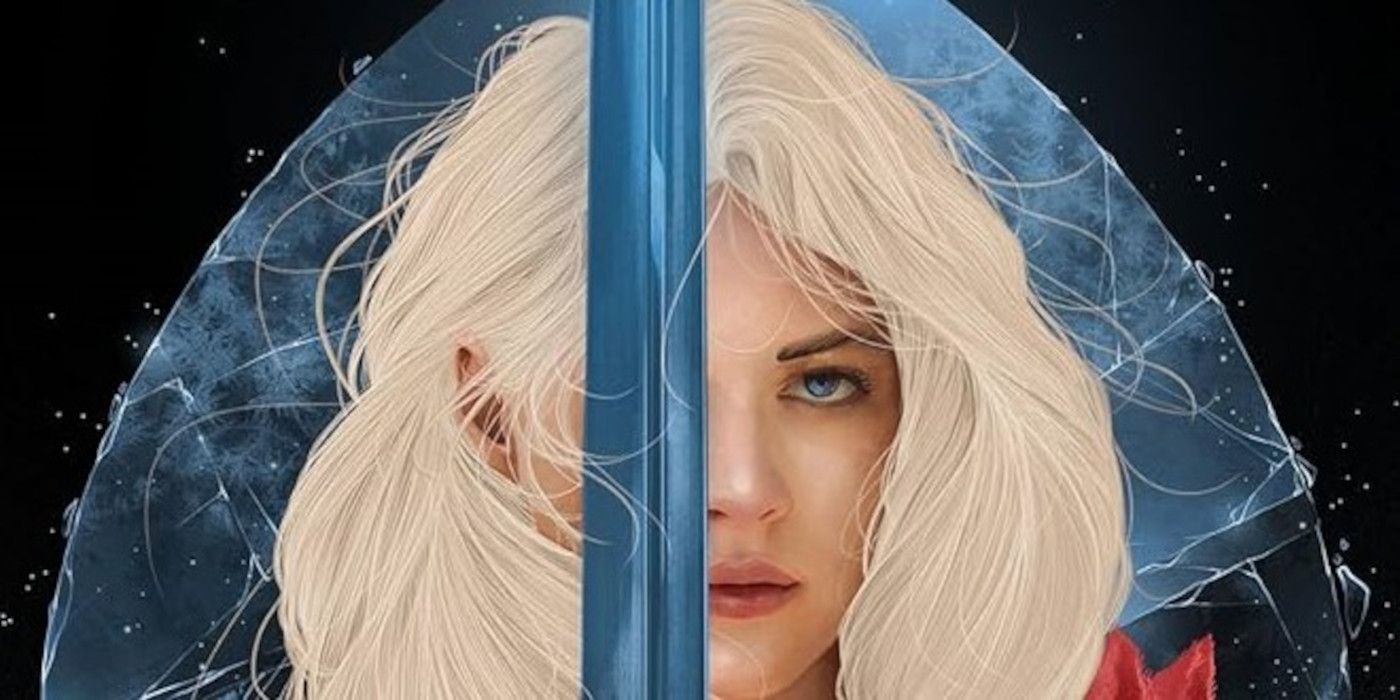
Alexandra Bracken weaves a lush and intriguing fantasy narrative in 2023's Silver in the Bone, and The Mirror of Beasts will continue that story in 2024 . The finale to Bracken's duology, The Mirror of Beasts will pick up where the first novel left off, revealing what becomes of Tasmin and her allies after Avalon is destroyed. It seems they'll set out on a new quest in this sequel, this time to find the titular item of legend. The Mirror of Beasts is the only way they can stop Lord Death from wrecking their world, but finding it will test Tamsin.
The perfect blend of urban fantasy and Arthurian legend, Bracken's duology is well worth the read . This will be especially true if its conclusion lives up to the first book -- and judging by its 4.31 Goodreads rating, it might even be better. Needless to say, Bracken's latest is one of the most exciting fantasy books to hit shelves in July 2024.
|
|
Silver in the Bone | 2023 |
The Mirror of Beasts | 2024 |
One BookTok Author Sold More Books This Year Than The Top 10 New Books Combined
- Share to Facebook
- Share to Twitter
- Share to Linkedin
Fantasy author Sarah J. Maas has sold almost 5 million print copies from her three popular series—Throne of Glass, Crescent City and A Court of Thorns and Roses—so far this year, making her the bestselling BookTok author of the year to date and topping the combined sales of the year’s 10 most popular new releases.
A portrait of American young adult fantasy author Sarah J. Maas.
Maas, who has credited much of her success to a surge in popularity on TikTok in recent years, and has become a case study in the power of social media fame, sold 4.83 million print books between the start of the year and June 8, according to Circana BookScan data provided to Forbes.
Of those, 536,346 were copies of her 2024 release "House of Flame and Shadow"—the third installment in the Crescent City series—and 4.3 million were sales of her other 15 titles, the first of which was published in 2012.
Maas is the poster child for “ BookTok ,” a category defined by Circana BookScan as authors and books that are featured prominently on the video app TikTok or those identified by bookseller Barnes & Noble as being popular on the platform.
Maas’s sales so far this year have easily eclipsed those of the second-best-selling BookTok author, Colleen Hoover, who has sold 1.83 million print copies through June 8 despite no new books this year.
Freida McFadden, whose 2024 book "The Teacher" is among the most widely sold of the year, is the third-best-selling author in the category with 1.61 million print copies sold, followed by Ana Huang with 1.47 million and Rebecca Yarrow with 1.28 million sales.
Maas, McFadden and Emily Henry, the seventh-best-selling BookTok author, all have new releases among the bestselling new books of 2024 so far with House of Flame and Shadow (536,346 print sales), “The Teacher” (289,949) and “Funny Story” (300,289), respectively.
This list of bestselling authors counts U.S. print sales from Dec. 31, 2023 through June 8 by Circana BookScan’s TikTok authors.
Top 10 Booktok Authors Of 2024
- Sarah J. Maas (4,829,853 print copies sold)
- Colleen Hoover (1,829,332 print copies sold)
- Freida McFadden (1,616,909 print copies sold)
- Ana Huang (1,474,194 print copies sold)
- Rebecca Yarros (1,281,140 print copies sold)
- Laura Nowlin (824,700 print copies sold)
- Emily Henry (788,388 print copies sold)
- Lucy Score (610,163 print copies sold)
- Hannah Grace (576,113 print copies sold)
- Holly Jackson (556,668 print copies sold)
3.14 million. That's how many copies of the top 10 bestselling adult books released in 2024 have sold so far, 1.69 million fewer than Maas alone has sold. The top-selling adult book this year was Kristin Hannah’s “The Women,” at 829,115 print copies, eclipsing Maas’s “House of Flame and Shadow”—but sales for Maas’s older books more than made up for it.
Surprising Fact
Novels by seven of the top 10 bestselling BookTok authors have film or TV show adaptations in the works. " It Ends with Us " a film based on Hoover's book of the same name starring Blake Lively and Justin Baldoni, releases Aug. 9. A show of the same name based on Holly Jackson's young adult novel "A Good Girl’s Guide to Murder" is set to be released by Netflix later this year. A TV adaptation of “A Court of Thorns and Roses” co-written by Maas is currently in development at Hulu . "The Housemaid" by Freida McFadden has a movie adaptation in the works from Lionsgate and Rebecca Yarros' fantasy novel "Fourth Wing" is being adapted into a TV show from Amazon MGM Studios . Three of Emily Henry 's romantic comedy-esque novels—"Beach Read," "People We Meet on Vacation" and "Book Lovers"—are expected to be turned into movies, according to the Today Show , and Amazon is also working on an adaptation of Lucy Score's Things We Never Got Over."
Further Reading
‘A Court of Thorns and Roses’ TV Series Still in Development at Hulu For Now, Despite Report — But Future Is Murky (Variety)
A Bill Gates-Recommended Read Is The Bestselling Book Of The Year So Far (Forbes)
Sarah J. Maas Is The Year’s Top Author As Fantasy And Romance Dominate March Bestseller List (Forbes)
Can BookTok Save Bookstores? Read Between The Lines (Forbes)
TikTok Helped This Woman Become A Best Selling Author (Forbes)

- Editorial Standards
- Reprints & Permissions
Join The Conversation
One Community. Many Voices. Create a free account to share your thoughts.
Forbes Community Guidelines
Our community is about connecting people through open and thoughtful conversations. We want our readers to share their views and exchange ideas and facts in a safe space.
In order to do so, please follow the posting rules in our site's Terms of Service. We've summarized some of those key rules below. Simply put, keep it civil.
Your post will be rejected if we notice that it seems to contain:
- False or intentionally out-of-context or misleading information
- Insults, profanity, incoherent, obscene or inflammatory language or threats of any kind
- Attacks on the identity of other commenters or the article's author
- Content that otherwise violates our site's terms.
User accounts will be blocked if we notice or believe that users are engaged in:
- Continuous attempts to re-post comments that have been previously moderated/rejected
- Racist, sexist, homophobic or other discriminatory comments
- Attempts or tactics that put the site security at risk
- Actions that otherwise violate our site's terms.
So, how can you be a power user?
- Stay on topic and share your insights
- Feel free to be clear and thoughtful to get your point across
- ‘Like’ or ‘Dislike’ to show your point of view.
- Protect your community.
- Use the report tool to alert us when someone breaks the rules.
Thanks for reading our community guidelines. Please read the full list of posting rules found in our site's Terms of Service.
Science Fiction & Fantasy: A Research Guide: Books
- Reference Sources
- Biographical Sources
- New Acquisitions
- Primary Sources
Finding Books in the Library Catalog
The Library of Congress Subject Headings encompass topics within the genres of fantasy and science fiction in a variety of media. The following list may be useful in locating critical/historical books and other secondary materials in the Cornell Library Catalog . Use the Subject search in the library catalog:

Subject headings for fantasy, horror, & science fiction:
FANTASY FICTION--HISTORY AND CRITICISM FANTASY FICTION, AMERICAN -- HISTORY AND CRITICISM FANTASY FICTION, ENGLISH--HISTORY AND CRITICISM FANTASY FICTION [JAPANESE, RUSSIAN, FRENCH, etc] -- HISTORY AND CRITICISM FANTASY IN LITERATURE FANTASY LITERATURE--HISTORY AND CRITICISM FANTASY LITERATURE, ENGLISH--HISTORY AND CRITICISM FANTASY FILMS--HISTORY AND CRITICISM ALTERNATIVE HISTORIES (FICTION)
GOTHIC FICTION
AFROFUTURISM SPECULATIVE FICTION
HORROR FILMS--HISTORY AND CRITICISM HORROR IN LITERATURE HORROR TALES--HISTORY AND CRITICISM HORROR TALES, AMERICAN--HISTORY AND CRITICISM HORROR TALES, ENGLISH--HISTORY AND CRITICISM SUPERNATURAL IN LITERATURE
SCIENCE FICTION--ILLUSTRATIONS FANTASY FICTION--ILLUSTRATIONS
SCIENCE FICTION--HISTORY AND CRITICISM SCIENCE FICTION, AMERICAN--HISTORY AND CRITICISM SCIENCE FICTION, ENGLISH--HISTORY AND CRITICISM SCIENCE FICTION FILMS--HISTORY AND CRITICISM SCIENCE FICTION FILMS--UNITED STATES--HISTORY AND CRITICISM ZOMBIE FILMS ZOMBIES--FICTION
SCIENCE FICTION--BIBLIOGRAPHY SCIENCE FICTION, AMERICAN--BIBLIOGRAPHY SCIENCE FICTION, ENGLISH--BIBLIOGRAPHY FANTASY LITERATURE--BIBLIOGRAPHY
Subject heading searches may also be used to find critical work on individual authors or films, e.g.:
LOVECRAFT, H.P. DICK, PHILIP K--CRITICISM AND INTERPRETATION RUSS, JOANNA, 1937-2011--CRITICISM AND INTERPRETATION 2001 A SPACE ODYSSEY (MOTION PICTURE) METROPOLIS (MOTION PICTURE : 1927)
Terminology
So Much to Read, So Much to Watch
Don't know what SF/fantasy book to read next? Which film to see? WorldCat Genres can help you identify authors, books, and films in a variety of fictional genres and subgenres, including fantasy, horror, gothic, occult, science fiction, steampunk, dystopias, ghost stories, alternative history, and many more.

- << Previous: Biographical Sources
- Next: New Acquisitions >>
- Last Updated: Sep 18, 2023 5:03 PM
- URL: https://guides.library.cornell.edu/scifi

Summer, Summer, Summertome: 10 Exciting New SFF Books Out July 2024
Liberty Hardy
Liberty Hardy is an unrepentant velocireader, writer, bitey mad lady, and tattoo canvas. Turn-ons include books, books and books. Her favorite exclamation is “Holy cats!” Liberty reads more than should be legal, sleeps very little, frequently writes on her belly with Sharpie markers, and when she dies, she’s leaving her body to library science. Until then, she lives with her three cats, Millay, Farrokh, and Zevon, in Maine. She is also right behind you. Just kidding! She’s too busy reading. Twitter: @MissLiberty
View All posts by Liberty Hardy
For your reading enjoyment this month, we have an Arthurian fantasy; alternate history set in 15th-century West Africa; a historical epic with shades of The Godfather + dragon relics; a specialty shop that sells dreams — literally; a Spice Carrier who comes up with plans to escape while traveling between the eight kingdom spice gates; adventurous kids who accidentally summon a 300-year-old ghost pirate; and more! Plus, at the end of the post, find out which hugely-popular fantasy series has a new book coming out this month. (Hint: More like witch hugely-popular fantasy series, lol.)
So get your TBR prepared, make sure you put plenty of time on your meter (you don’t want your dragon to get a ticket), and get ready to find something great to read in the sand this summer. (But be sure to watch out for sandworms.)
The Best New Science Fiction and Fantasy Books Out July 2024
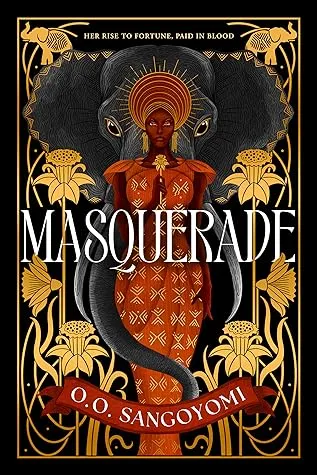
Masquerade by O.O. Sangoyomi (Forge Books, July 2)
This is a loose retelling of Persephone , set in 15th-century West Africa! Òdòdó is a member of a blacksmith guild, a group of outcasts in Timbuktu, who encounter problems when their land is conquered by a warrior king. Then things get even worse for Òdòdó when she is kidnapped by none other than the warrior king himself, who wants her as his bride. As Òdòdó adjusts to her new surroundings, she discovers she likes navigating the privilege and power her new life affords her. She must decide if (or more likely, when) she will make her move and break free from the warrior king.
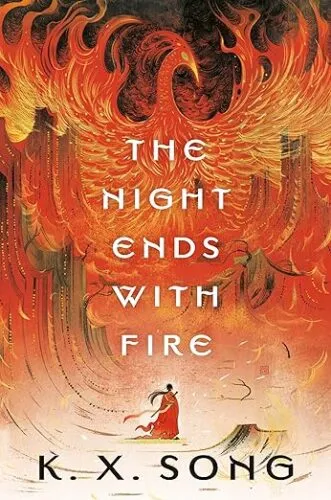
The Night Ends with Fire by K. X. Song (Ace, July 2)
This is another fantasy inspired by an older story, this one based on the legend of Mulan. Desperate to escape an impending marriage and her terrible father, Meilin disguises herself as a man and joins the imperial army under her father’s name. Soon, she has made a friend in Sky, starts having visions of a sea dragon who offers her power, and crosses paths with an enemy prince. With the fate of her kingdom beginning to look bleak, Meilin will have to decide which of these three she can trust to help her save the day.
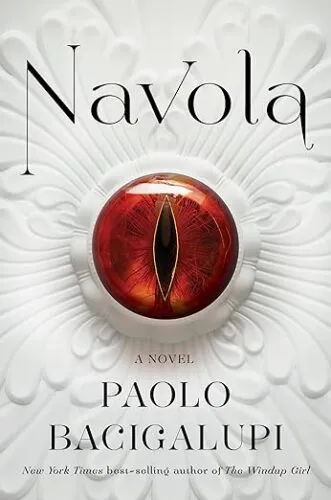
Navola by Paolo Bacigalupi (Knopf, July 9)
Calling all fans of wealthy families, political machinations, backstabbing, and dragons! Award-winning author Paolo Bacigalupi is back with a fantasy about the son of a powerful family in Navola, who is getting ready to take his father’s place at the head of the table. The di Regulai family has vast wealth and influence — and an alluring fossilized dragon eye that seems to contribute to their power. Davico must decide who he can trust to keep his family’s legacy from crumbling, and if the enchanting relic is ultimately going to help him or hurt him.
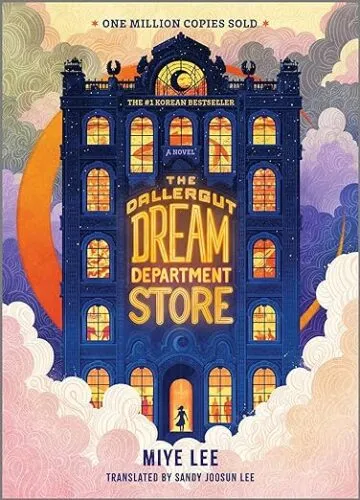
The Dallergut Dream Department Store by Miye Lee, Sandy Joosun Lee (translator) (Hanover Square Press, July 9)
If you need a feel-good read, this cozy fantasy debut has you covered. Translated from Korean, it’s about a department store nestled in the subconscious of humans (and animals), where you can shop for the dreams you desire. Penny is a new hire, looking forward to helping people make their dreams a reality. Well, a dream reality. And speaking of dreams coming true, this was a crowdfunded publication that became a million-book bestseller in Korea!
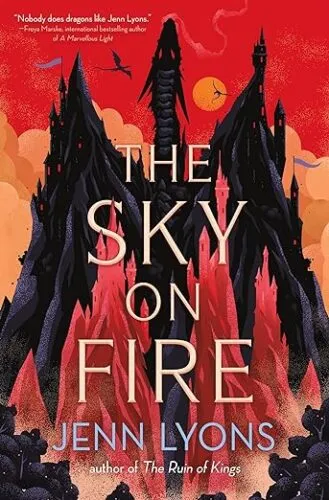
The Sky on Fire by Jenn Lyons (Tor Books, July 9)
Jenn Lyons is no stranger to dragons, having authored the awesome Chorus of Dragons series. This is a standalone fantasy with dragons, plus adventure and a heist! Anahrod lives alone in the jungle with her drake companion, and she likes it that way. But when she is rescued from capture by a group of misfits, it turns out they need her help. They want her to steal from a dragon hoard. But doing so would mean going against the very person Anahrod has been trying to avoid, Neveranimas, who wants her dead. Just what does she owe the people who saved her, and is she willing to pay it?
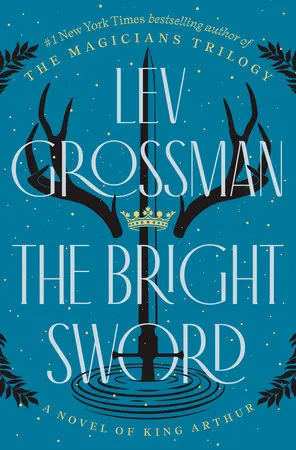
The Bright Sword: A Novel of King Arthur by Lev Grossman (Viking, July 16)
From the author of the Magicians trilogy comes a reimagining of the Arthurian legend. In this story, the Round Table is seated with misfits and outcasts, and King Arthur has just died. Collum, a knight who arrived in Camelot hoping to join the group, must now lead them against the darkness that is claiming Britain, both humans and monsters (led by Morgan le Fay, natch.) Only by reclaiming Excalibur and uncovering the truths of Britain’s past and King Arthur’s death will they triumph and restore Camelot to its former glory. (Even though ’tis a silly place.)
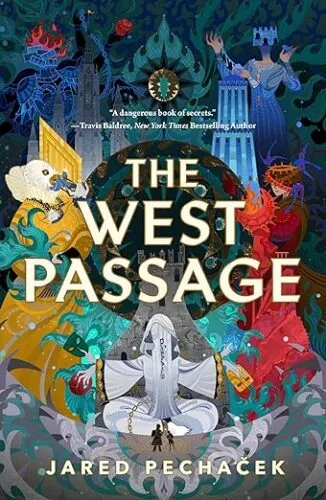
The West Passage by Jared Pechacek (Tordotcom, July 16)
This is a wildly imaginative debut that Travis Baldree told me was the best book he read last year when I interviewed him at an event! In the world of Grey, no one thinks much of it when the Guardian of the West Passage dies. She is given a funeral and her position goes unfilled. But her absence leaves the land vulnerable, and now signs of the prophesied Beast have begun to appear. It is up to the Mother of Grey House and the Guardian’s unnamed squire to protect the West Passage and save everyone. But there are great dangers and unthinkable horrors ahead.
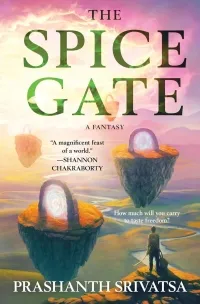
The Spice Gate by Prashanth Srivatsa (Harper Voyager, July 16)
Another debut fantasy for your summer reading enjoyment is this story of Amir, a Spice Carrier. In this world, there are eight portals to kingdoms, each with their own distinct spice. Spice Carriers are enslaved people who bear the mark that allows them to pass through the portals and bring spices from other kingdoms to the rich and greedy. Amir is looking to escape this life, but before he can figure out how, he will be drawn into a vast conspiracy between the Spice gates, one involving gods and humans.
SFF New Releases for Kids and Teens
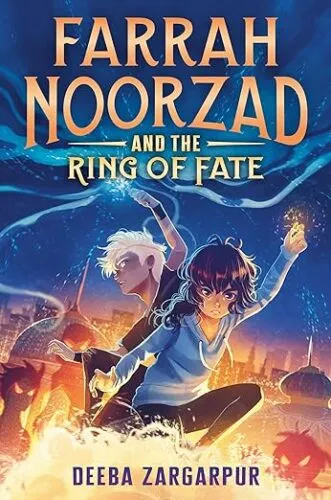
Farrah Noorzad and the Ring of Fate by Deeba Zargarpur (Labyrinth Road, July 2)
Farrah Noorzad is turning 12 and looking forward to seeing her father, who only visits on her birthday. But this time, her birthday wish goes sideways when she wishes to have more time with her father and he ends up trapped in a magic ring! It turns out, there’s a LOT her family hasn’t told Farrah. Like, the fact that her father is one of the seven jinn kings, and that Farrah herself is half-jinn. And now she must rescue her father and the other kings, with the help of the freed jinn boy who had been trapped in the ring, before all of the jinn realm is doomed.
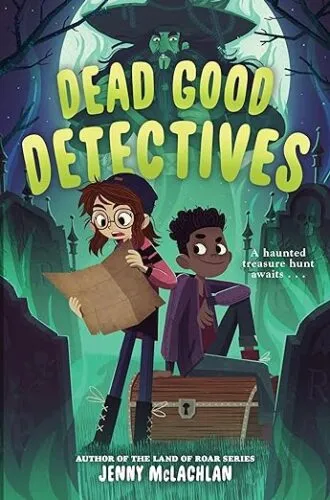
Dead Good Detectives by Jenny McLachlan (HarperCollins, July 9)
Sid Jones and her best friend, Zen, like to spend time playing around in the cemetery, which is totally normal kid behavior. But then Sid accidentally conjures the ghosts of a 300-year-old pirate named Bones and his obnoxious parrot. Bones needs Sid and Zen to help him retrieve his long-buried treasure to put his spirit to rest once and for all. That is, once he remembers where he buried it. And what it is. Sid and Zen will have to use their wits to figure out where to find the treasure and to outsmart the cemetery’s ghost prison guard, Old Scratch, who wants to keep Bones and his crew for all eternity.
Bonus Mentions
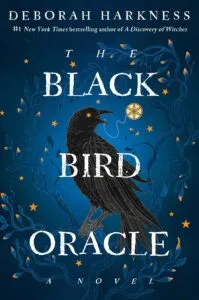
Because I can’t just stop at ten books, in July, be sure to watch for the sequels Ninth Life by Stark Holborn, A Whisper of Curses by J. Elle, Blood Jade by Julia Vee and Ken Bebelle, Gravity Lost by L. M. Sagas, and In the Shadow of the Fall by Tobi Ogundiran. And Discovery of Witches fans, rejoice! The fifth book in the series, The Black Bird Oracle by Deborah Harkness, is out this month, too!
There are also a TON of amazing SFF titles out in paperback this month, including The Grace of Wild Things by Heather Fawcett, Masters of Death by Olivie Blake, He Who Drowned the World by Shelley Parker-Chan, Immortal Longings by Chloe Gong, Forged by Blood by Ehigbor Okosun, Witch King by Martha Wells, and Counterweight by Djuna, Anton Hur (translator).
If you want to learn about more sci-fi and fantasy books, check out the 10 Nebula Award Winners You Should Put on Your TBR and LGBTQ Romantasy Books . And be sure to sign up for our SFF newsletter, Swords and Spaceships , and listen to our SFF podcast, SFF Yeah !
Finally, you can also find a full list of new releases in the magical New Release Index , carefully curated by your favorite Book Riot editors, organized by genre and release date.
You Might Also Like

All the New Sci-Fi, Horror, and Fantasy Books to Add to Your Reading List in July
In July, there are multiple new sci-fi, fantasy, and horror books about estranged friends reuniting to confront something dark in their past —call it the It effect —as well as an array of sci-fi adventures, mythology revisions, tales of terror , supernatural mysteries, fantastical romances, and more. Read on!

Concerning the Future of Souls by Joy Williams
In this collection of stories, “connected and disparate beings—ranging from ordinary folk to grand, known figures—experience the varying fate of the soul as each encounters the darkness of transcendence in this era of extinction.” (July 2)
The Down Deep by Catherine Asaro
“Major Bhaajan and her gang of Dust Knights act as guides and bodyguards to a member of the Imperial family on a mission of good will in the Undercity. But what awaits them in the Down Deep may ruin the chance at peace forever.” (July 2)
The Failures by Benjamin Liar
This blend of apocalyptic sci-fi and epic fantasy, the first of a trilogy, follows “a scattered group of unlikely heroes traveling across their broken mechanical planet to stave off eternal darkness.” (July 2)
The Gilded Crown by Marianne Gordon
A woman who can resurrect dead souls—serving a mysterious representative of the afterlife—is tasked with bringing back the assassinated heir to the throne, then sticking around to make sure the recently revived princess stays alive. Things get complicated when love enters the picture. (July 2)
The Icarus Changeling by Timothy Zahn
“Gregory Roarke—agent for the ultra-secret Icarus Group—has received a new assignment: locate a teleportation portal on a backwater colony world. But what should be an easy assignment leads to a string of murders, and a race against an alien enemy.” (July 2)
Made For You by Jenna Satterthwaite
A synthetic woman enters a Bachelor-like contest and wins—but the promise of domestic bliss that follows becomes twisted when her new husband goes missing, and she’s accused of being involved. (July 2)
Masquerade by O.O. Sangoyomi
Set in an alt version of 15th century West Africa and inspired by the myth of Persephone, this fantasy tale explores “the true cost of one woman’s fight for freedom and self-discovery, and the lengths she’ll go to secure her future.” (July 2)
The Moonlight Market by Joanne Harris
This London-set romance follows a photographer who falls for a mysterious woman, then discovers an alternate world of “strange and colorful beings” caught in a war raging just beyond the notice of regular humans. (July 2)
The Night Ends With Fire by K.X. Song
“Infused with magic and romance, this sweeping fantasy adventure inspired by the legend of Mulan follows a young woman determined to choose her own destiny—even if that means going against everyone she loves.” (July 2)
Rhymer: Hoode by Gregory Frost
The Rhymer Trilogy continues as Thomas Rimor, now living as a hermit in the Sherwood Forest, takes on the identity of Robin Hood to face both his elven and human foes. (July 2)
Wilderness Reform by Matt and Harrison Query
A newcomer at a court-mandated wilderness camp for troubled teens starts to suspect something very sinister is going on with the counselors, so he teams up with his fellow inmates to dig into a dangerous mystery. (July 2)

All This and More by Peng Shepherd
An unhappy middle-aged woman is chosen to star on a popular TV show that uses quantum technology that allows her to go back in time and fix mistakes in her past life. She’s thrilled at first, but soon realizes getting everything she ever dreamed of isn’t all it’s cracked up to be. (July 9)
Black Tide Son by H.M. Long
The Winter Seas series—following the adventures of privateers—“continues as a prisonbreak to save Benedict leaves him, Sam, and Mary trapped in a desperate race for survival in enemy territory.” (July 9)
The Blood Dimmed Tide by Stephen Aryan
The Nightingale and the Falcon series continues, following Genghis Khan’s grandson on his quest to take over the world—a goal complicated when the Golden Horde faces a burgeoning civil war. (July 9)
Bury Your Gays by Chuck Tingle
A long-struggling actor finally gets his big break—then learns studio execs are planning to kill off his character in his show’s season finale. Then he realizes monsters from horror movies he’s made in the past have seemingly come to life and are seeking revenge. (July 9)
The Dallergut Dream Department Store by Miye Lee, translated by Sandy Joosun Lee
This cozy fantasy tale asks: “What if there was a store that sold dreams? Which would you buy? And who might you become when you wake up?” (July 9)
Daughters of Olympus by Hannah Lynn
A retelling of the myth of mother-daughter duo Demeter and Persephone. (July 9)
The Family Experiment by John Marrs
This speculative thriller imagines that in a dangerously overpopulated world, some couples opt to have a “virtual child”—and then allow a reality show to follow along as they “raise” it, hoping to win the prize of the right to have a real baby. (July 9)
Let Gravity Seize the Dead by Darrin Doyle
When a family moves to a remote cabin once owned by the father’s grandparents, the teen daughters begin to feel reverberations of sinister spirits lurking from a century before. (July 9)
Navola by Paolo Bacigalupi
In a setting that evokes a fantasy version of Renaissance Italy, influential families battle for power—including one rising scion who must unravel the mystery of an ancient artifact that seems to be influencing his path. (July 9)
The Price of Redemption by Shawn Carpenter
“A debut swashbuckling fantasy following a powerful sorceress, the Marquese Enid d’Tancreville, as she is forced on the run where she meets a vast cast of characters including a young sea captain who has need of a sea mage.” (July 9)
Shadowstitch by Cari Thomas
In this sequel to Threadneedle, Anna is back to concealing her magic to keep her coven safe—until a rapidly spreading hunt for witches means she must team up with Effie to try and protect them. (July 9)
The Sky on Fire by Jenn Lyons
This standalone fantasy tale is described as combining “conniving dragons, lightning banter, high-stakes intrigue, and a little bit of heat.” (July 9)
The Spellshop by Sarah Beth Durst
A librarian who tends a collection of spellbooks goes on the run with her assistant (a sentient spider plant) when the city falls into a fiery revolt—ending up in her island hometown, where she makes magical jam and opens a magical store. (July 9)
These Deathless Shores by P.H. Low
“A richly reimagined tale of Captain Hook’s origin, a story of cruelty, magic, lost innocence, and the indelible power of stories.” (July 9)
This Great Hemisphere by Mateo Askaripour
“A speculative novel about a young woman—invisible by birth and relegated to second-class citizenship—who sets off on a mission to find her older brother, whom she had presumed dead but who is now the primary suspect in a high-profile political murder.” (July 9)
Toward Eternity: A Novel by Anton Hur
This speculative novel set in a near-future world where immortality is nearly attainable explores one central question: “What does it mean to be human in a world where technology is quickly catching up to biology?” (July 9)
Unraveling by Karen Lord
This standalone fantasy novel explores “the dark truth behind a string of unusual murders leads to an otherworldly exploration of spirits, myth, and memory, steeped in Caribbean storytelling.” (July 9)

The Backtrack by Erin La Rosa
A woman returns to her childhood home after 20 years, where the nostalgia she feels for her teen years takes a strange twist when her old CD player reveals it has the power to turn back time. (July 16)
The Black Bird Oracle by Deborah Harkness
The All Souls series that began with A Discovery of Witches continues the story of witch Diana Bishop and vampire Matthew de Clermont. In this adventure, Diana decides the way to ensure safety for their young children is to dig into her family’s mysterious past. (July 16)
Blood Jade by Julia Vee and Ken Bebelle
The Phoenix Hoarde series continues as Emiko Soong, guardian of the sentient city of San Francisco, embarks on a murder investigation that points toward a long-hidden secret in her magical family’s past. (July 16)
Bright Objects by Ruby Todd
“A young widow grapples with the arrival of a once-in-a-lifetime comet and its tumultuous consequences, in a debut novel that blends mystery, astronomy, and romance.” (July 16)
The Bright Sword: A Novel of King Arthur by Lev Grossman
The latest from the author of The Magicians trilogy is described as “a triumphant reimagining of the King Arthur legend for the new millennium.” (July 16)
Descent by Marko Kloos
The military sci-fi Palladium Wars series continues as a POW is given a chance at freedom and a fresh start, but it comes with a dangerous risk: he’ll need to go undercover and sabotage an interstellar rebellion. (July 16)
I Was a Teenage Slasher by Stephen Graham Jones
The author of My Heart Is a Chainsaw explores another slasher tale, this one set in late-’80s small-town Texas, and told from the POV of its teenage killer. (July 16)
In the Belly of the Whale by Michael Flynn
“Aboard a colossal generation ship, Earth’s brightest minds have forged a strict regime to ensure survival of the human race. The unintentionally oppressive rules form uniquely distinct societies as the years pass, until differences in ideology, class, and cultural identity stirs up rebellion among the beleaguered crew, igniting the first whispers of revolution.” (July 16)
The Lost Story by Meg Shaffer
This Chronicles of Narnia-inspired story follows two childhood friends who go missing together in a state forest, and return six months later with only murky memories of what happened to them. Fifteen years on, they reluctantly reunite to track down a girl who’s vanished from the same woods. (July 16)
A Rose by Any Other Name by Mary McMyne
“The lush, magical story behind Shakespeare’s sonnets, as told by one of his most famous subjects—the incendiary and mysterious Dark Lady.” (July 16)
The Second Son by Adrienne Tooley
“An epic clash of deities explores the two facets of pain—rage versus sadness—in this rousing followup to The Third Daughter, a dark crown fantasy duology with a sweeping sapphic romance.” (July 16)
The Spice Gate by Prashanth Srivatsa
“Delve into this debut fantasy and journey through the Spice Gates as Amir, a young man born with the ability to travel between the eight kingdoms, unravels the power that keeps the world in balance.” (July 16)
Talio’s Codex by J. Alexander Cohen
“Ten years ago, the theft of his codex destroyed Talio Rossa’s career as a magistrate in the four cities. But when his ex-wife—finally willing to forgive finding him in bed with a man—presents him with a long-shot legal case, he has the chance to get his career back on track.” (July 16)
The West Passage by Jared Pechaček
“When the Guardian of the West Passage died in her bed, the women of Grey Tower fed her to the crows and went back to their chores. No successor was named as Guardian, no one took up the fallen blade; the West Passage went unguarded. Now, snow blankets Grey in the height of summer, foretelling the coming of the Beast. The too-young Mother of Grey House and the Guardian’s unnamed squire set out to save their people.” (July 16)
The White Guy Dies First: 13 Scary Stories of Fear and Power edited by Terry J. Benton-Walker
This collection gathers 13 scary stories from Adiba Jaigirdar, Alexis Henderson, Chloe Gong, Faridah Àbíké-Íyímídé, H. E. Edgmon, Kalynn Bayron, Karen Strong, Kendare Blake, Lamar Giles, Mark Oshiro, Naseem Jamnia, Tiffany D. Jackson, and Terry J. Benton-Walker. (July 16)
Yoke of Stars by R.B. Lemberg
“An apprentice assassin and an inquisitive linguist trade interwoven tales in order to enact revenge.” (July 16)

The Body Harvest by Michael J. Seidlinger
“J.G. Ballard’s Crash meets Albert Camus’s The Plague in a transgressive horror novel for the TikTok generation.” (July 23)
The Book of Elsewhere by Keanu Reeves and China Miéville
The famous actor and the acclaimed author team up for this novel inspired by Reeves’ BRZRKR comics; it’s about an immortal warrior who teams up with a black-ops group in order to fulfill his death wish, then gets pulled into a mystery even greater than his own existence. (July 23)
The Dissonance by Shaun Hamill
A trio of former friends must reunite 20 years later to revive the magical powers they cultivated as high-schoolers to save a kidnapped teen and prevent an apocalypse they may have unintentionally set in motion. (July 23)
The Drowning House by Cherie Priest
When a house washes ashore on a Pacific Northwest island after a vicious storm—and a man goes missing—his estranged friends must uncover the dwelling’s evil history if they want any hope of finding him. (July 23)
The Factus Sequence – Ninth Life by Stark Holborn
When an elusive outlaw is finally captured at the edge of the galaxy, a bounty hunter must agree to hear stories about all of her lives in order to collect his reward. (July 23)
Grand Theft AI by James Cox
In 2051 San Francisco, a seasoned thief and an underworld fixer team up for the ultimate high-tech heist (July 23).
Gravity Lost by L.M. Sagas
In this sequel to Cascade Failure, “everyone’s favorite fierce, messy, chaotic space fam is back with more vibrant worlds, and the wildest crew since Guardians of the Galaxy.” (July 23)
Hera by Jennifer Saint
Zeus’ wife gets the feminist-retelling treatment in this tale inspired by Greek mythology. (July 23)
In the Shadow of the Fall by Tobi Ogundiran
“A cosmic war reignites and the fate of the orisha lie in the hands of an untried acolyte in this first entry of a new epic fantasy novella duology.” (July 23)
The Ornithologist’s Field Guide to Love by India Holton
“Rival ornithologists hunt through England for a rare magical bird in this historical-fantasy rom-com reminiscent of Indiana Jones but with manners, tea, and helicopter parasols.” (July 23)
Queen B: The Story of Anne Boleyn, Witch Queen by Juno Dawson
The third entry in the author’s Her Majesty’s Royal Coven series “takes us back to the reign of Henry VIII and the origins of Her Majesty’s Royal Coven under the beautiful, the bewitching, Anne Boleyn.” (July 23)

Brothersong by TJ Klune
The fourth and final book in the author’s Green Creek fantasy romance series about shape-shifting wolves follows Carter as he hits the road in search of Gavin. (July 30)
The Future Was Now: Madmen, Mavericks, and the Epic Sci-Fi Summer of 1982 by Chris Nashawaty
The film critic and culture writer looks back at the action-packed summer of 1982—which saw the release of E.T., Tron, Star Trek: The Wrath of Khan, Conan the Barbarian, Blade Runner, Poltergeist, The Thing, and Mad Max: The Road Warrior—and explores how those films came to be, as well as their lasting impact on Hollywood. (July 30)
Navigational Entanglements by Aliette de Bodard
“A compelling tale of love, duty, and found family in an exciting new space opera that brings xianxia-style martial arts to the stars.” (July 30)
One Year Ago in Spain by Evelyn Skye
After her boyfriend slips into a coma, a woman realizes she’s able to communicate with his soul—which has become divided from his body and has no memory of her. In order to heal him, she’ll need to put aside her own doubts about their relationship and convince his soul to fall in love with her again. (July 30)
Saturation Point by Adrian Tchaikovsky
A scientist must enter “the Zone,” a stretch of equatorial rainforest where the climate has become so extreme that warm-blooded creatures cannot survive without protection, on a dangerous rescue mission—and uncovers a corporate conspiracy in the process. (July 30)
Want more io9 news? Check out when to expect the latest Marvel , Star Wars , and Star Trek releases, what’s next for the DC Universe on film and TV , and everything you need to know about the future of Doctor Who .
You May Also Like

The Best New Movies and TV Streaming in July 2024, and Where to Watch Them
The best horror, sci-fi, and genre titles coming to Netflix, Hulu, Prime Video, Disney+, and more, including Lost , Jaws , Star Trek , Saw , and more.

Agatha All Along Will Force Lone Wolf Witches to Work Together
Marvel and Disney+'s upcoming WandaVision spinoff introduces its uncooperative coven.
What You Need to Know About The Acolyte ‘s Lightsaber-Shorting Metal
The Acolyte 's latest episode gave us our first live-action look at one of the most fascinating Star Wars materials from the Expanded Universe: cortosis.

Diego Luna Teases Big Rogue One Connections In Andor Season 2
Plus, Scarlett Johansson on why she's joining the next Jurassic World movie.

I Have Tasted the Face of Shrek, and Found It… Slimy?
io9 visited Dreamworks Land at Universal Studios Orlando and tried the Shrekzel: the all-star treat in the shape of a certain ogre's face.

10 Memorable Donald Sutherland Sci-Fi, Horror, and Fantasy Movies
The versatile actor made a big impression across all genres—including these fan favorites.

- Prime Day 2024
- How to Tip Gizmodo

IMAGES
VIDEO
COMMENTS
Don't take Wikipedia at face value, but don't shun it, either. A lot of articles have links to great sources off Wikipedia, as well, so it's a good jumping-off point for research on a specific topic. 1. Medievalists.net. Your first stop should be Medievalists.net. There simply isn't a better online source that's friendly to hobby ...
Read all the fantasy you can. 2. Build your book's fantasy world. 3. Create series-worthy characters. 4. Plot a story that comments on the real world. 5. Write a draft full of compelling detail.
Know when it's time to leave the research and get to the writing. Pro tip: set yourself a time limit or a deadline. Even if you don't "feel" finished with research, you'll have a clear marker for when you have to put the research down and get back to writing. 8. Save simple details for last.
First Book Published: "Mage's Blood" (2012) Total Books in Series: 4. View More Details. 48. A Pattern of Shadow & Light. Logline: Five strands of power weave a tapestry of war, treachery, and hope. Author Name: Melissa McPhail. First Book Published: "Cephrael's Hand" (2010) Total Books in Series: 5.
The Science Fiction and Fantasy Research Database is a freely available online resource designed to help students and researchers locate secondary sources for the study of the science fiction and fantasy and associated genres. These include: historical material; books; articles; news reports; interviews; film reviews; commentary; and fan writing.
Science fiction and fantasy have been argued to be part of a mutable continuum of speculative genre fiction (Rieder, 2010).Since Darko Suvin's (1979) landmark study Metamorphoses of Science Fiction: On the Poetics and History of a Literary Genre, it is now common in science fiction studies to use the term science fiction to refer to any speculative fiction—whether it might otherwise be ...
Books shelved as research-fantasy: Hawaiian Mythology (annotated): Discover The Polynesian Myths and Legends Surrounding Hawaiian Volcanoes by William Dr...
23. The Bridge of Birds by Barry Hughart (1984) Buy on Amazon. Add to library. In an era when "fantasy" was synonymous with "fake medieval Europe," The Bridge of Birds gave us something wonderfully original: a novel set — as its subtitle explains — in "an ancient China that never was.".
Fantasy novels draw us in with tales of heroism, love, and betrayal, but they also captivate us through the vivid worlds in which they are set. Learn more about fantasy settings and the world-building behind them.
Specialized subject encyclopedias and dictionaries are excellent sources for overviews and introductions to topics within the genres of science fiction and fantasy. Since the 1970s many of these have been published, some with deeper and more extensive coverage than others. Below is a list of reference books available in Olin and Uris libraries.
7. Do your research. Just because you're making stuff up, doesn't mean no research is required. If you want to create a believable fantasy tale, you'll need to do your research on how things work in your fantasy world. Common mistakes fantasy writers make are mixing up titles and classes in characters.
Fantasy Research Books Showing 1-50 of 979 The Name of the Wind (The Kingkiller Chronicle, #1) by. Patrick Rothfuss (Goodreads Author) (shelved 5 times as fantasy-research) avg rating 4.52 — 974,272 ratings — published 2007 Want to Read saving… Want to Read; Currently Reading ...
Become a voracious reader of fantasy novels — especially the kind you want to write. Research the folklore and mythology related to any magical elements you want in your story. Research potential markets and marketing strategies for your book based on genres that are currently selling well.
This research guide to science fiction/fantasy literature and film emphasizes reference resources and databases available at the Cornell University Library (and beyond). Primary Sources ... Subtitle: a full description of 1,175 books from 1750 to 1960, including ghost stories, weird fiction, stories of supernatural horror, fantasy, Grothic ...
Dimitra Fimi, Cardiff Metropolitan University. Children's fantasy has become a lucrative global industry, and duly producers are plumbing all kinds of magical authors. Enid Blyton's Magic ...
The Science Fiction and Fantasy Research Database is an inclusive tool, designed to cover all aspects of science fiction, fantasy, horror, supernatural and weird fiction. History, criticism, commentary, fan writings, and some reviews are all included, although book reviews are left to Science Fiction and Fantasy Book Review Index at this time. Science fiction generates the largest number of ...
Young people who are "hooked" on watching fantasy or reading science fiction may be on to something. Contrary to a common misperception that reading this genre is an unworthy practice, reading science fiction and fantasy may help young people cope, especially with the stress and anxiety of living through the COVID-19 pandemic.. I am a professor with research interests in the social ...
This research guide to science fiction/fantasy literature and film emphasizes reference resources and databases available at the Cornell University Library (and beyond). ... The FLI Online contains approximately 700,000 citations to articles, film reviews and book reviews published between 1976-2001.
By better understanding what fantasy novels can offer a reader, we find that the target audience for fantasy novels includes: Let's take a closer look at each of these audiences for fantasy novels. #1. People who already love fantasy novels. This group of people is by far the easiest target audience for fantasy novels to please.
However, attending a fantasy convention and leaving these around might bring a better result. On the other hand, if you create a list on Goodreads of upcoming fantasy novels and include yours in it, it might produce better results, because whoever views that list is definitely looking for their next fantasy novel fix. 2. Creating a Good Book Cover
I'm not looking for dark academia or school fantasy unless it involves active researching, looking for clues, etc. Some examples would be The All Souls Trilogy by Deborah Harkness (the search for a lost manuscript, researching alchemy), The Atlas Series (researching and working in archives), The Historian by Elizabeth Kostova (finding a series ...
It might be a bad year in the world, generally speaking, but it has been a great year for books—especially genre books! I love some good literary fiction as much as anybody but I'm a sucker for a good book of magic, dragons, spaceships, monsters, slashers, ghosts, etc… and so I've been combing the calendar for the back half of 2024 to bring you a totally idiosyncratic and absolutely ...
Reckless is the second book in Roberts' Powerless Trilogy, so readers can expect another follow-up to Paedyn and Kai's story after.Judging by the sequel's 4.63 Goodreads rating, this July 2024 fantasy book doesn't suffer from middle-book syndrome. It promises to be even better than Powerless, which is an impressive and exciting prospect.For romantasy fans and those who enjoyed the first book ...
To differentiate from fantasy, where books often take place in different worlds with dragons, witches, mystics, kings or queens, books involving magical realism specifically focus on our world.
Topline. Fantasy author Sarah J. Maas has sold almost 5 million print copies from her three popular series—Throne of Glass, Crescent City and A Court of Thorns and Roses—so far this year ...
Finding Books in the Library Catalog. The Library of Congress Subject Headings encompass topics within the genres of fantasy and science fiction in a variety of media. The following list may be useful in locating critical/historical books and other secondary materials in the Cornell Library Catalog. Use the Subject search in the library catalog ...
The Best New Science Fiction and Fantasy Books Out July 2024. Masquerade by O.O. Sangoyomi (Forge Books, July 2) This is a loose retelling of Persephone, set in 15th-century West Africa! Òdòdó is a member of a blacksmith guild, a group of outcasts in Timbuktu, who encounter problems when their land is conquered by a warrior king.
In July, there are multiple new sci-fi, fantasy, and horror books about estranged friends reuniting to confront something dark in their past—call it the It effect—as well as an array of sci-fi ...
In the literary genre known as romantasy—a mix of fantasy and romance—heroines ride dragons to battle enemies and otherwise navigate magical realms, all while living their best sex lives ...
The Book of the New Sun is considered a hallmark of both high fantasy and sci-fi. The series is an epic in the truest sense and is no beach read. The series is an epic in the truest sense and is ...